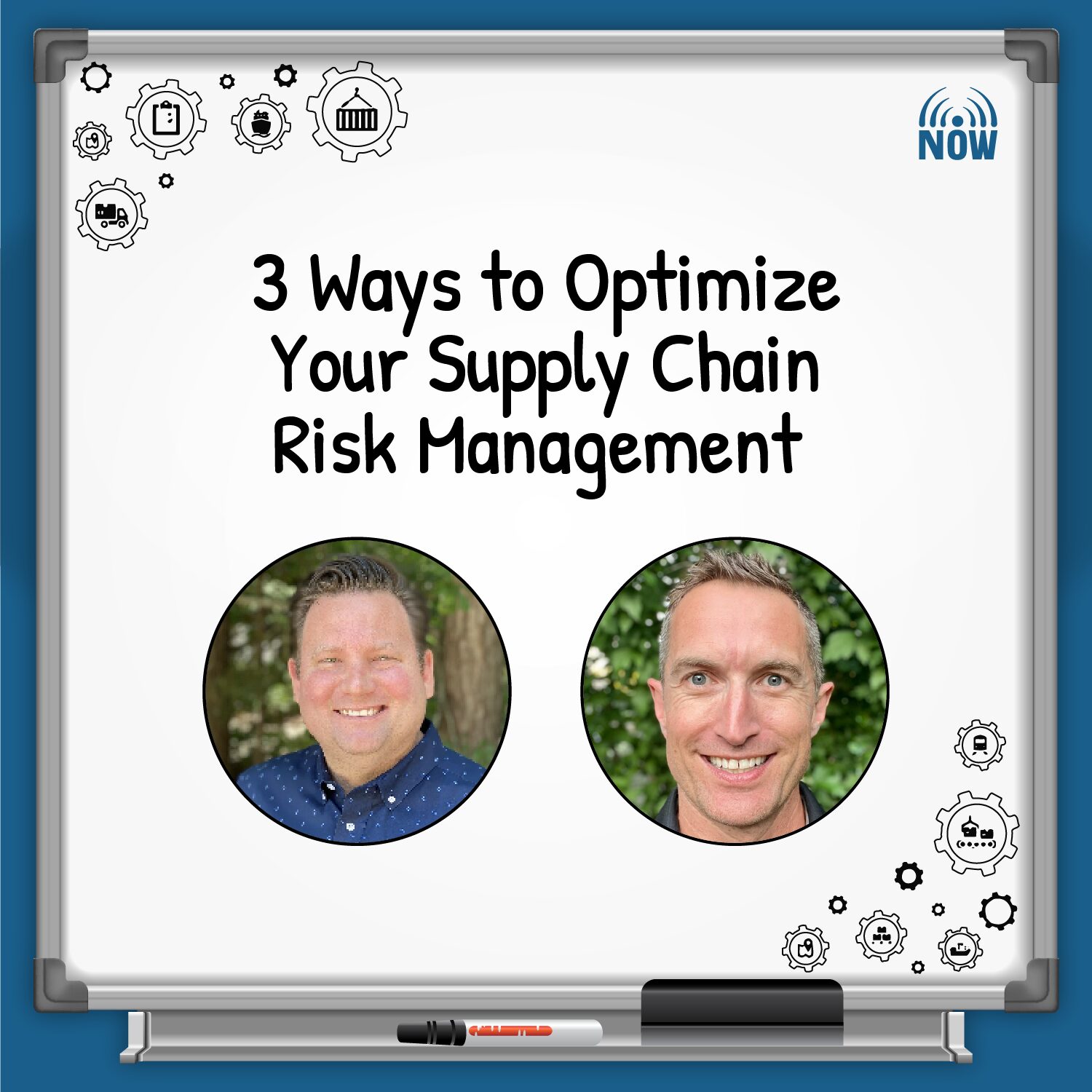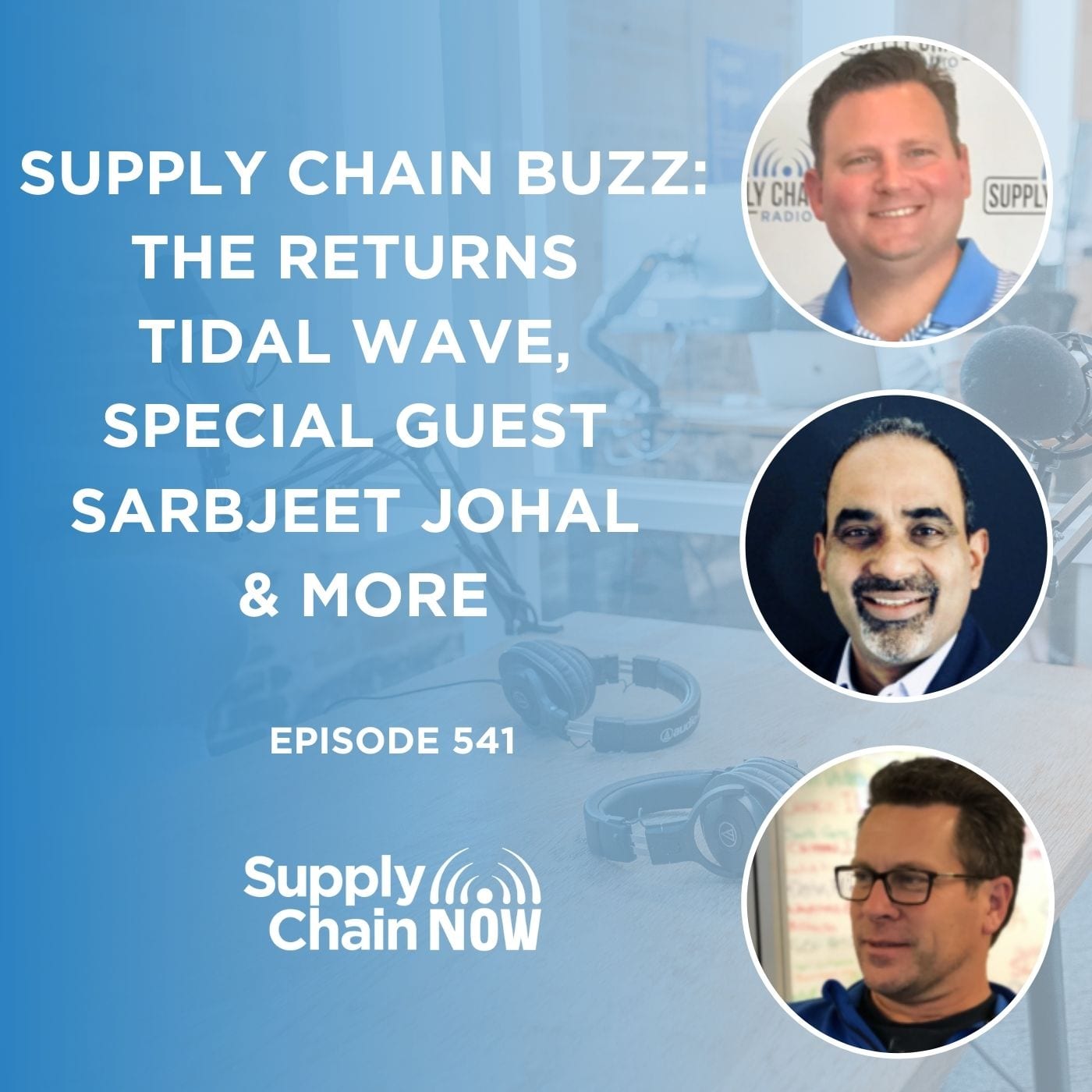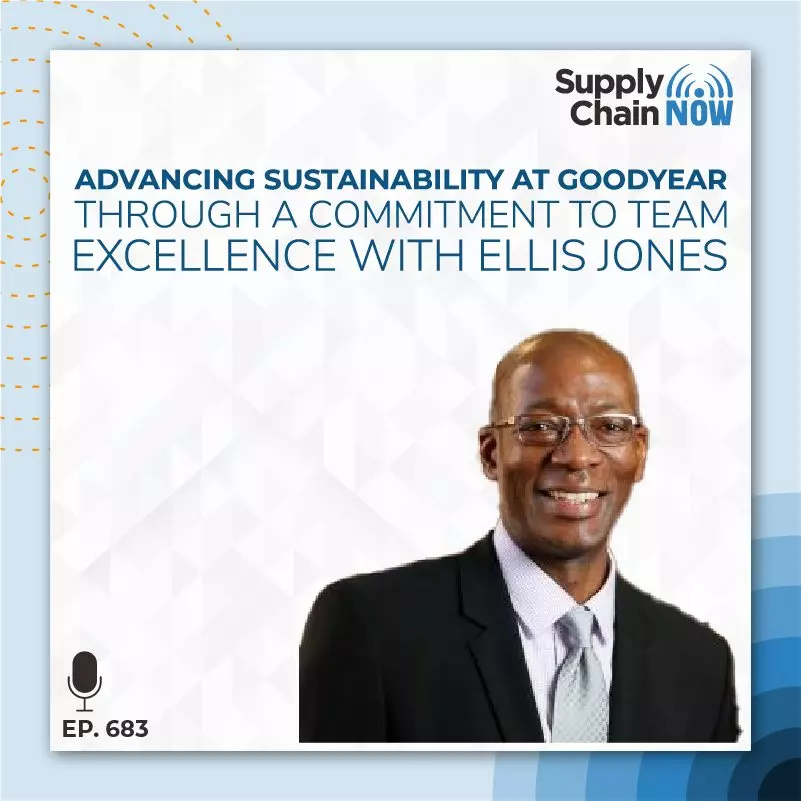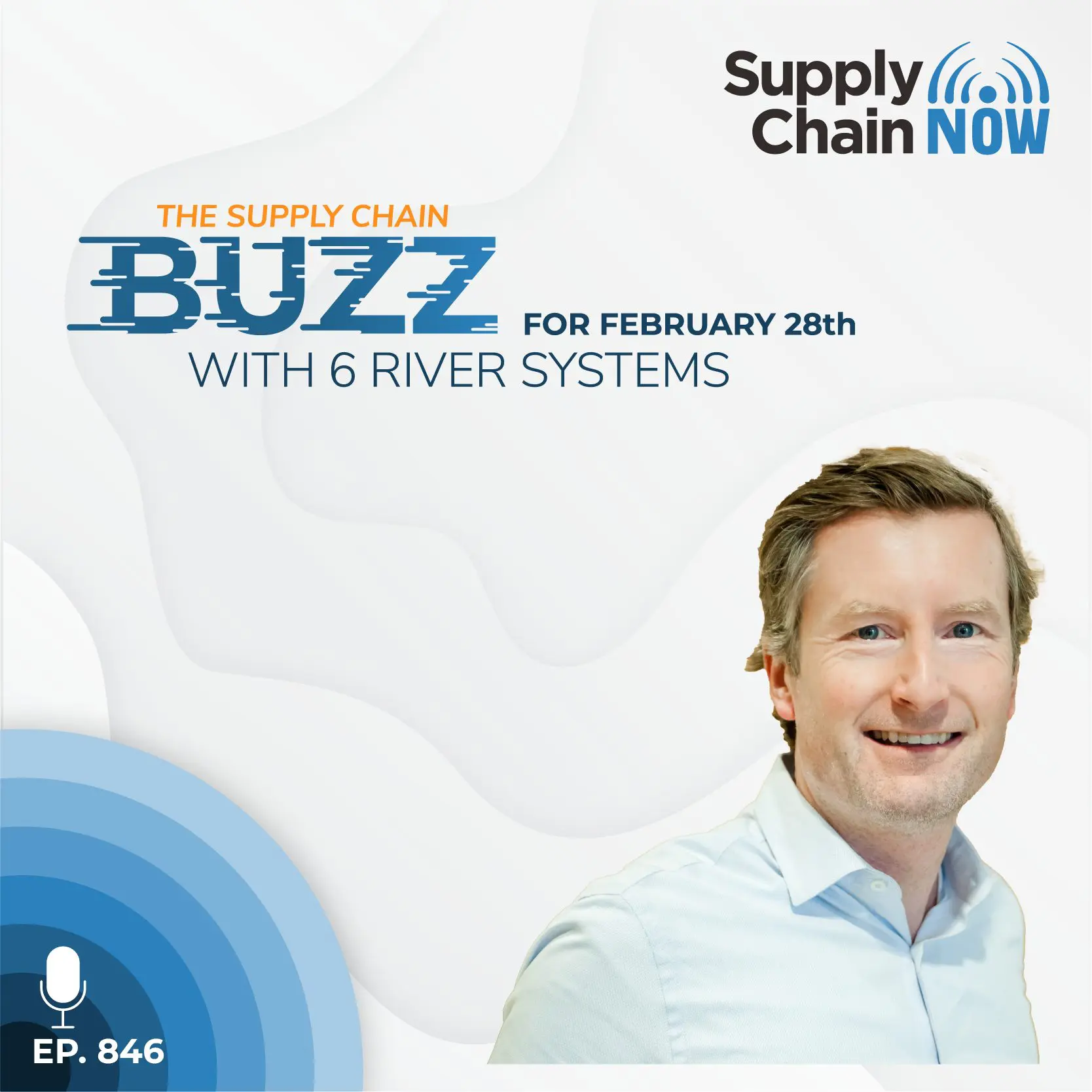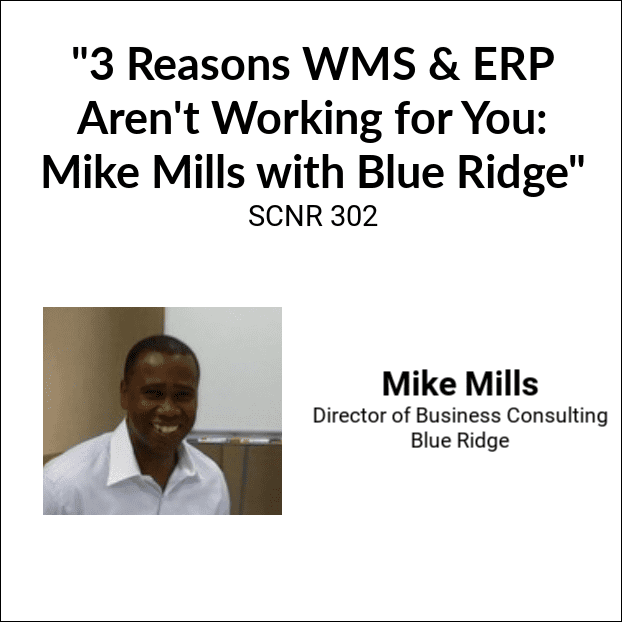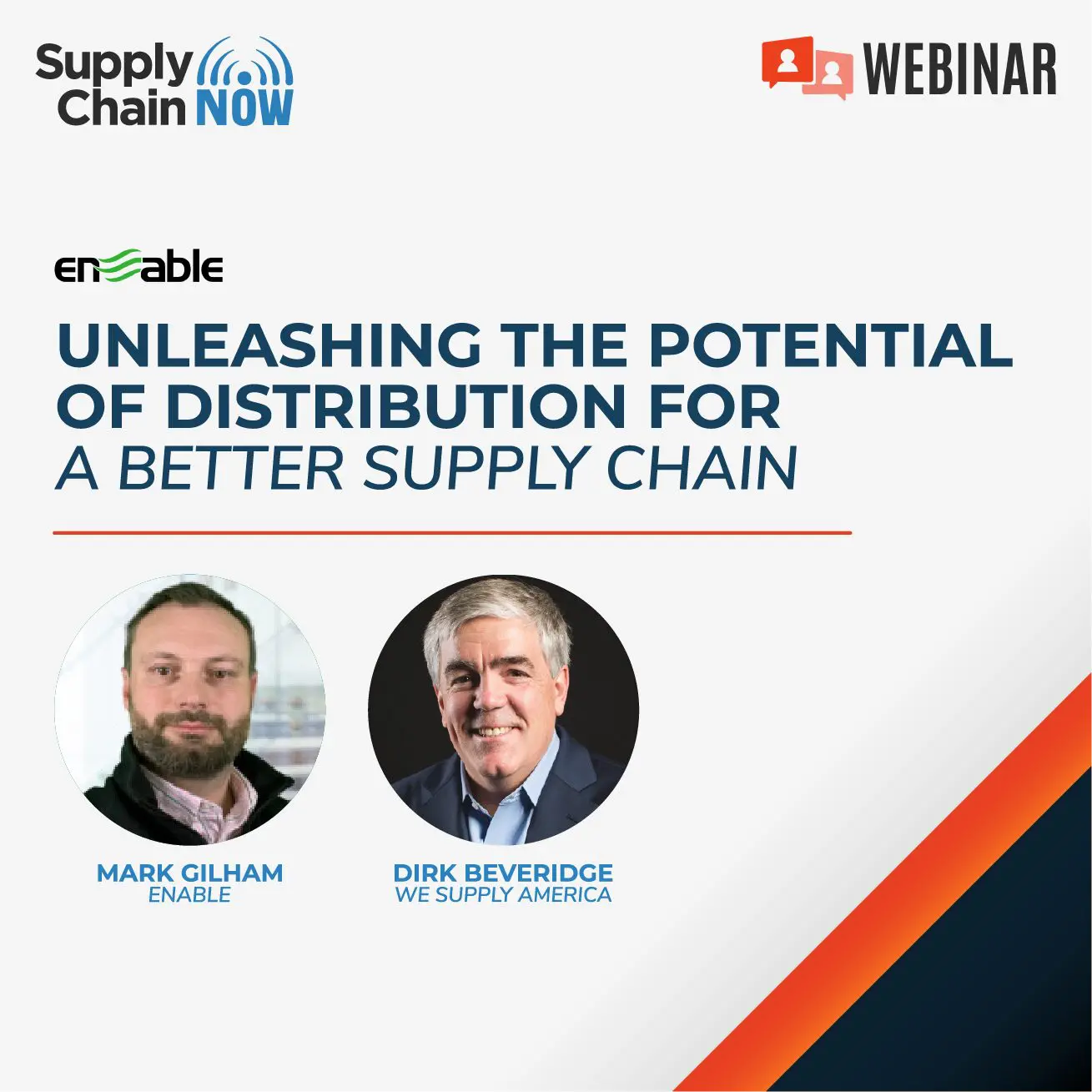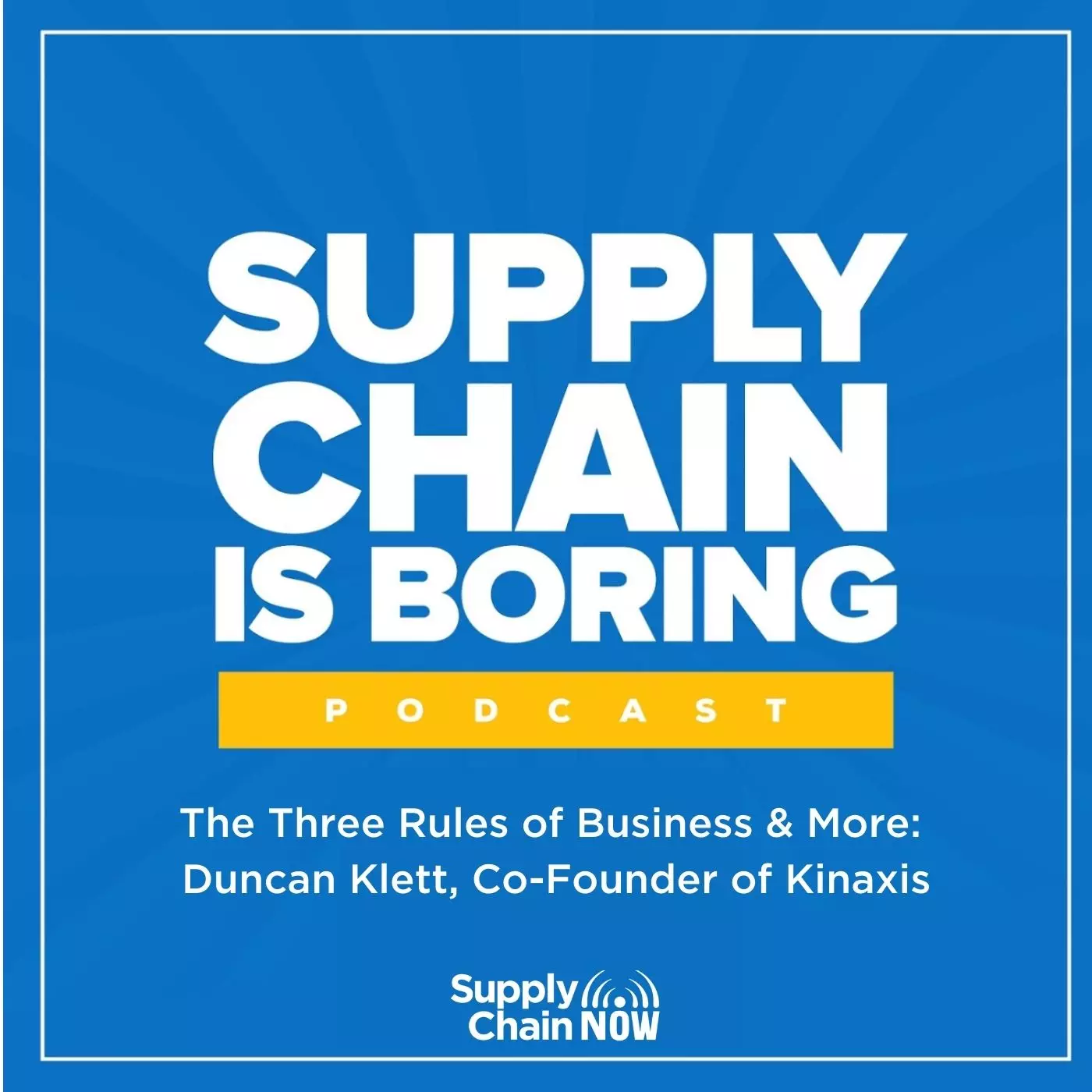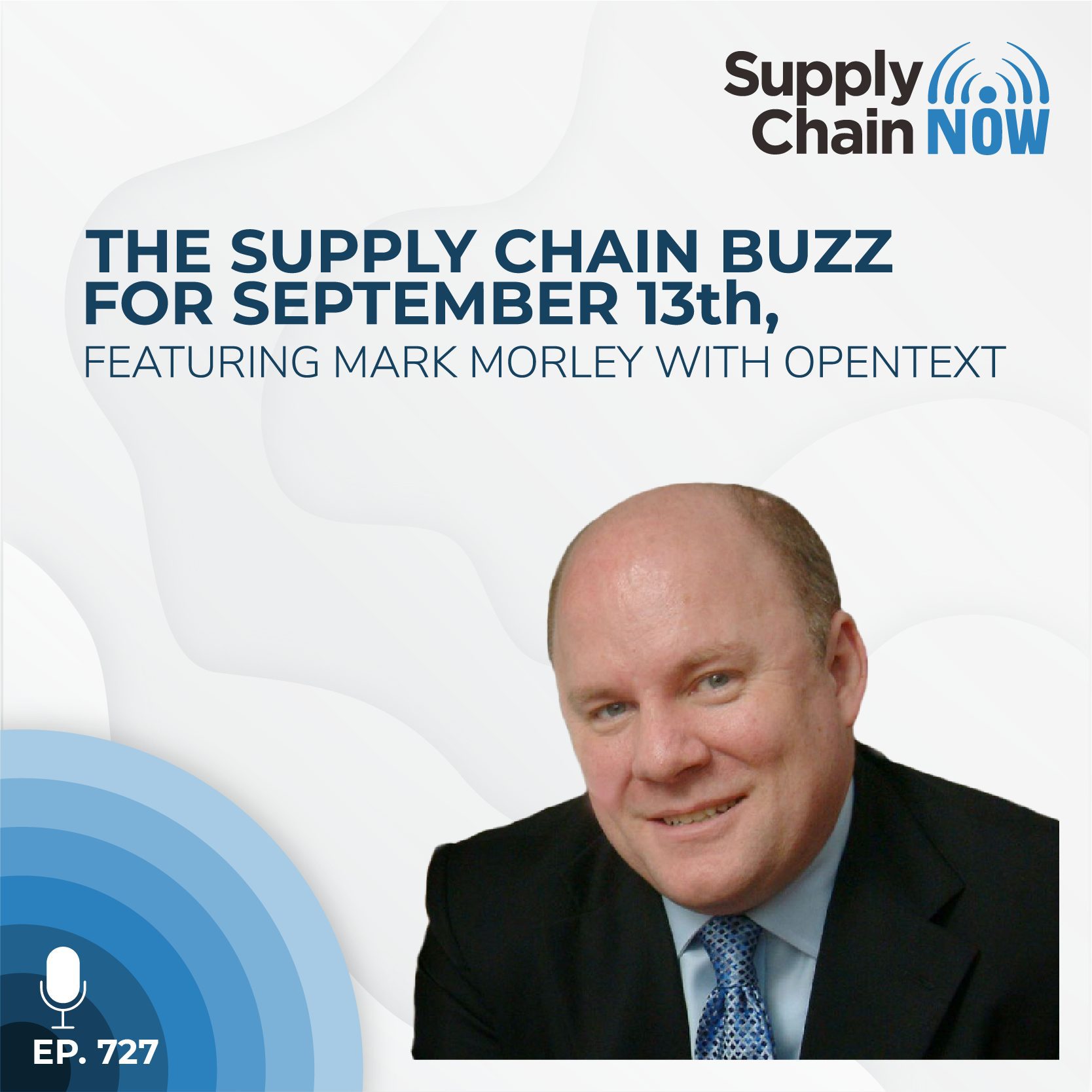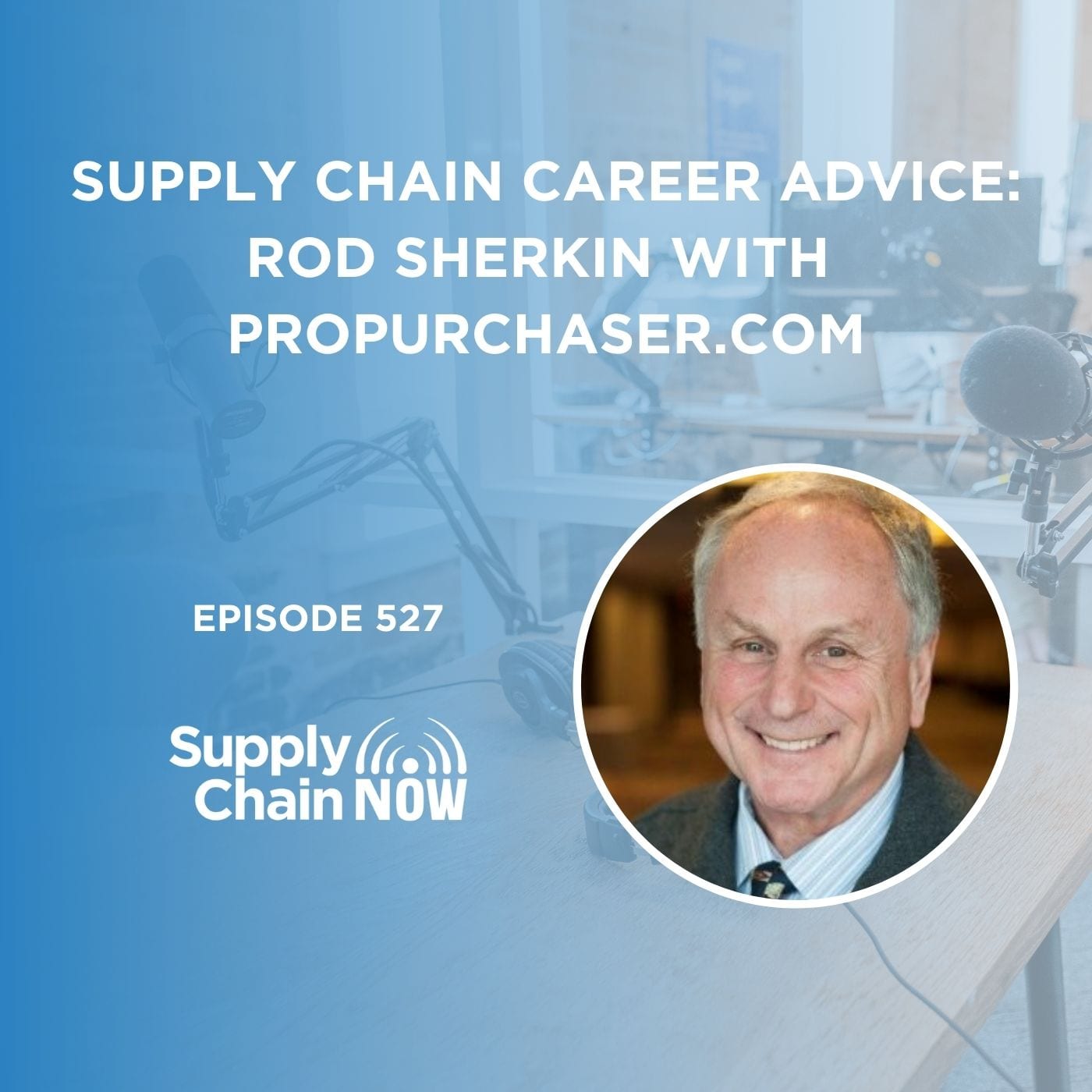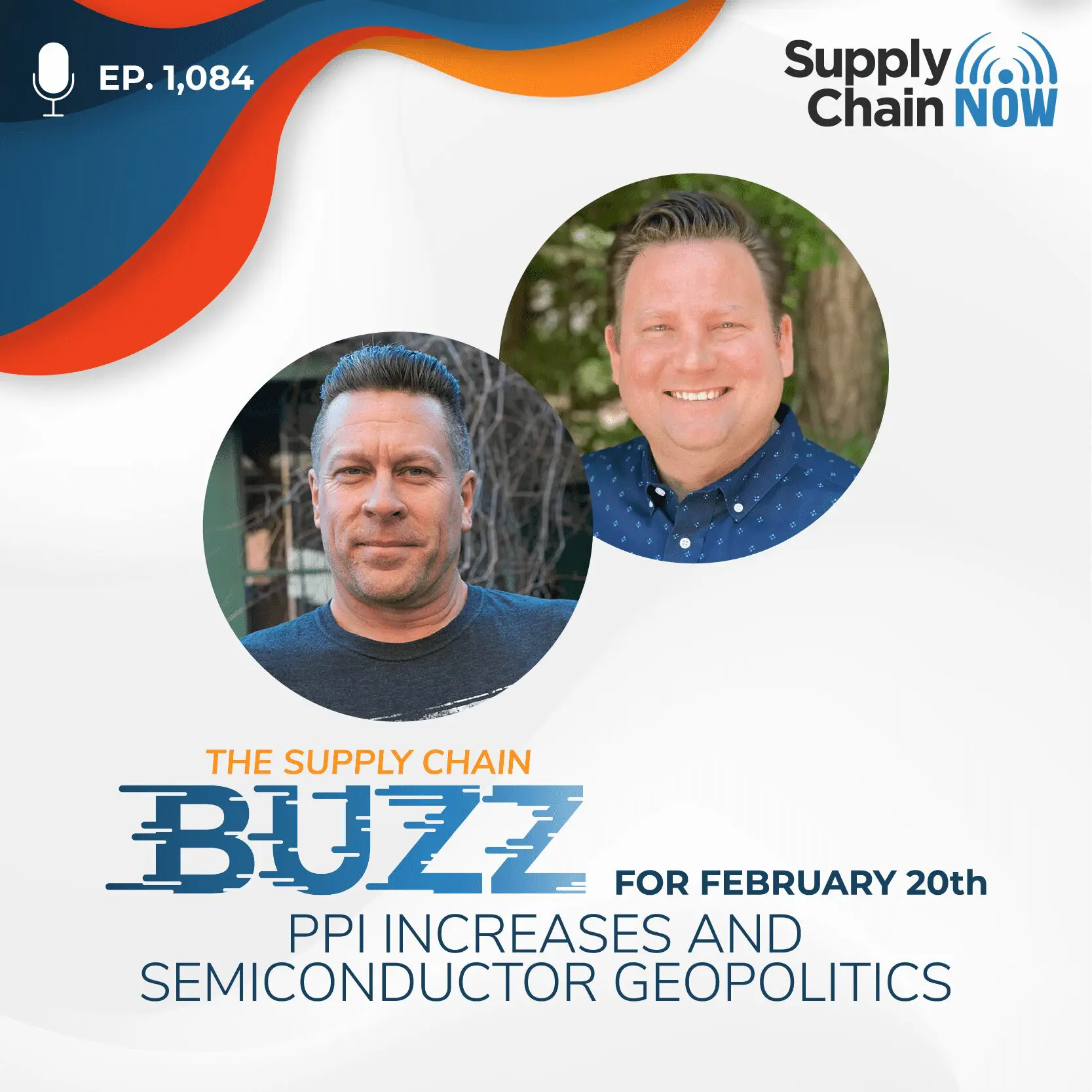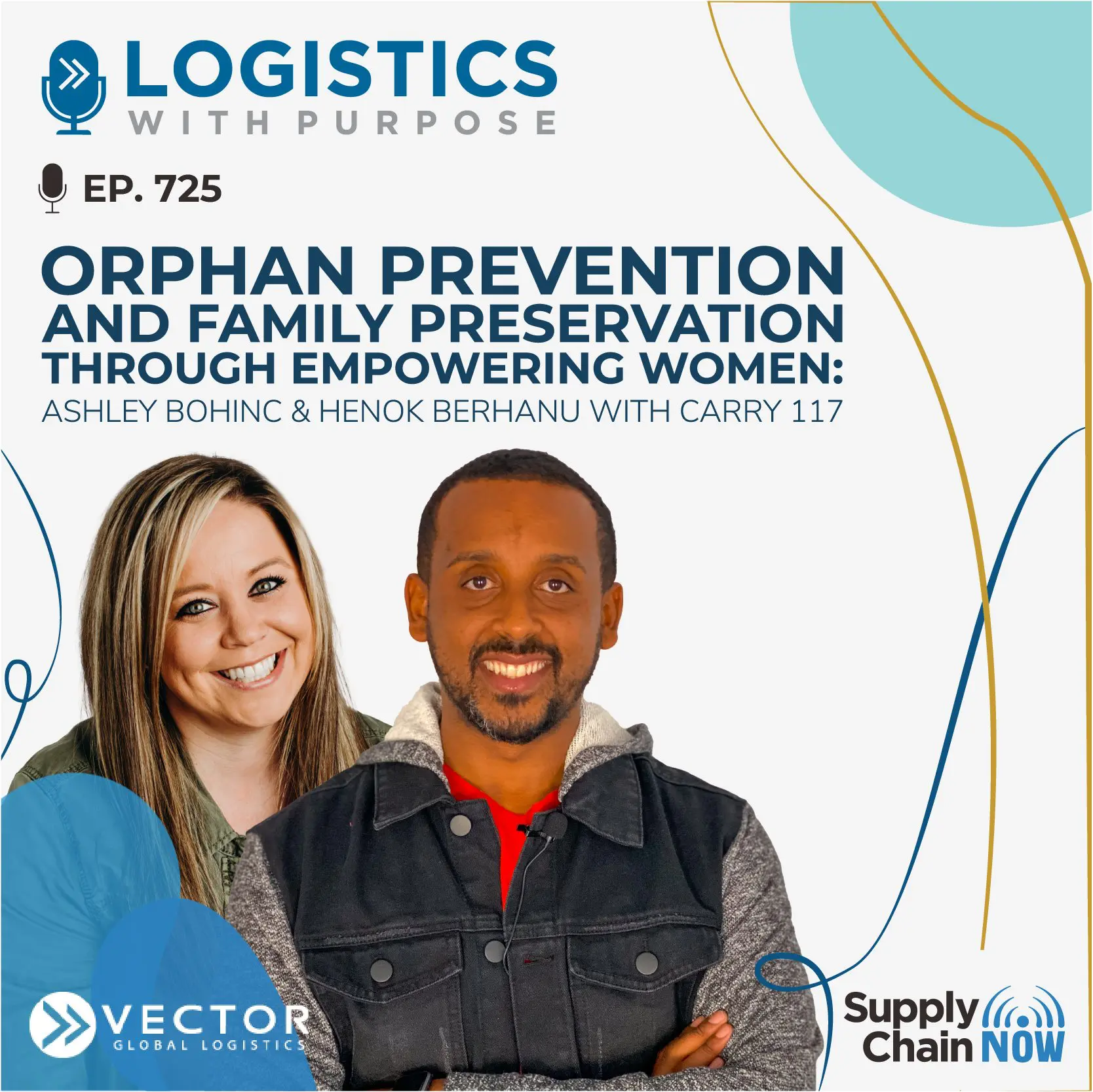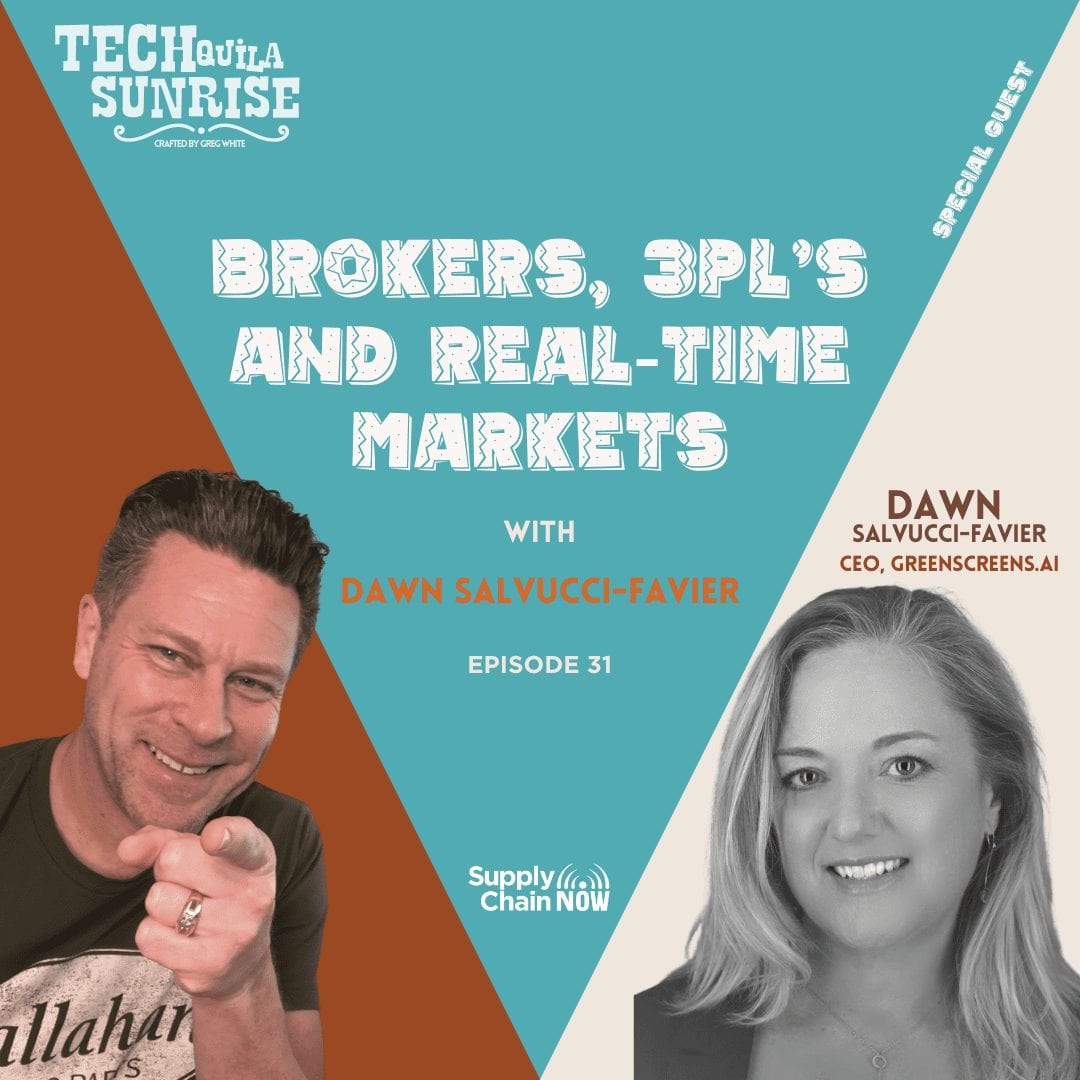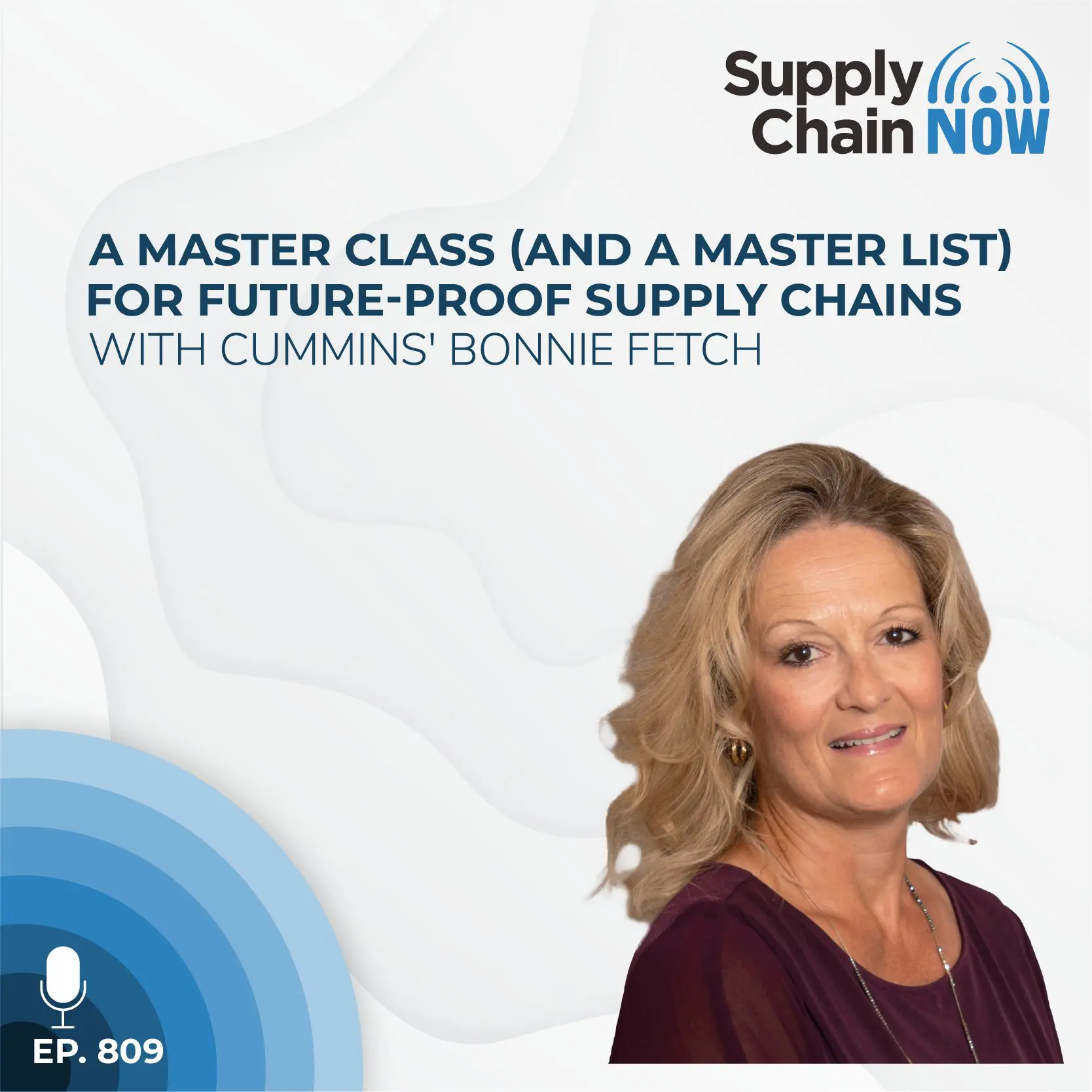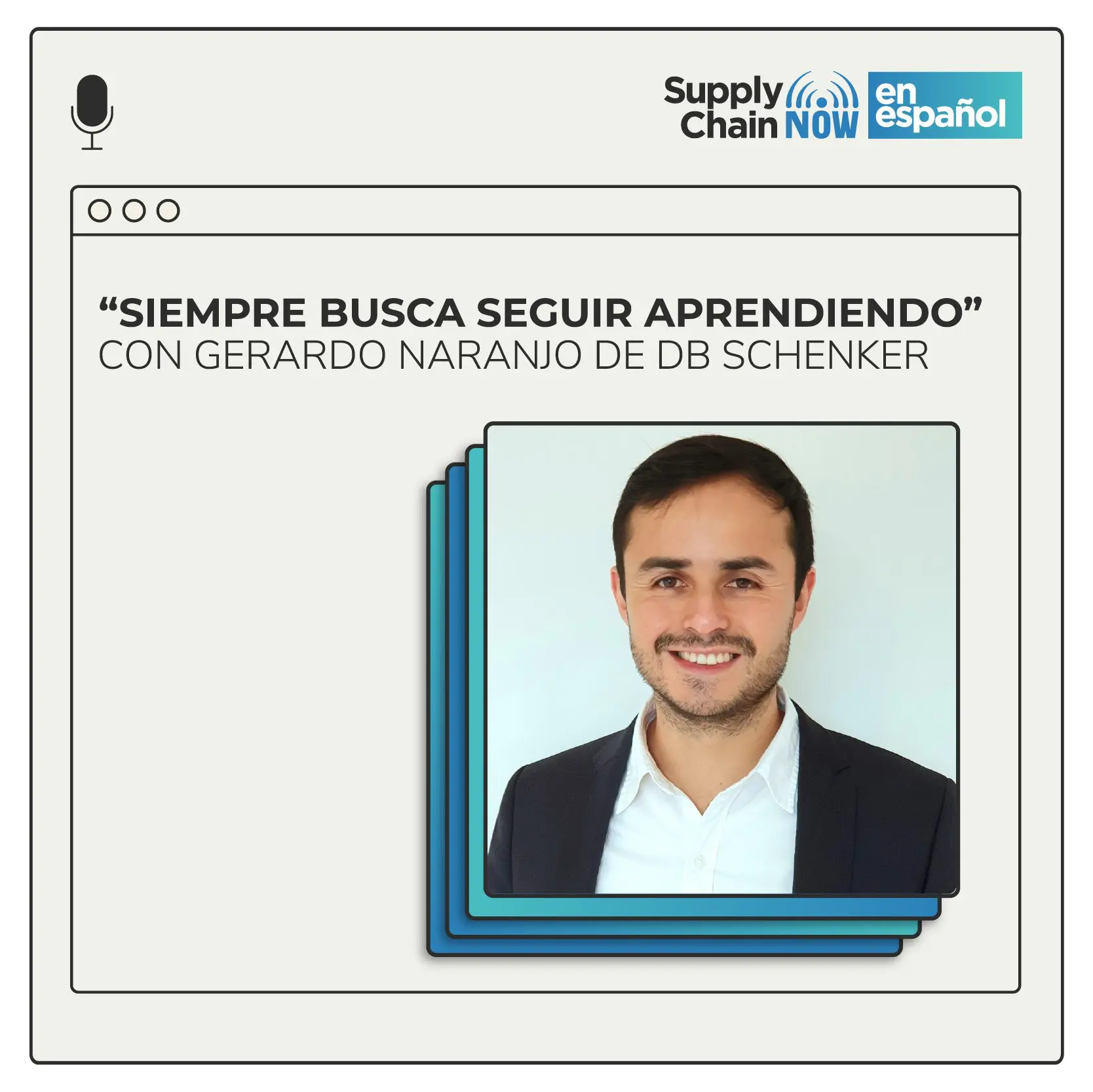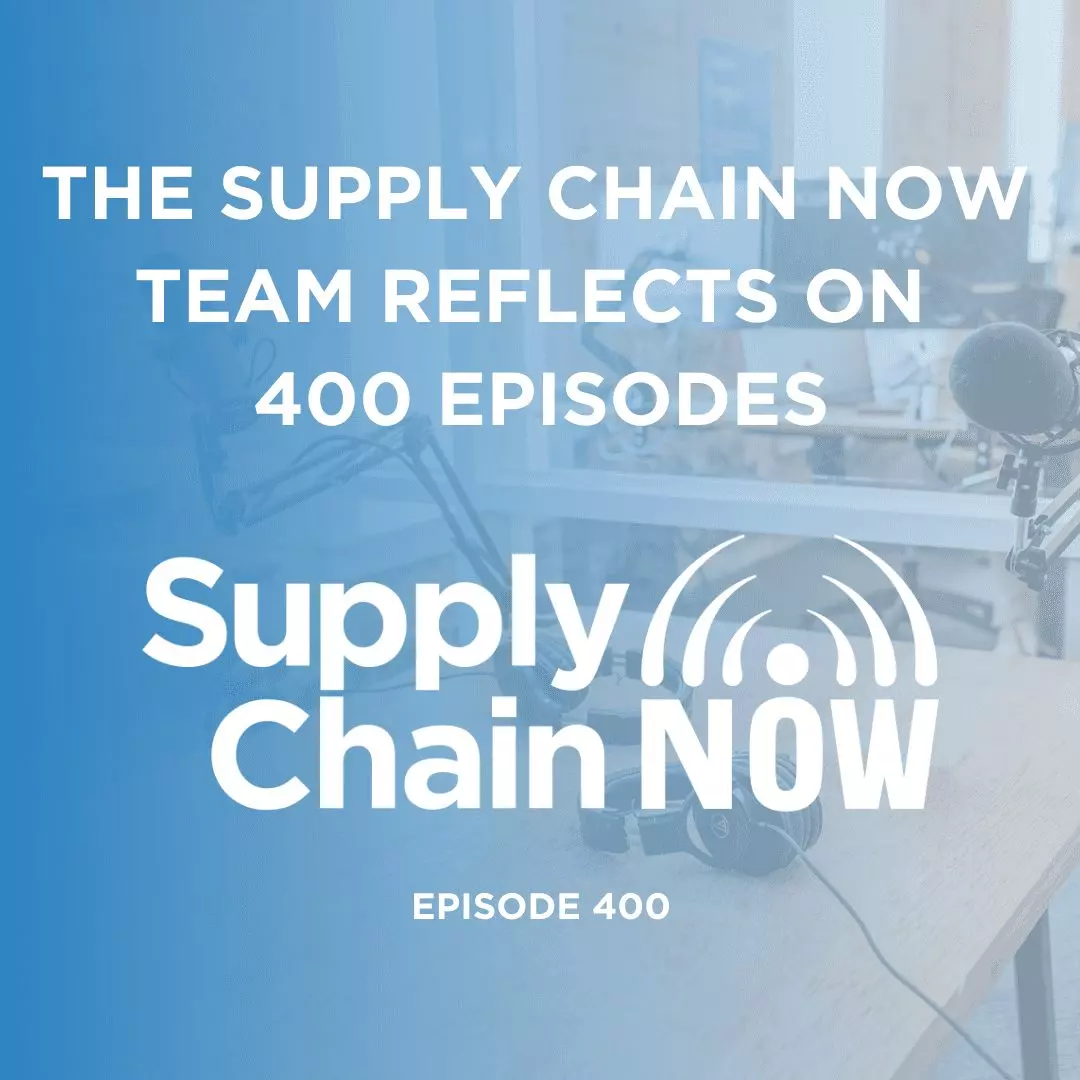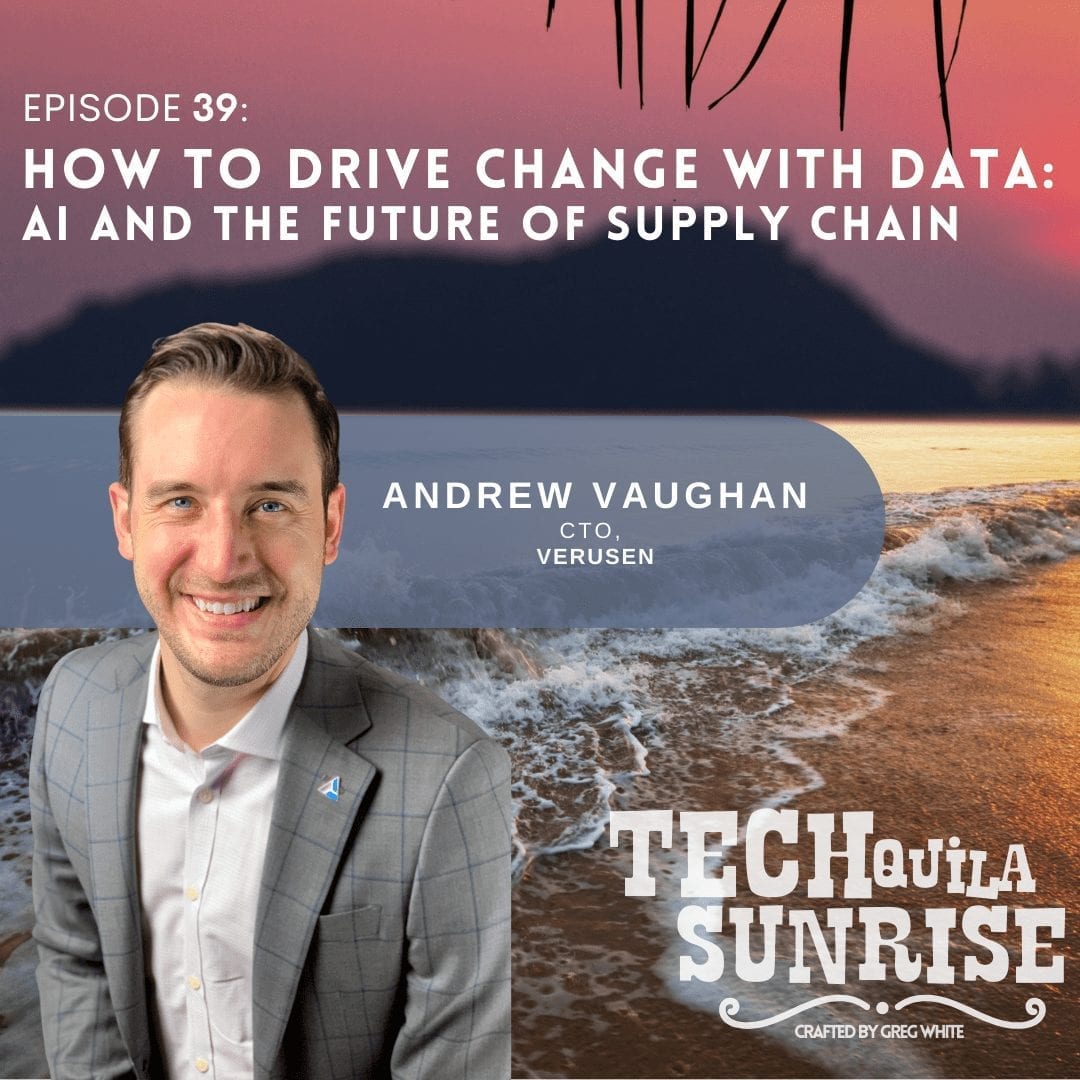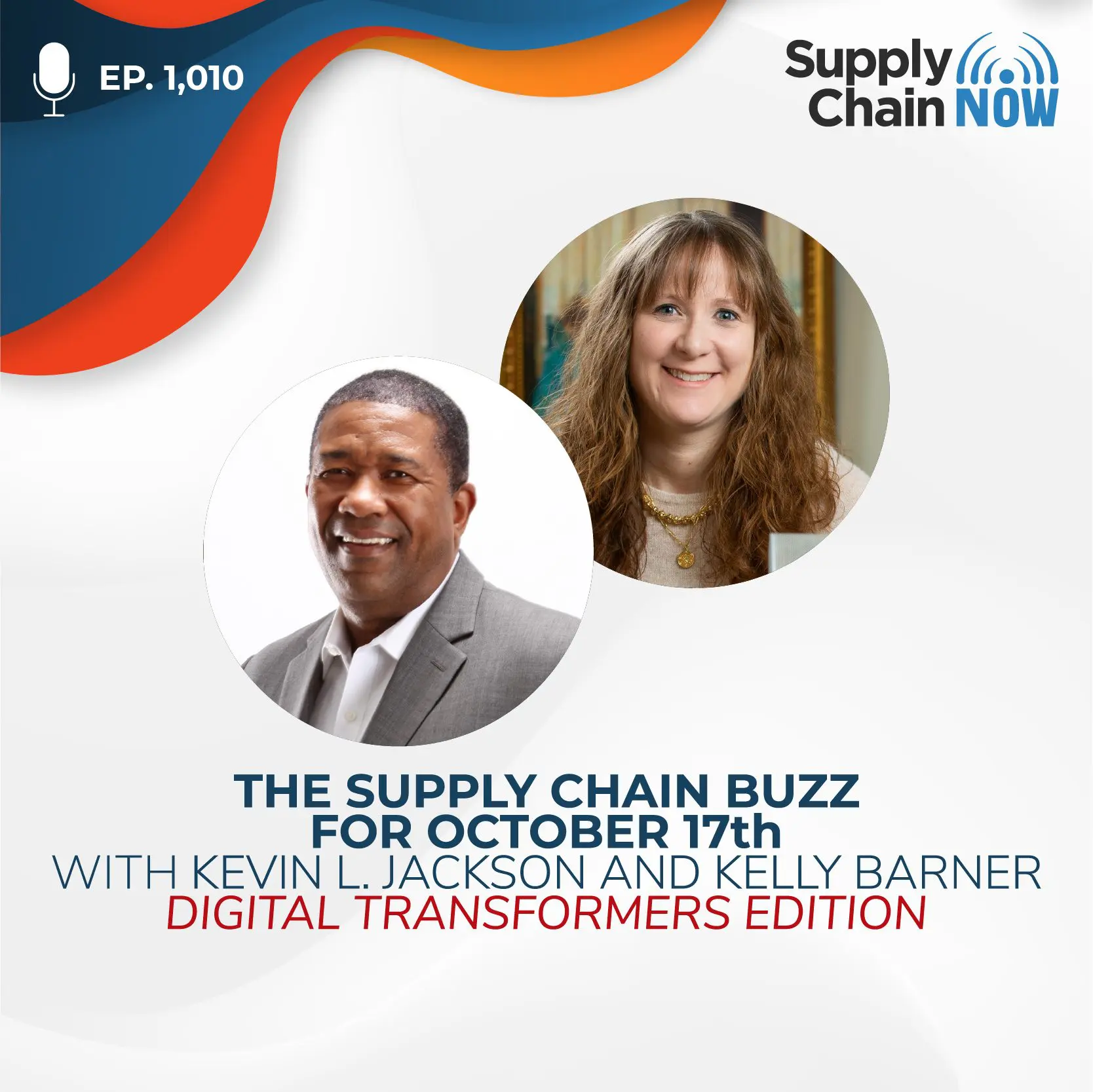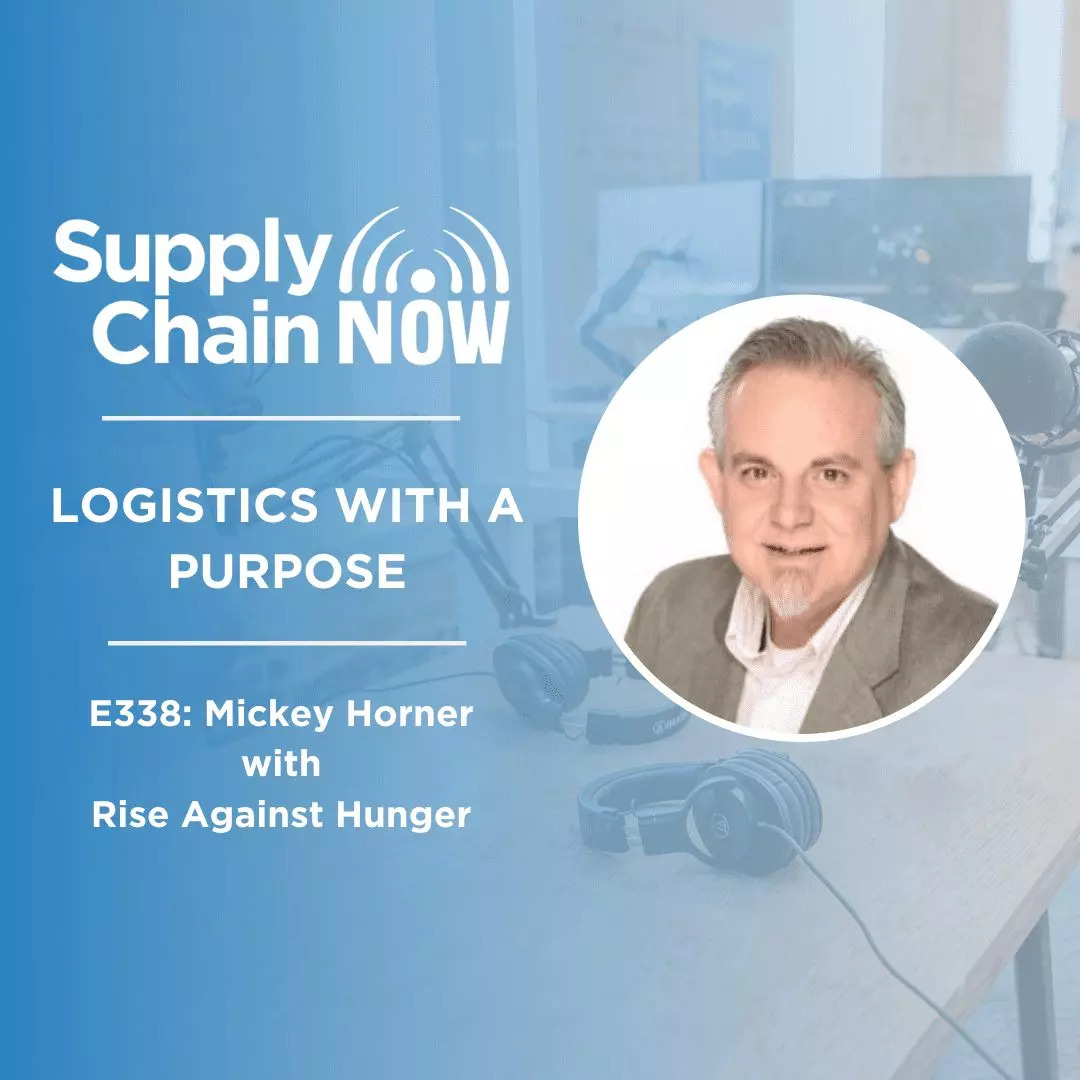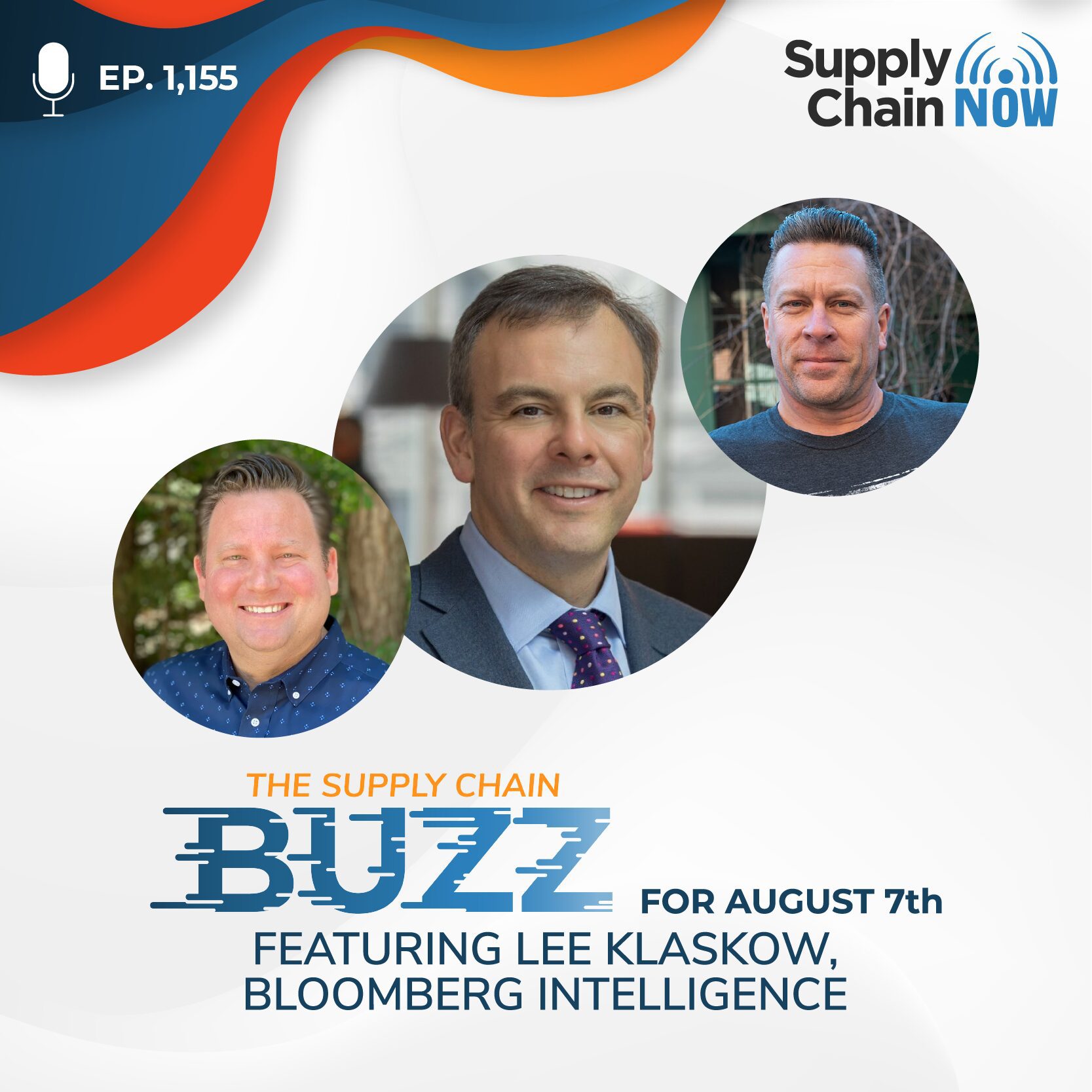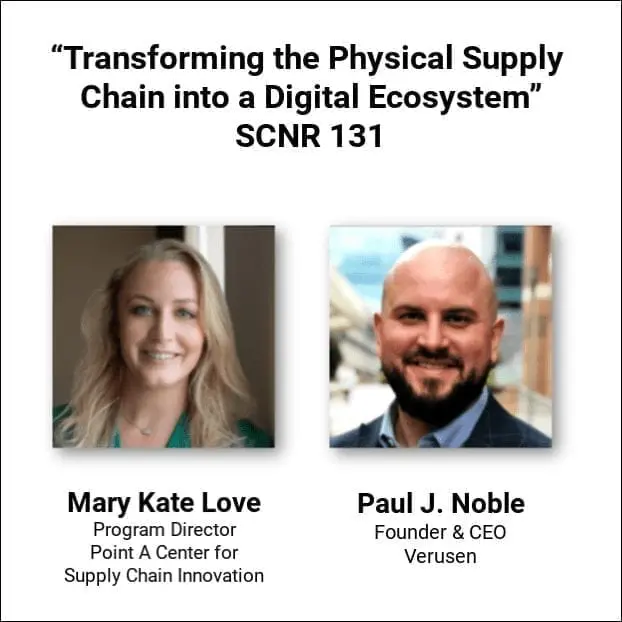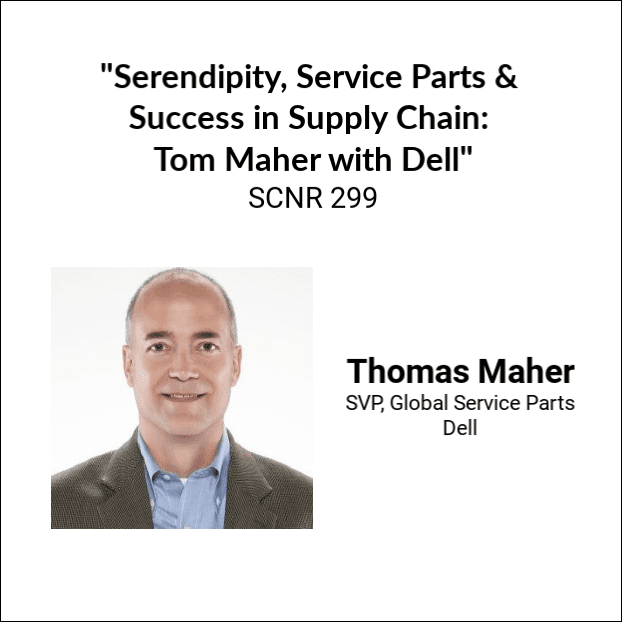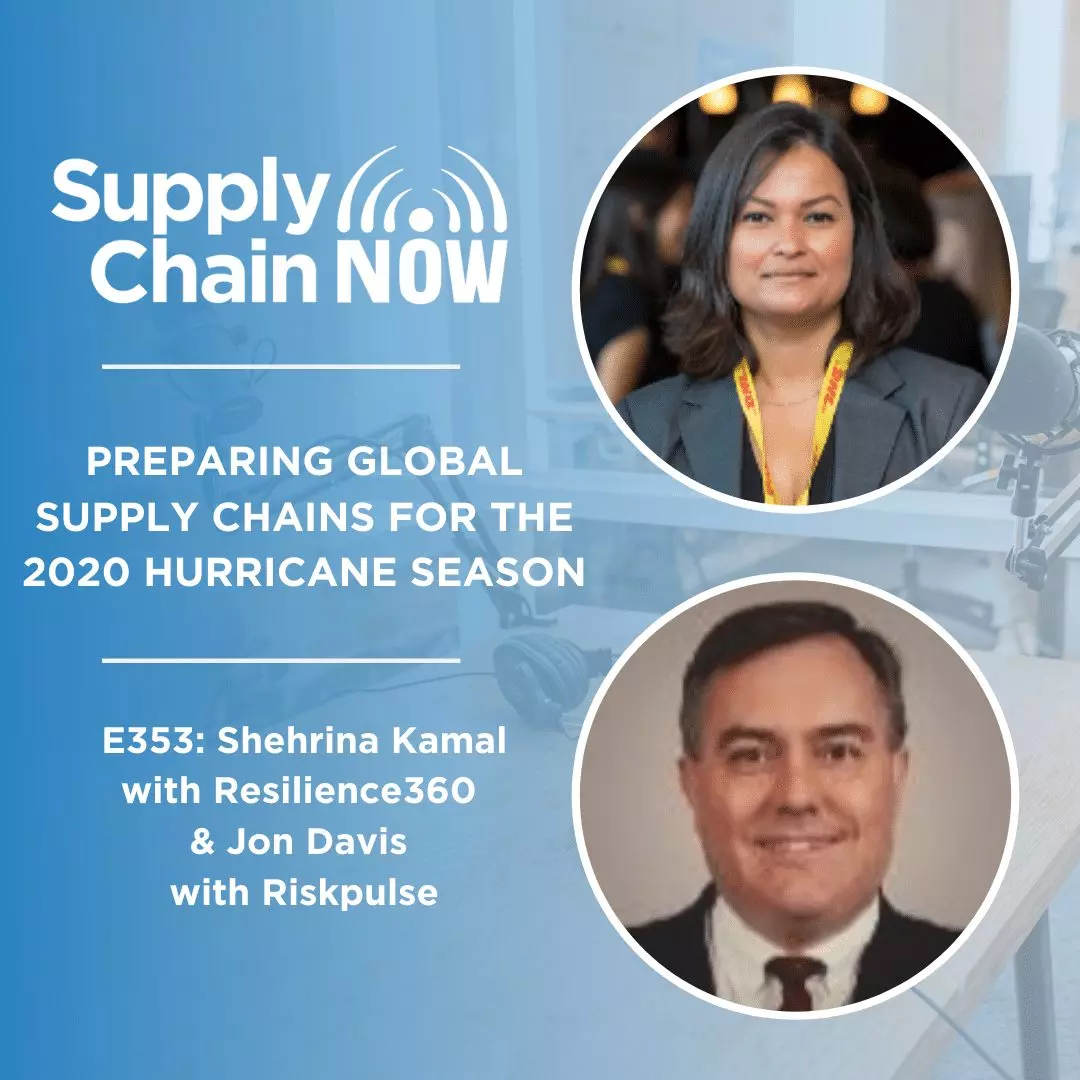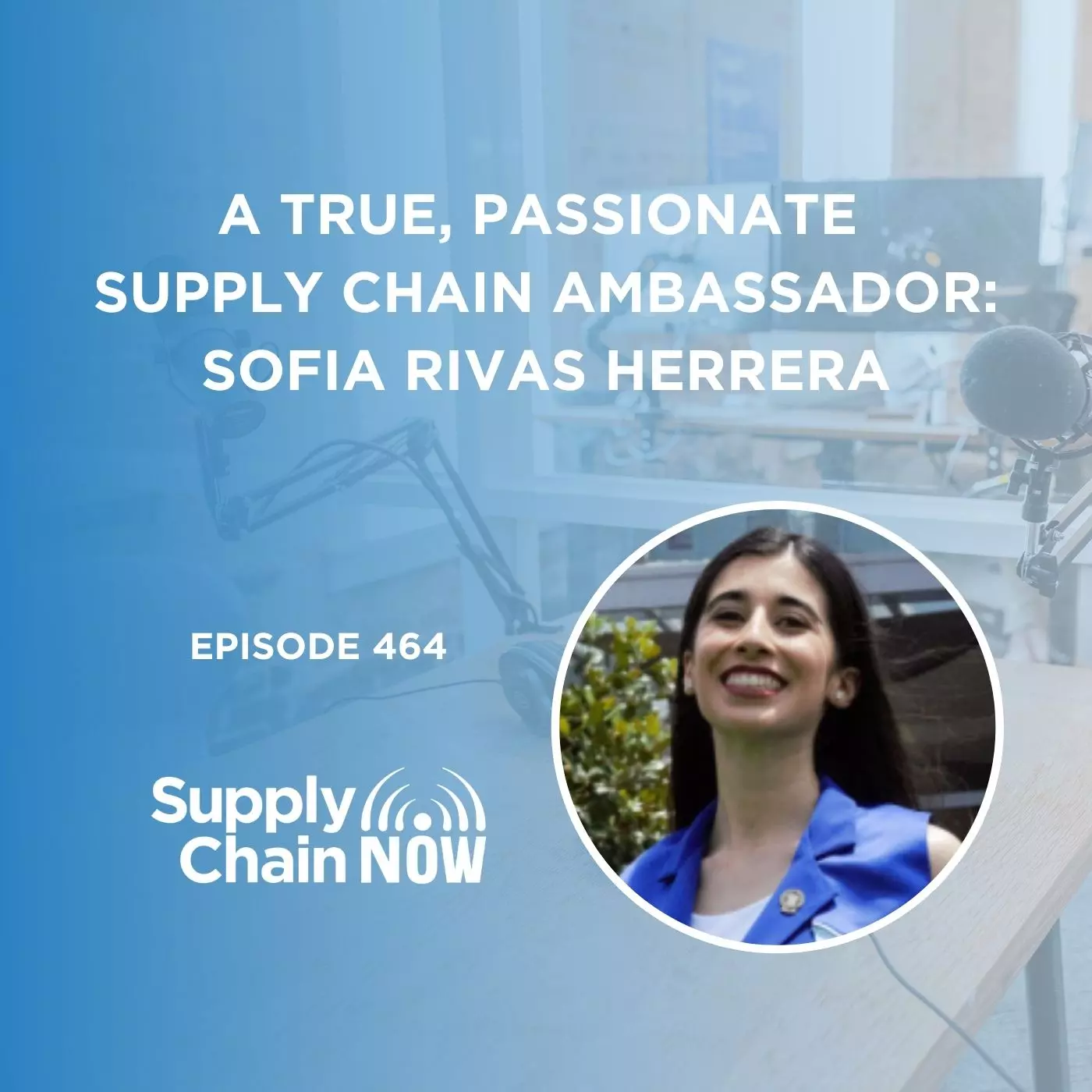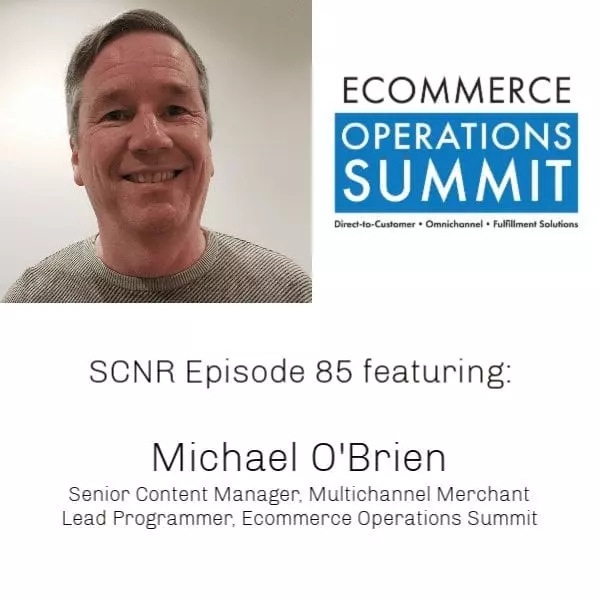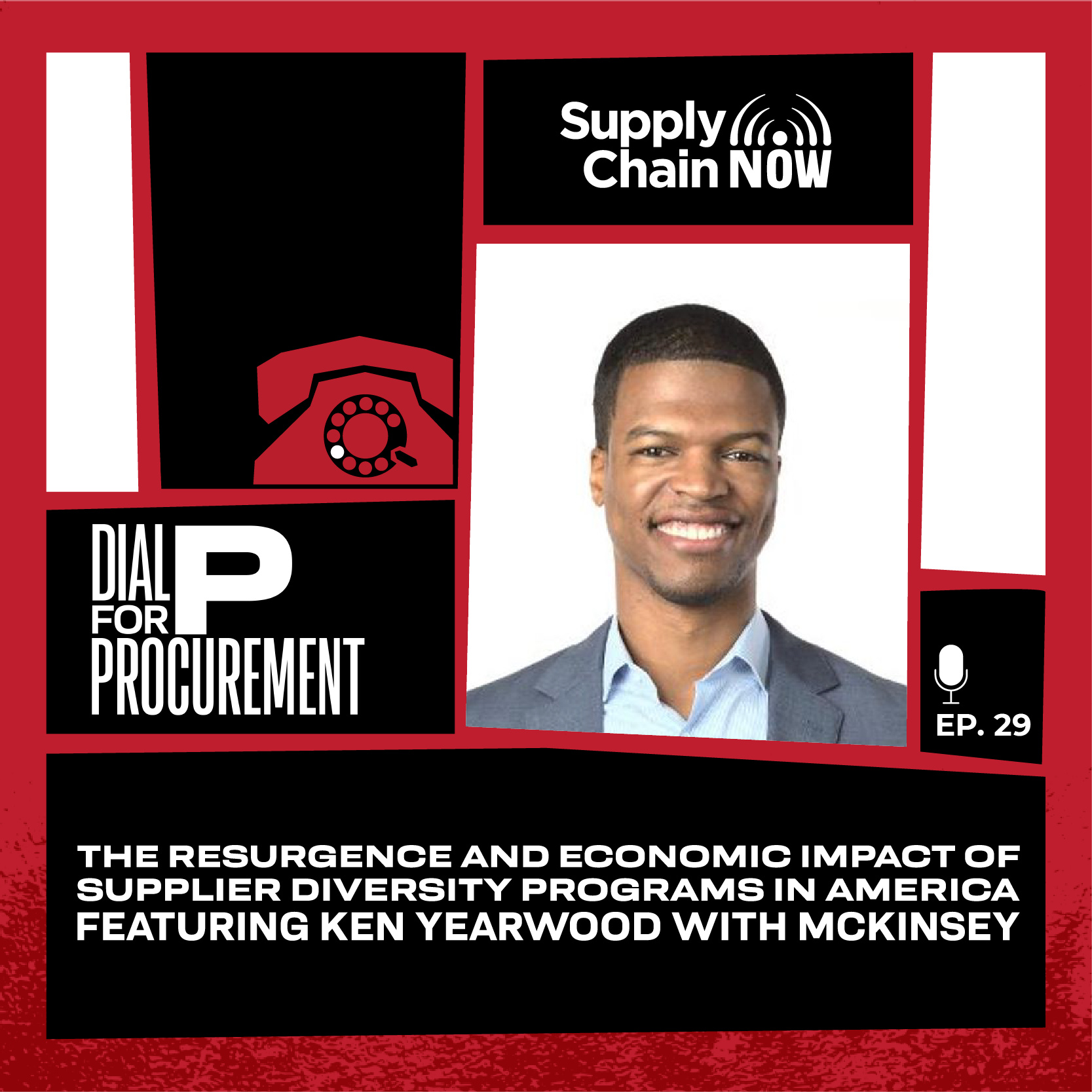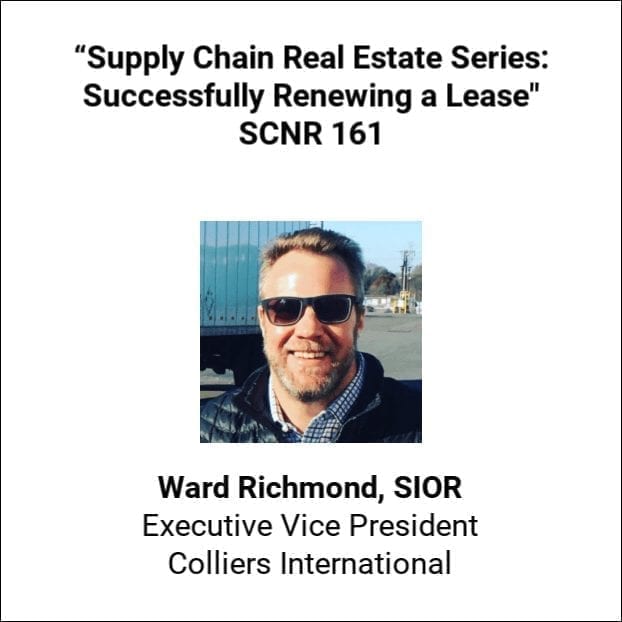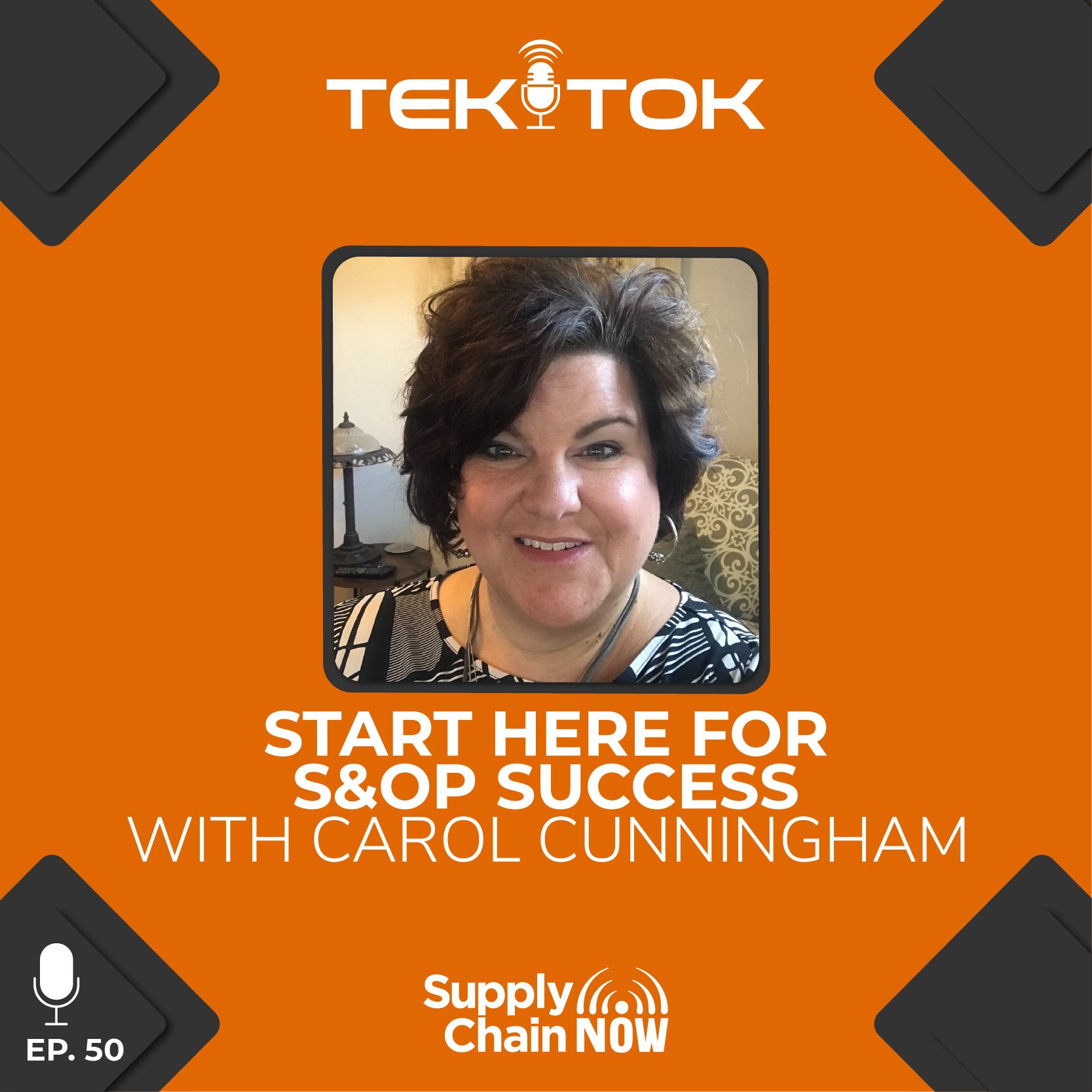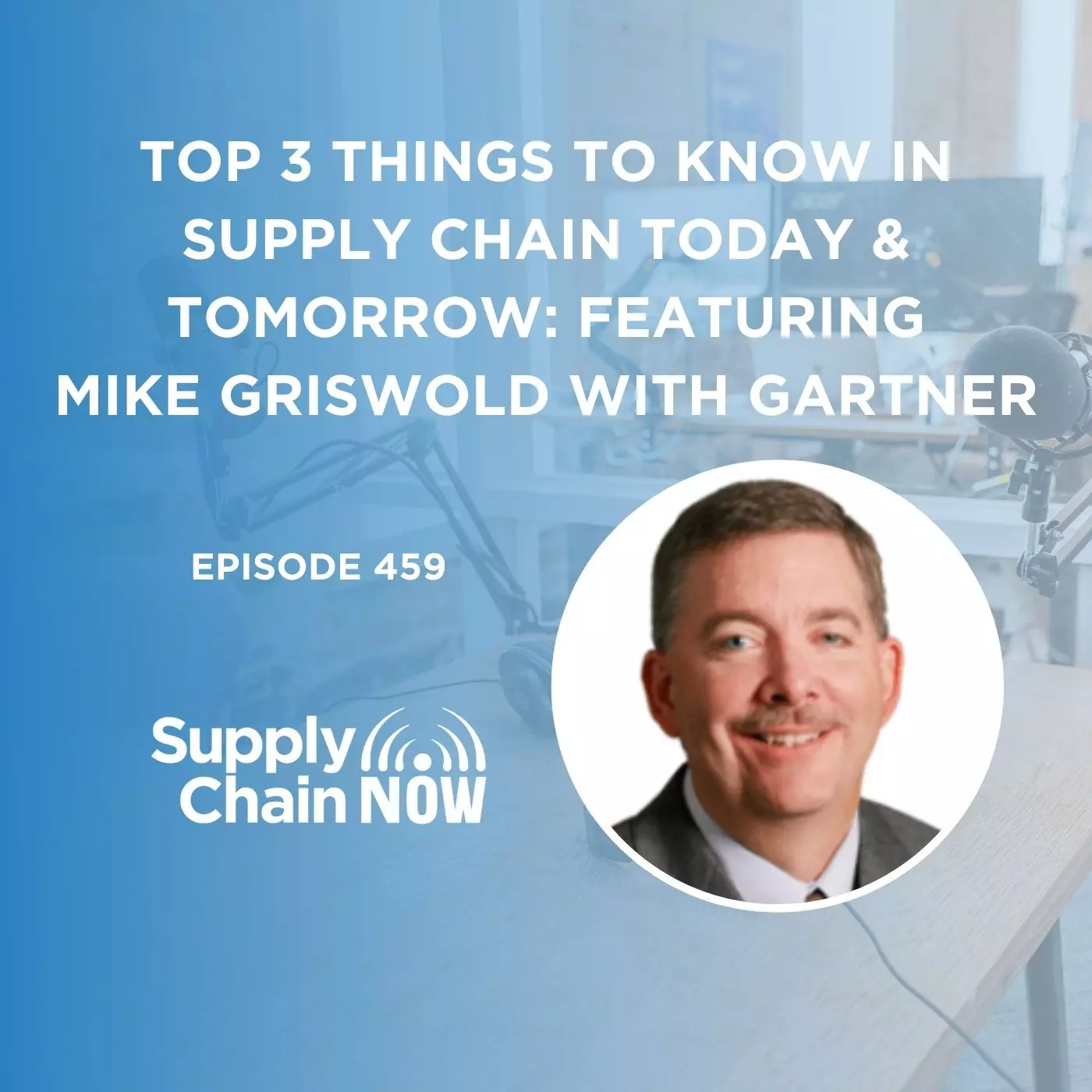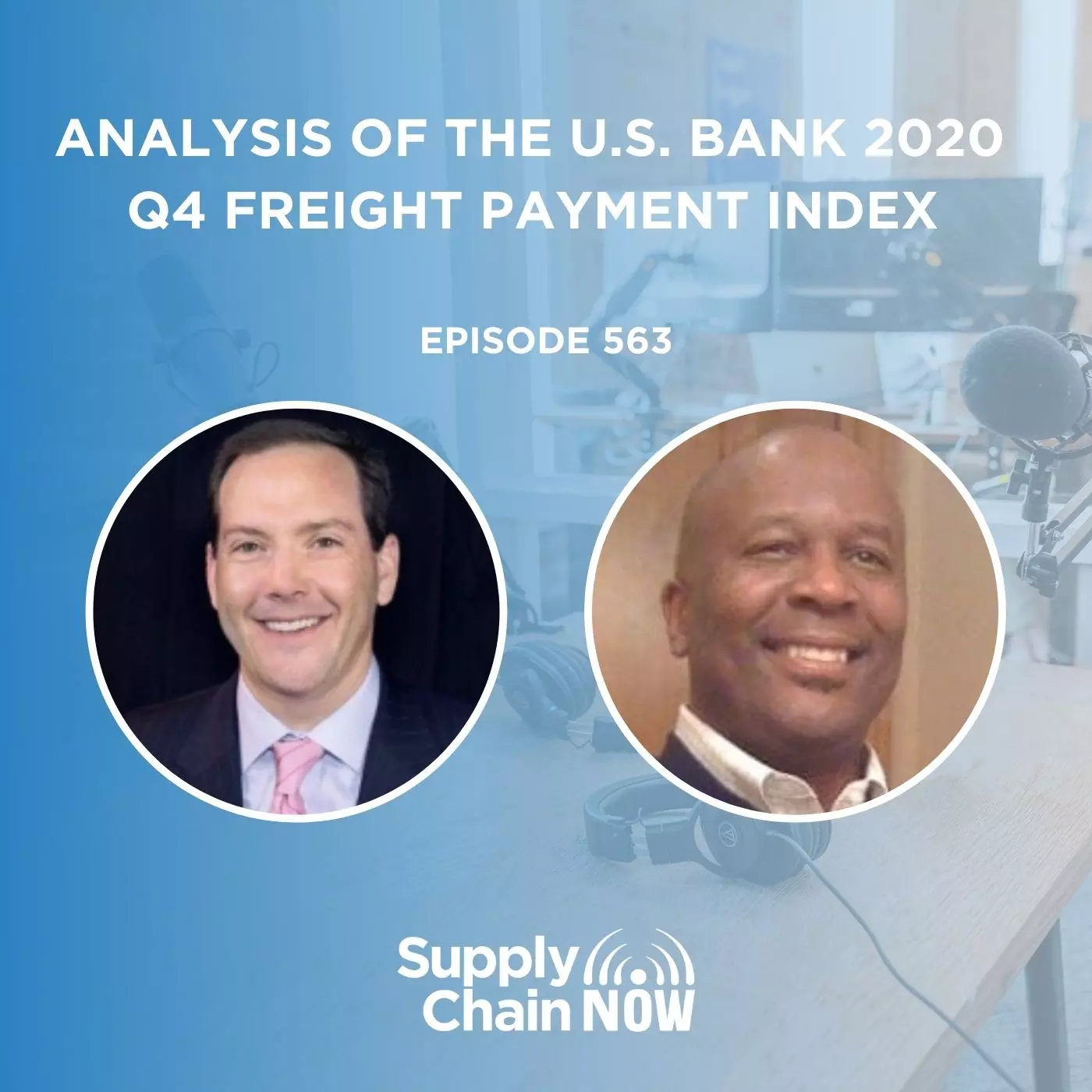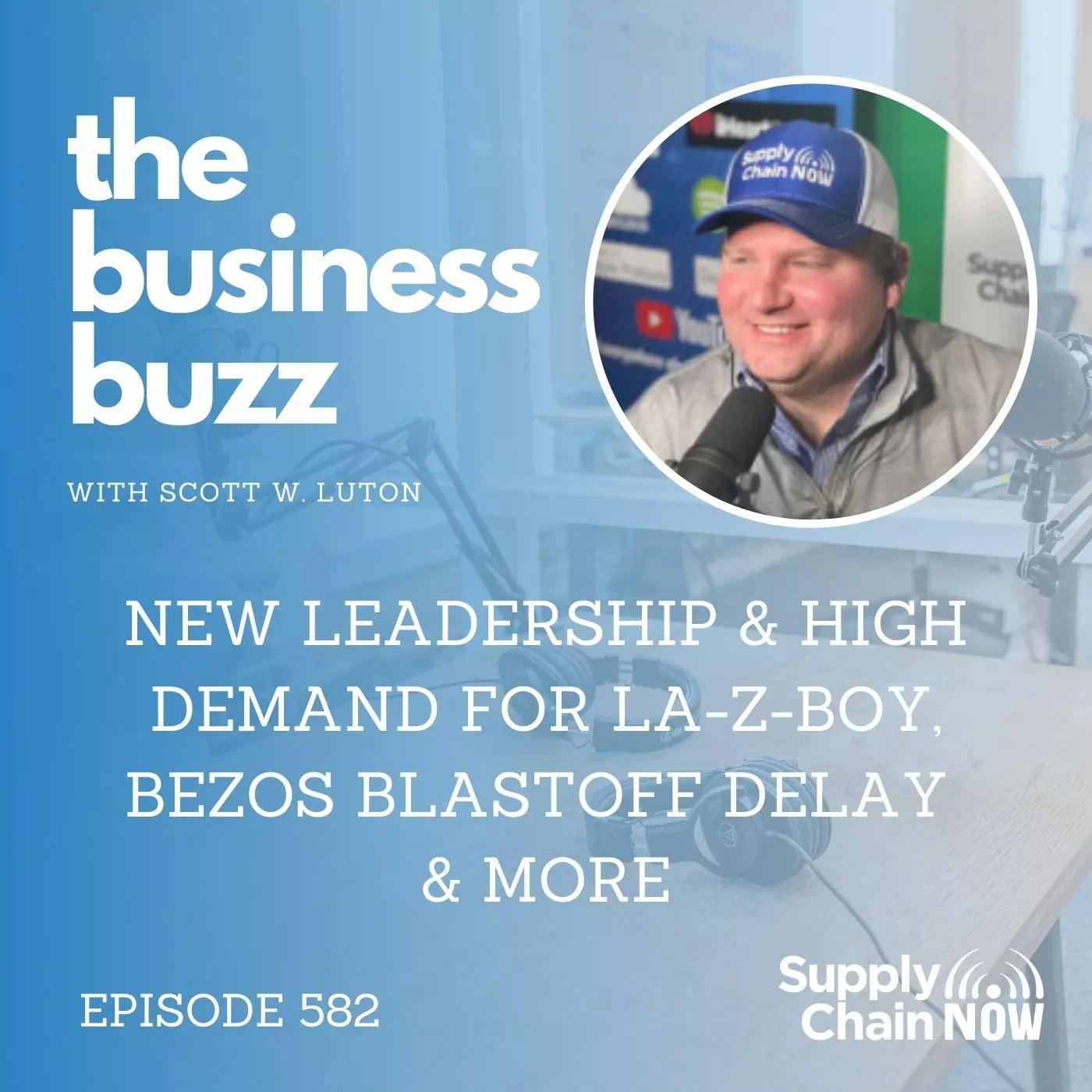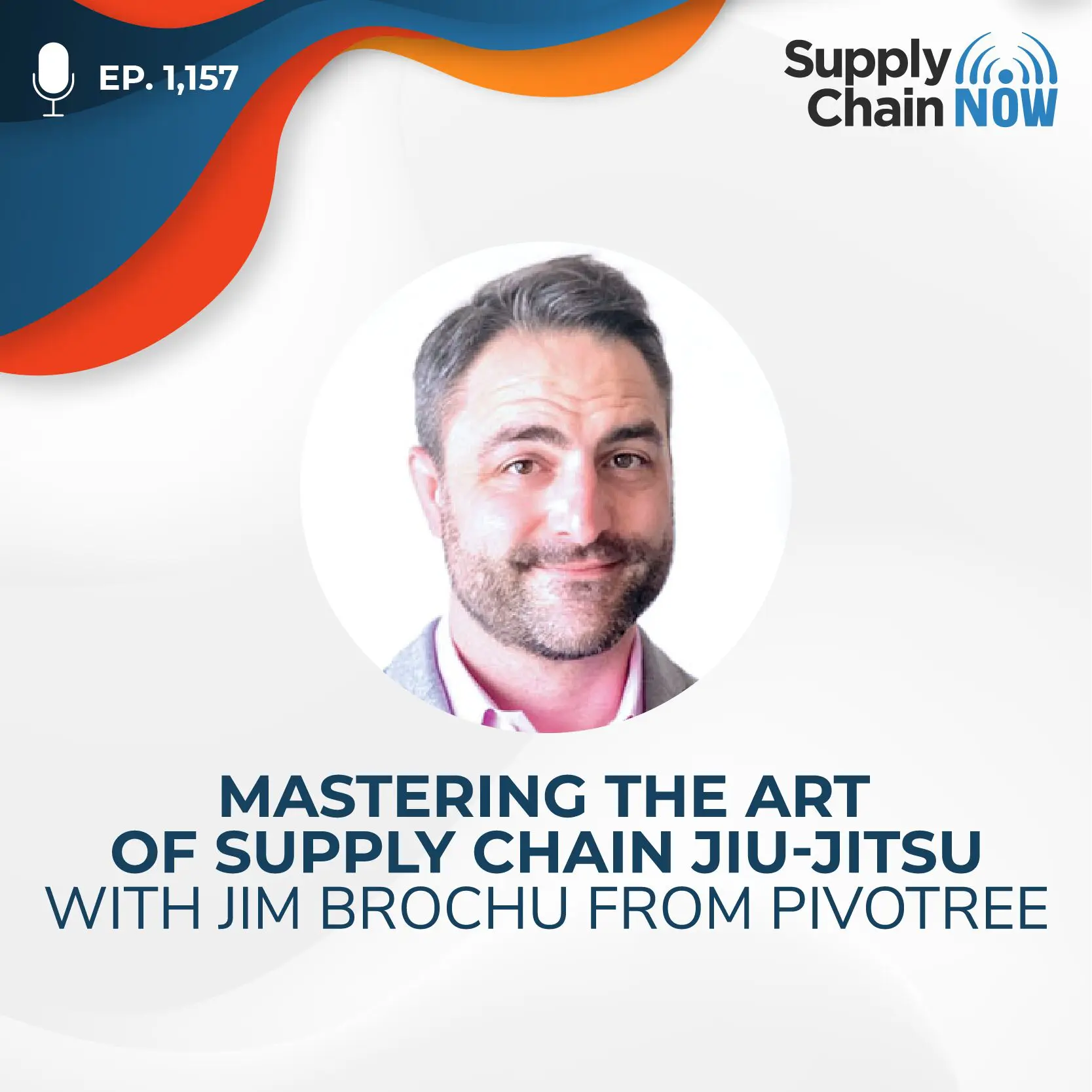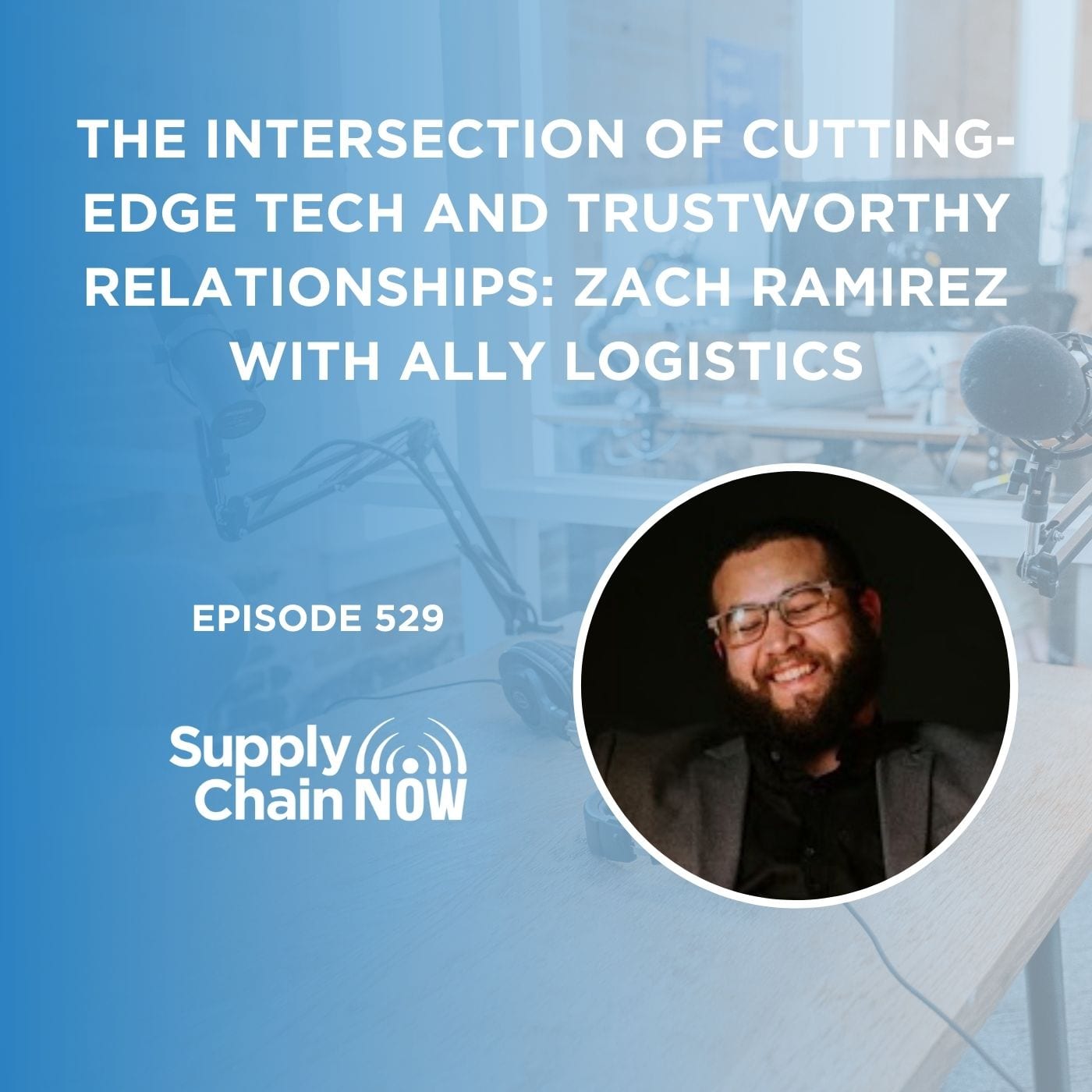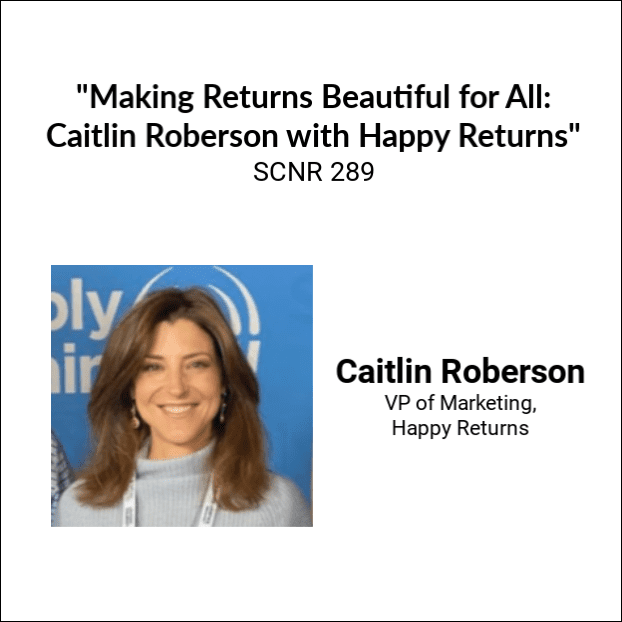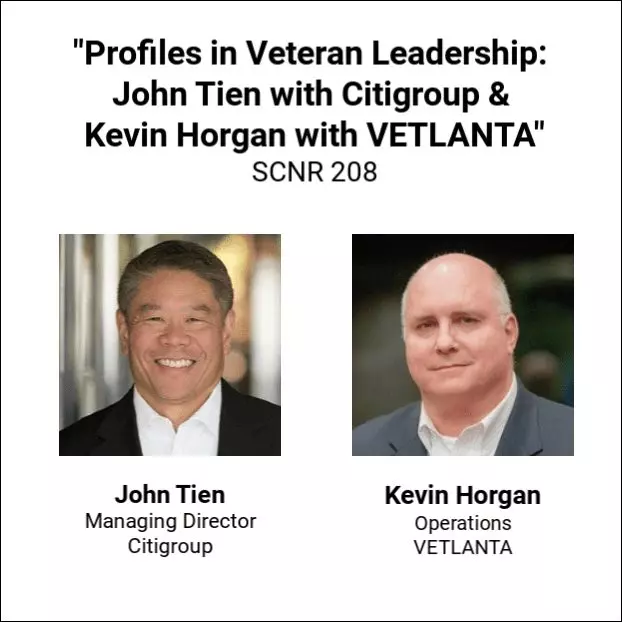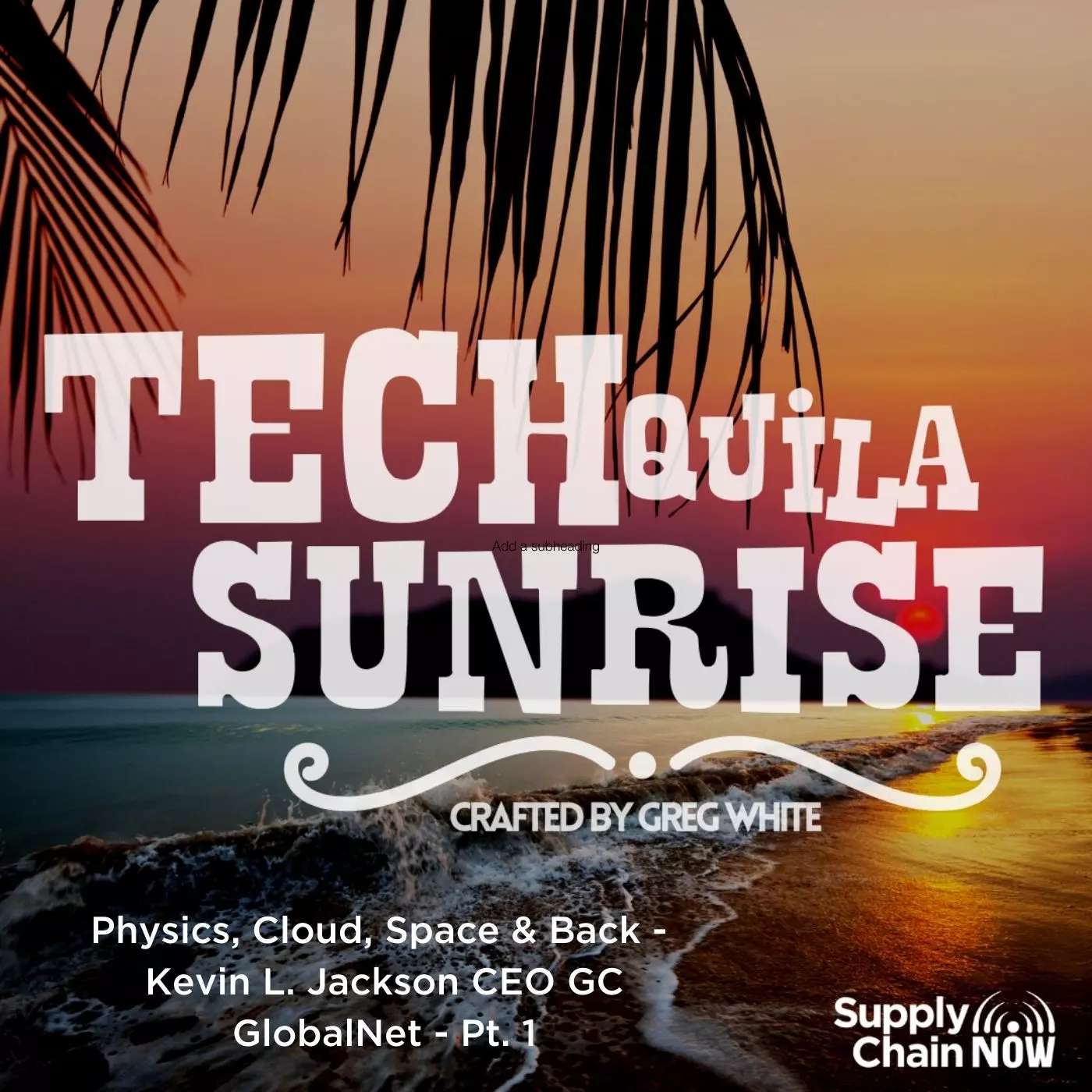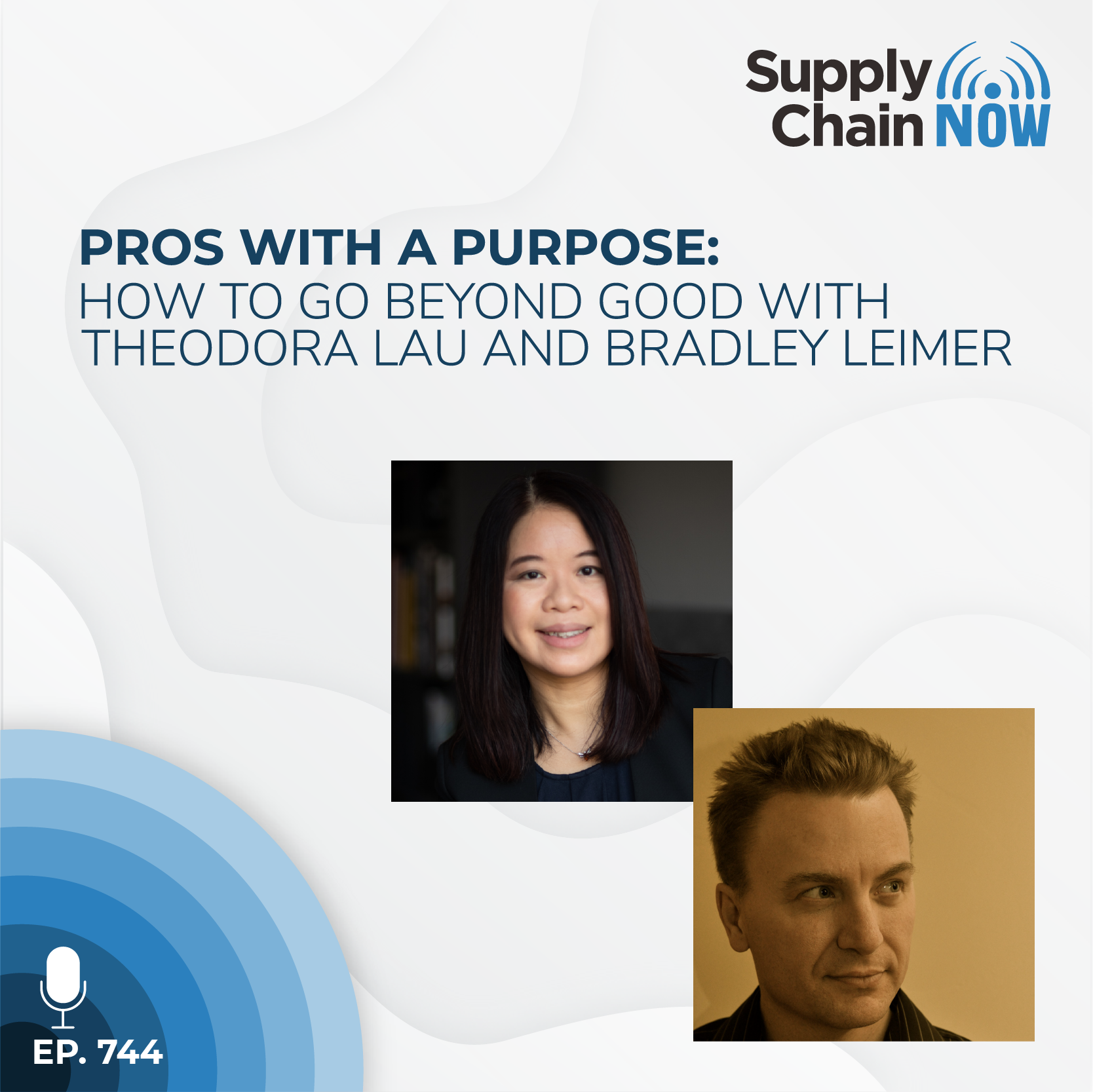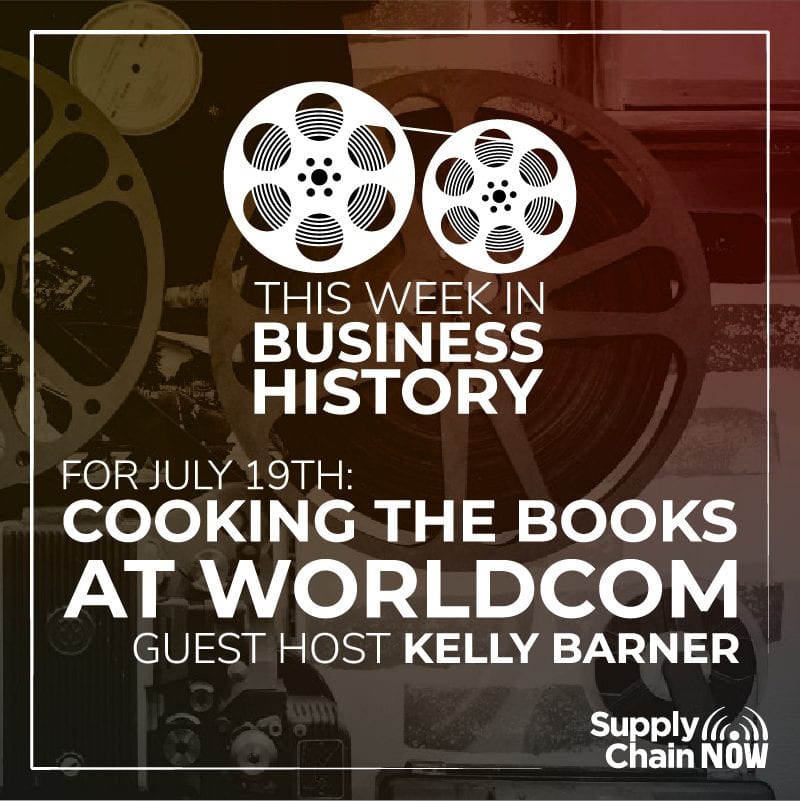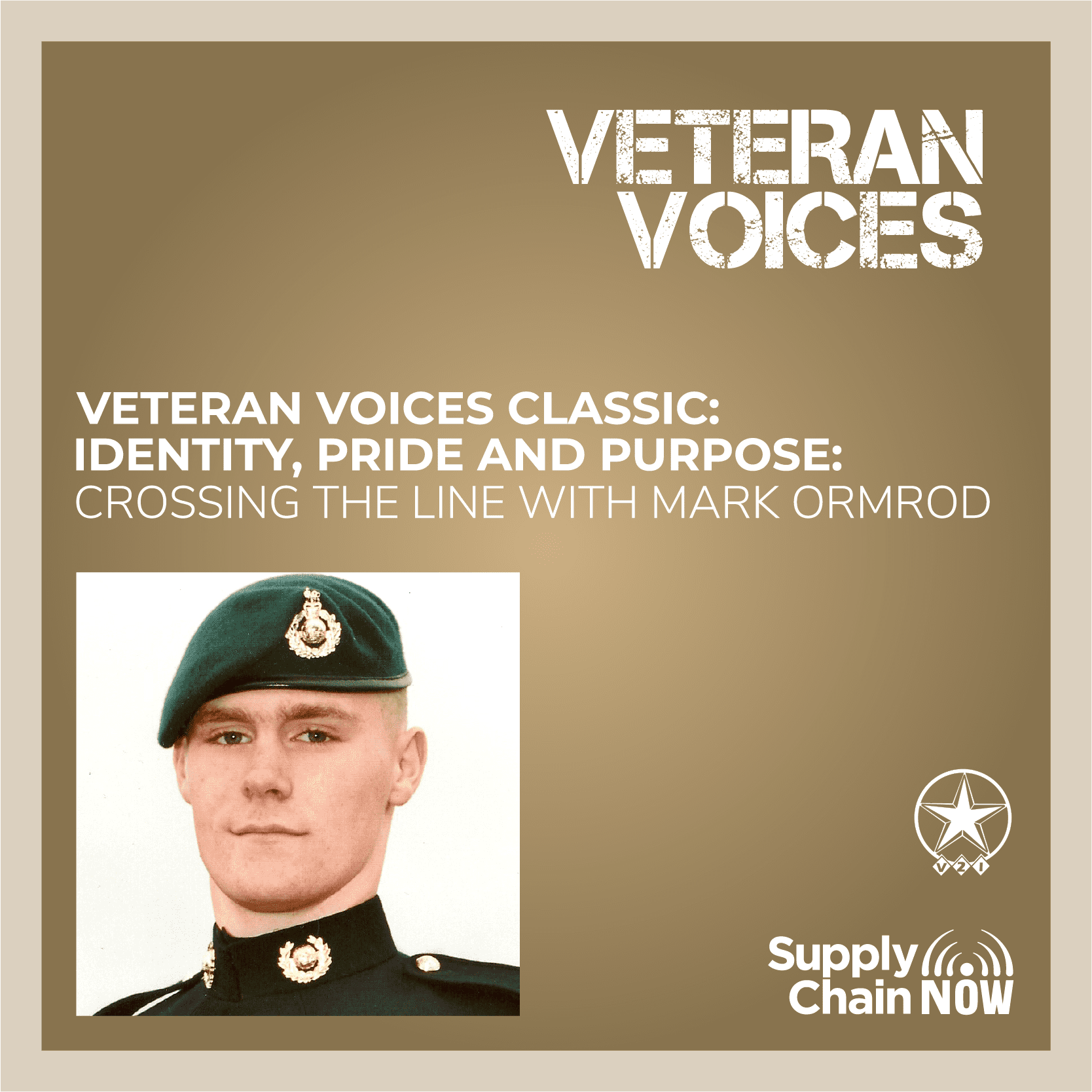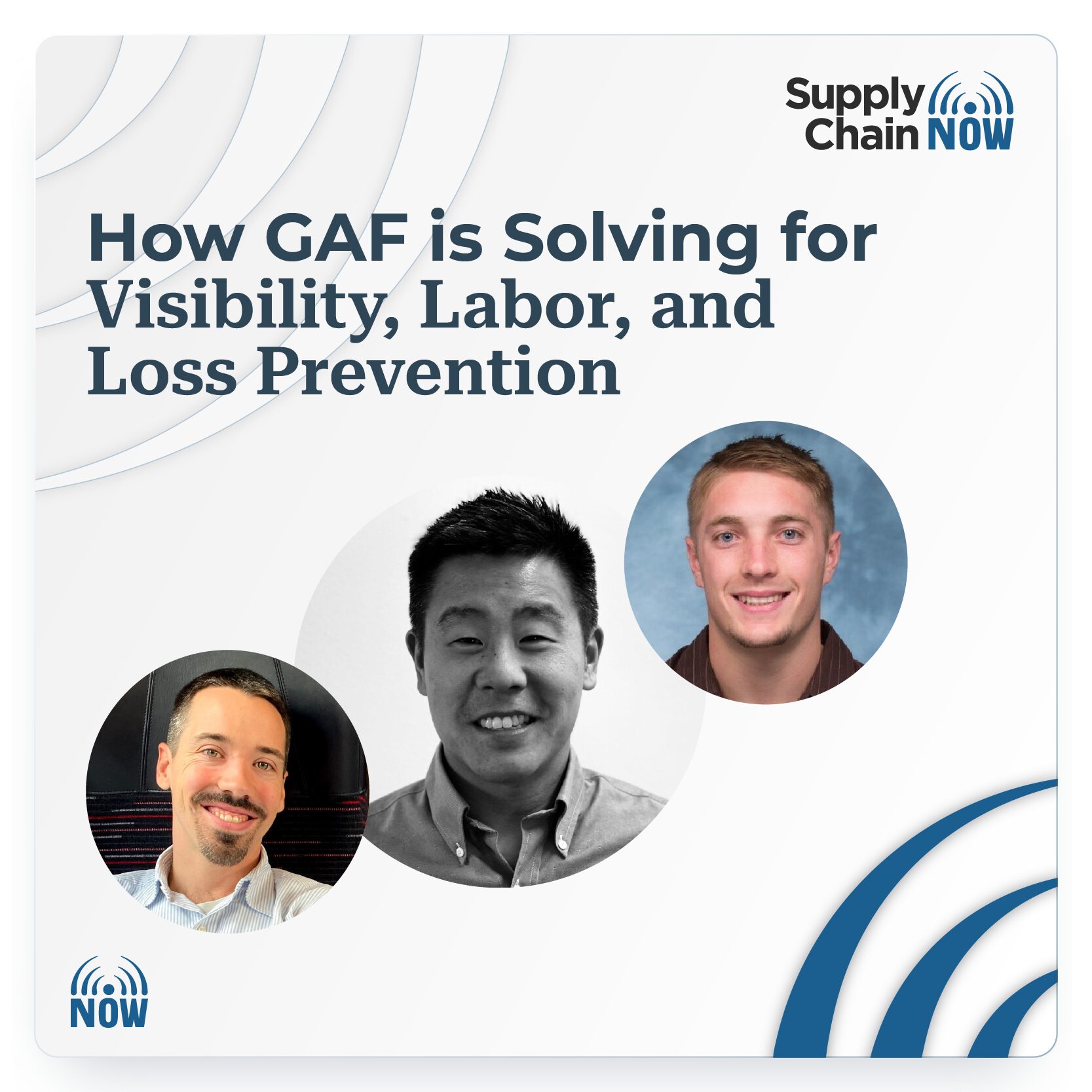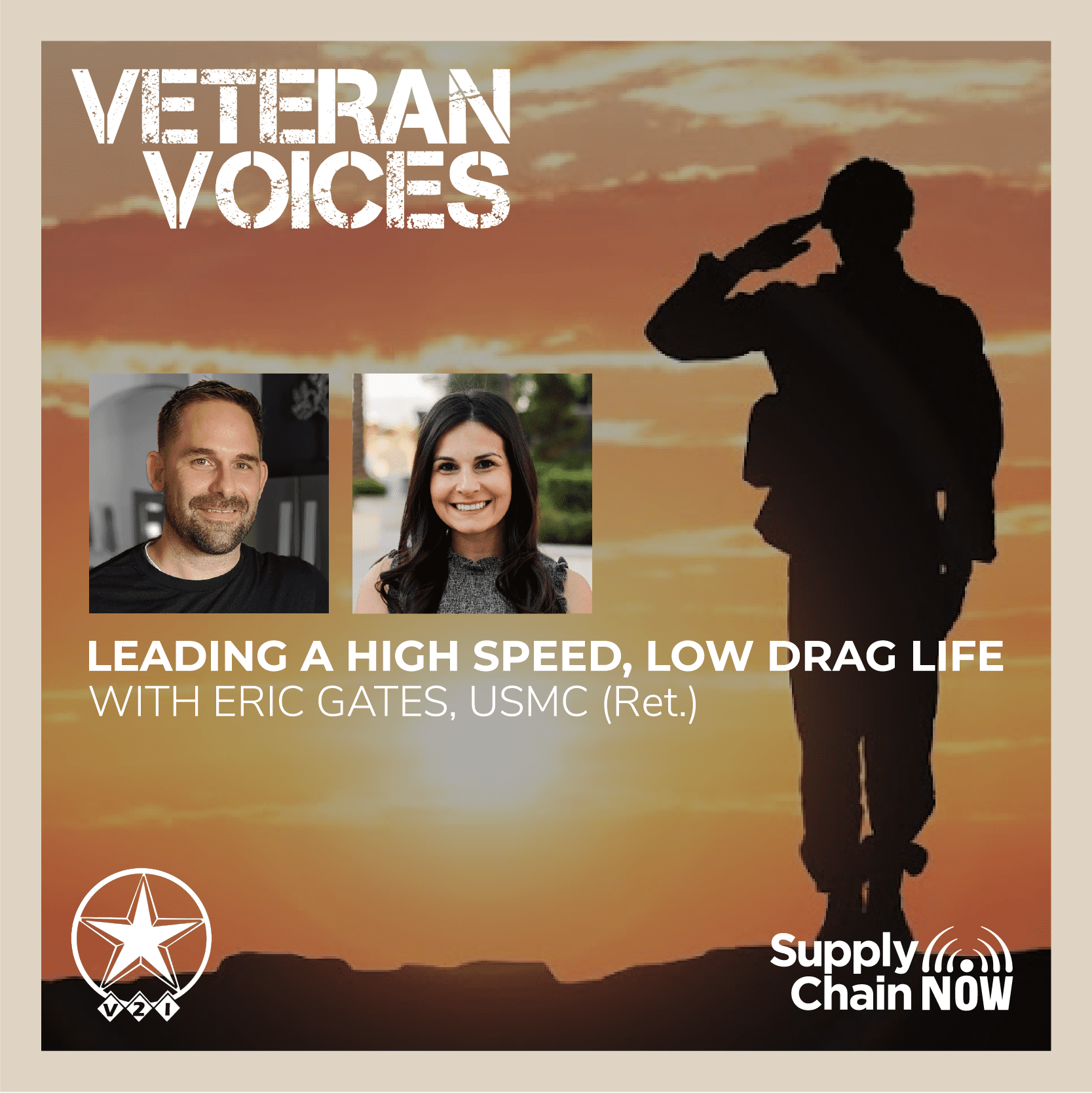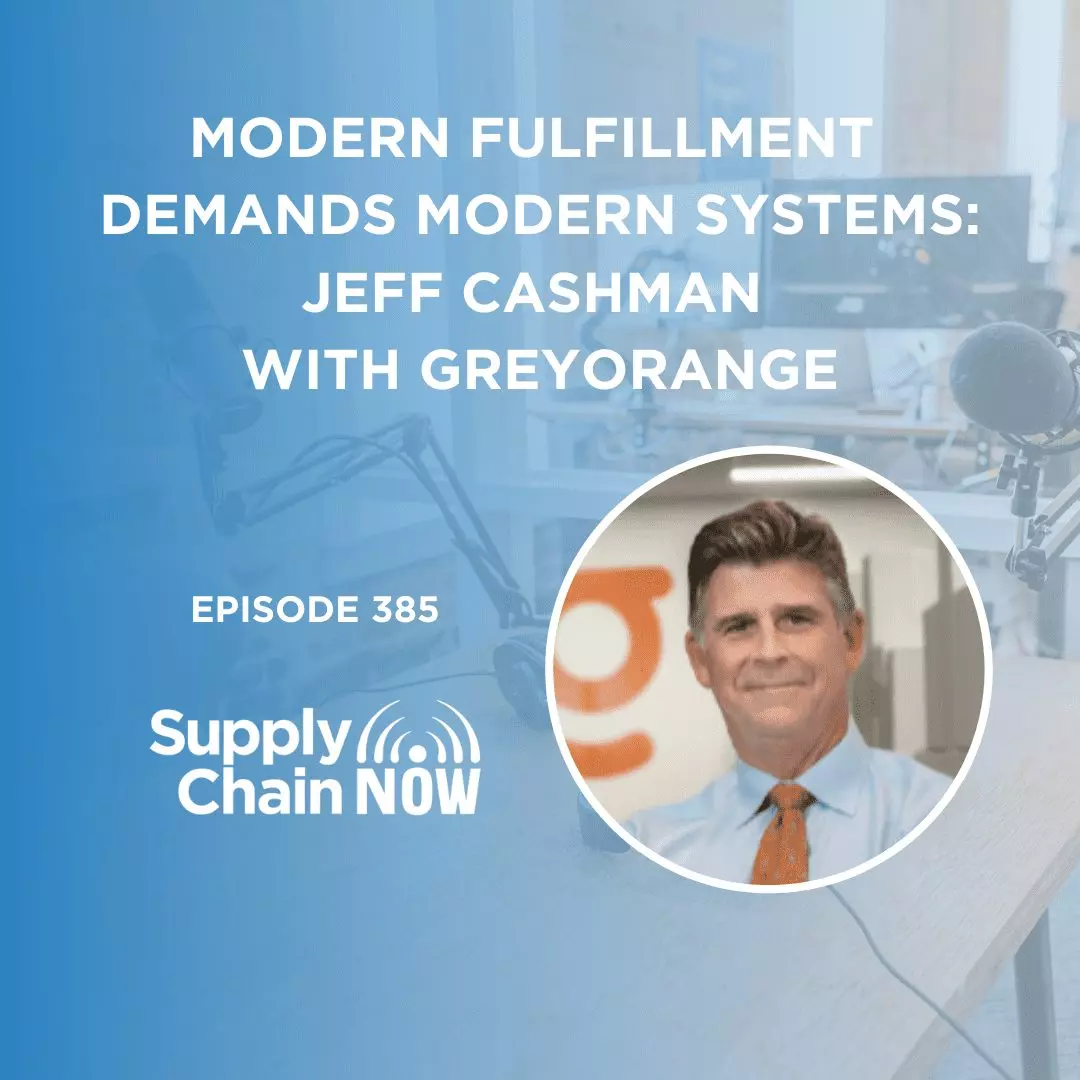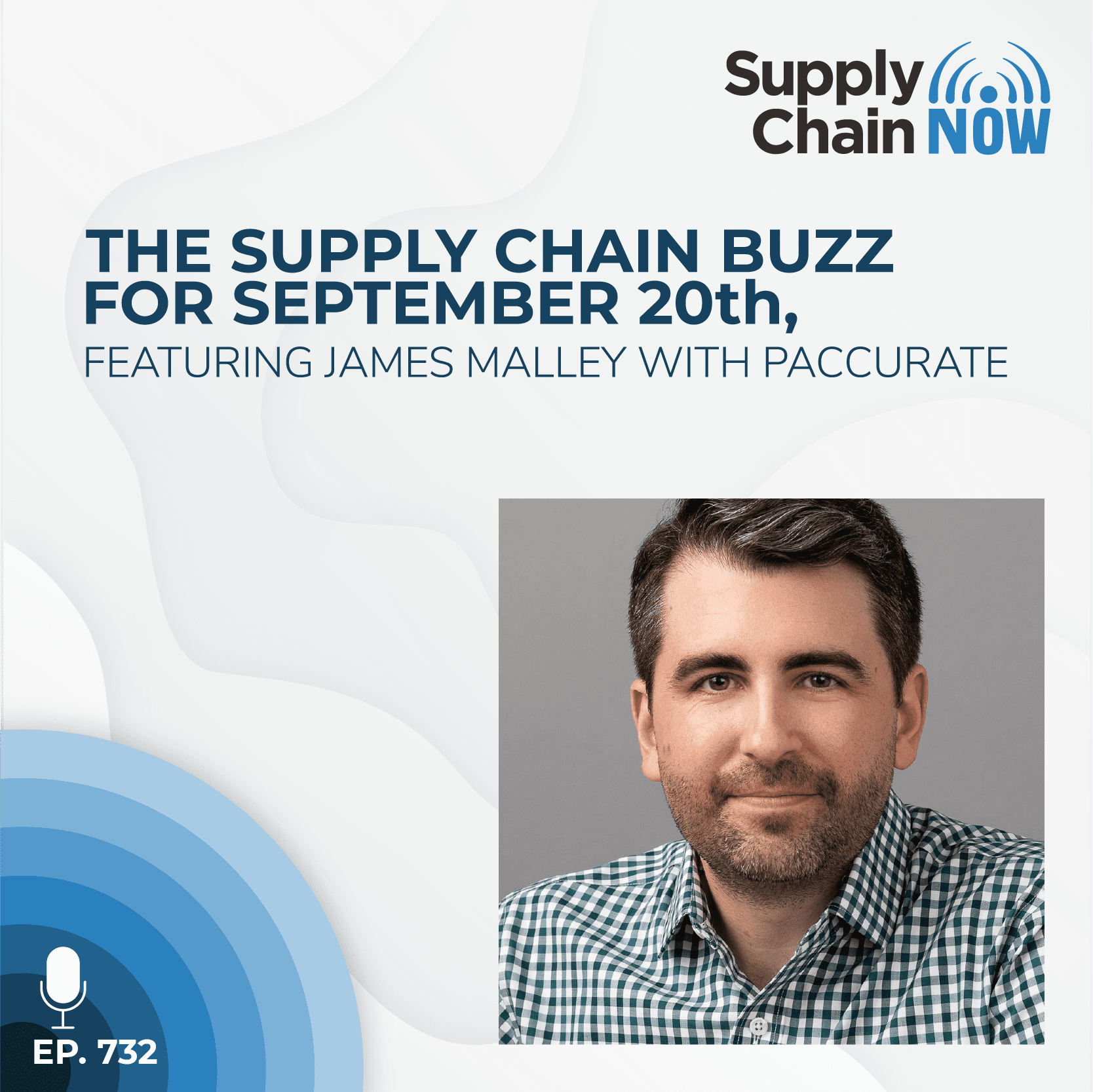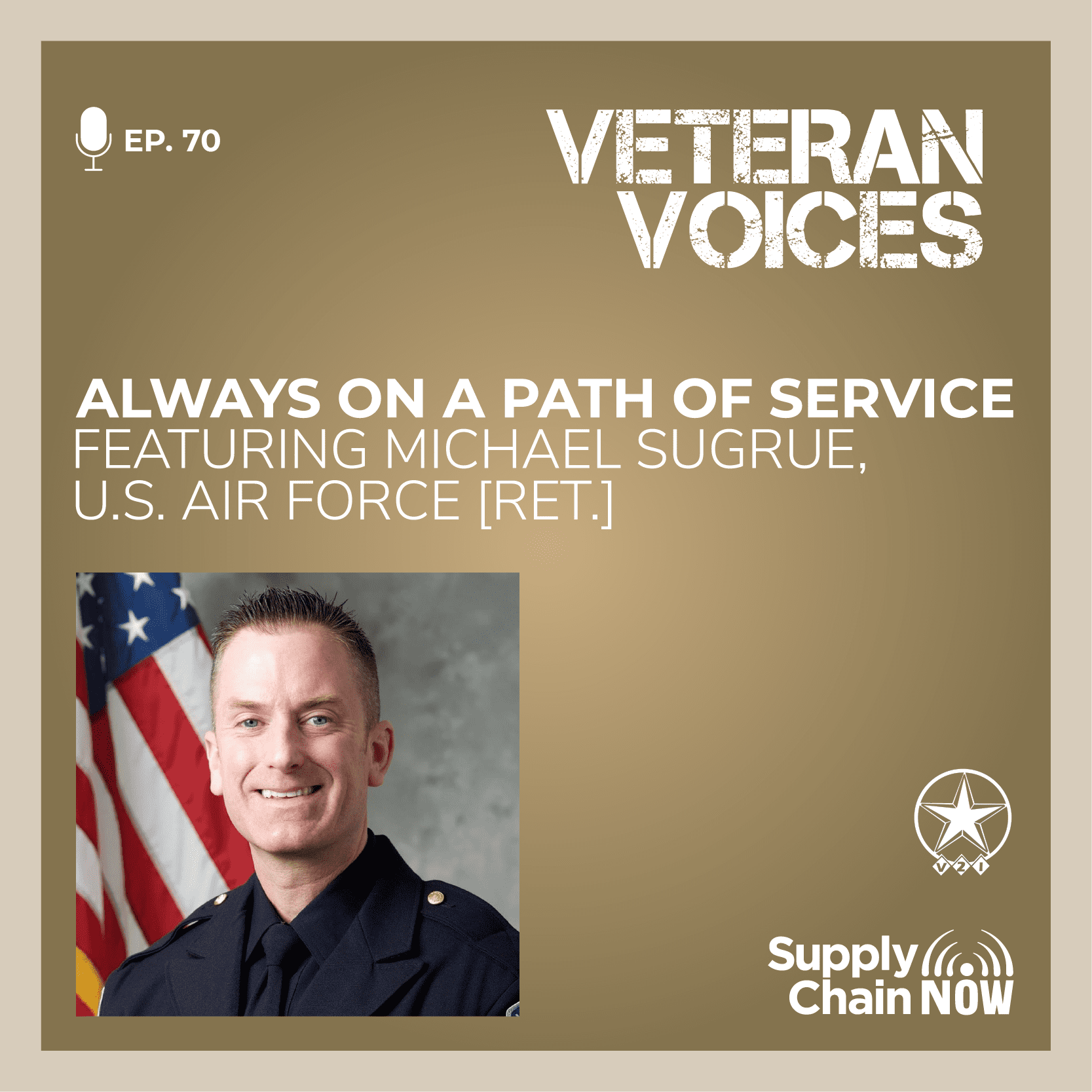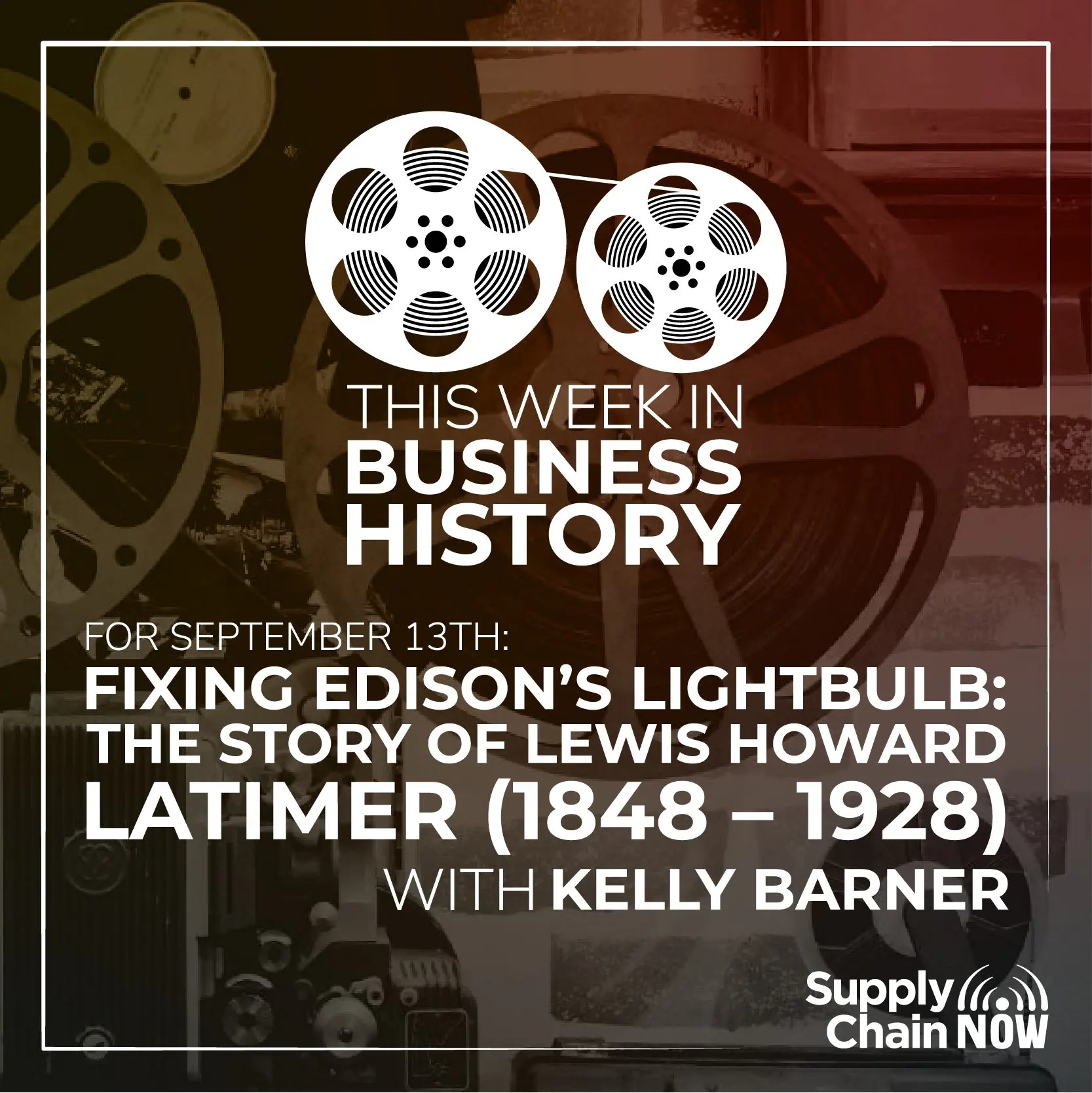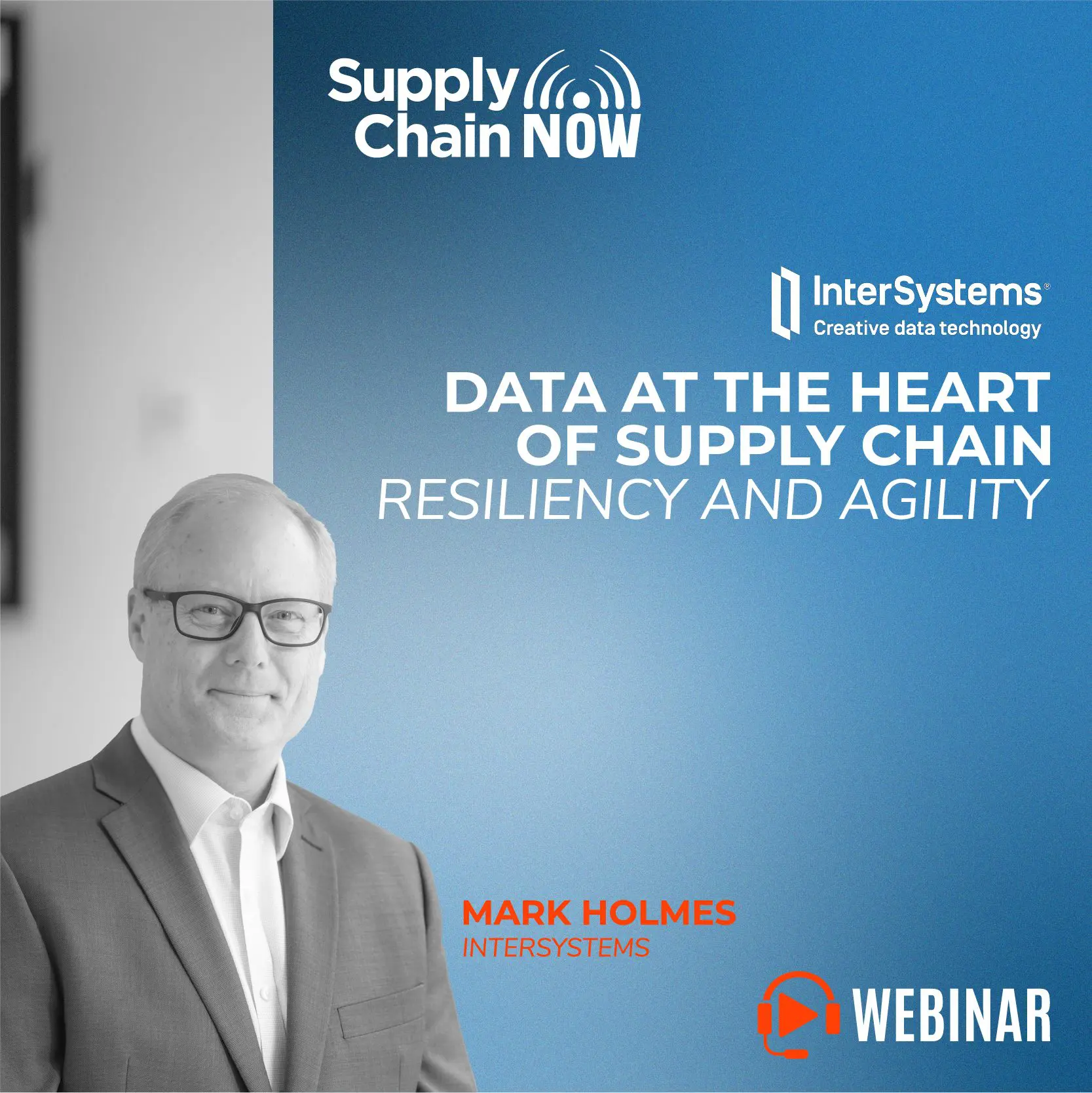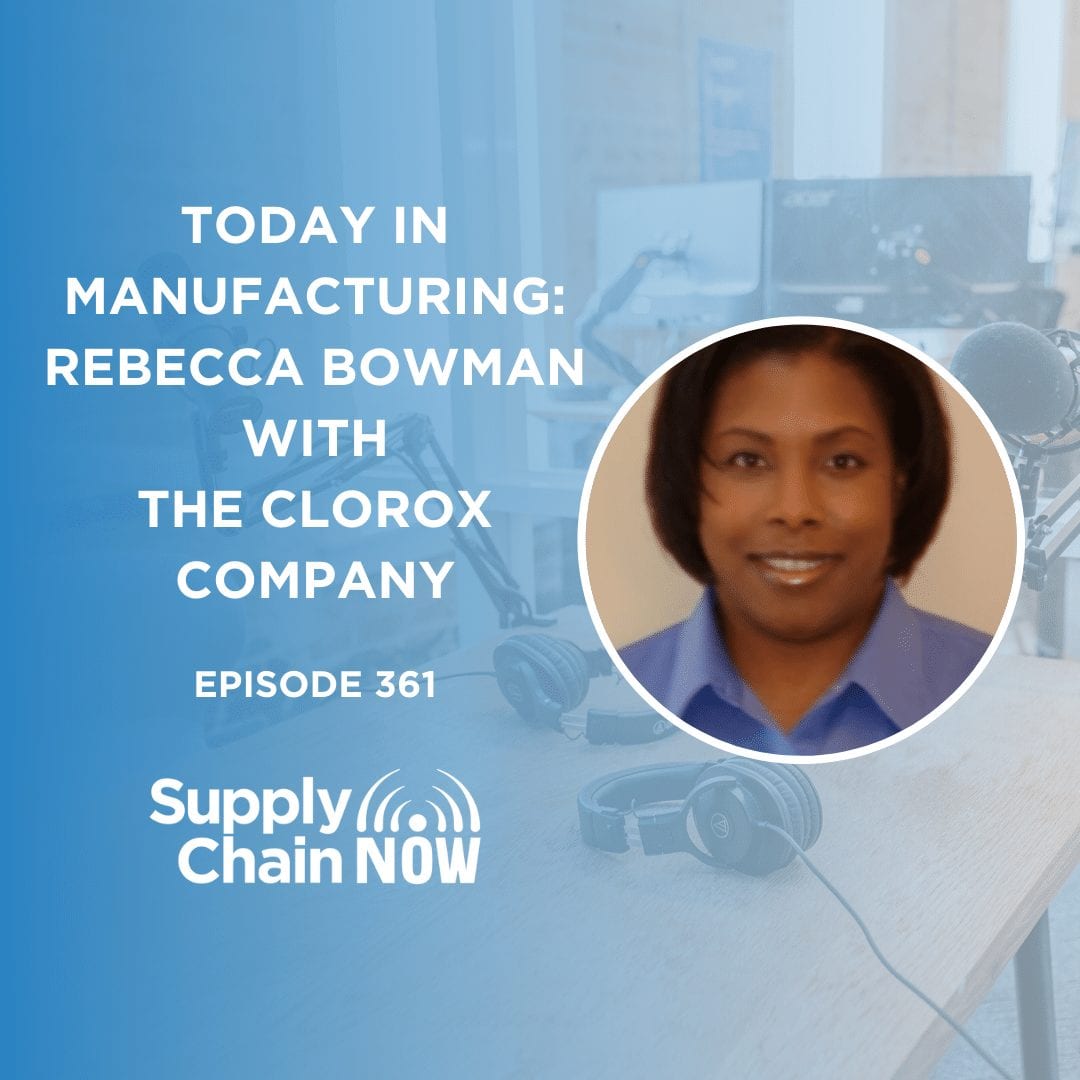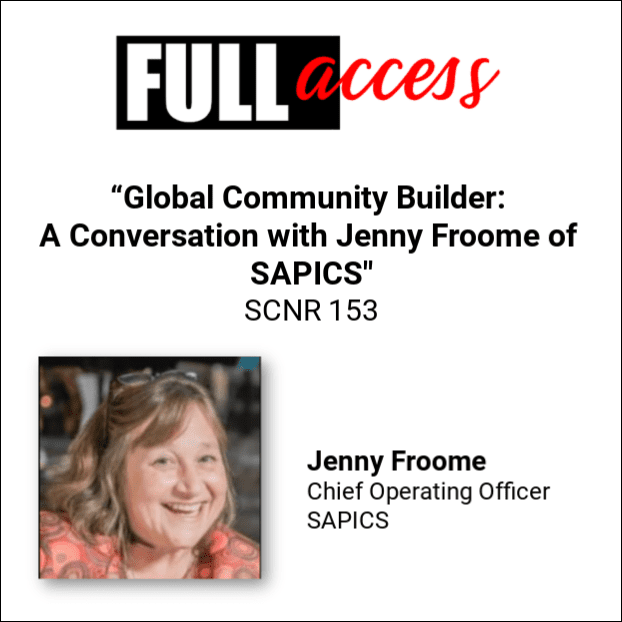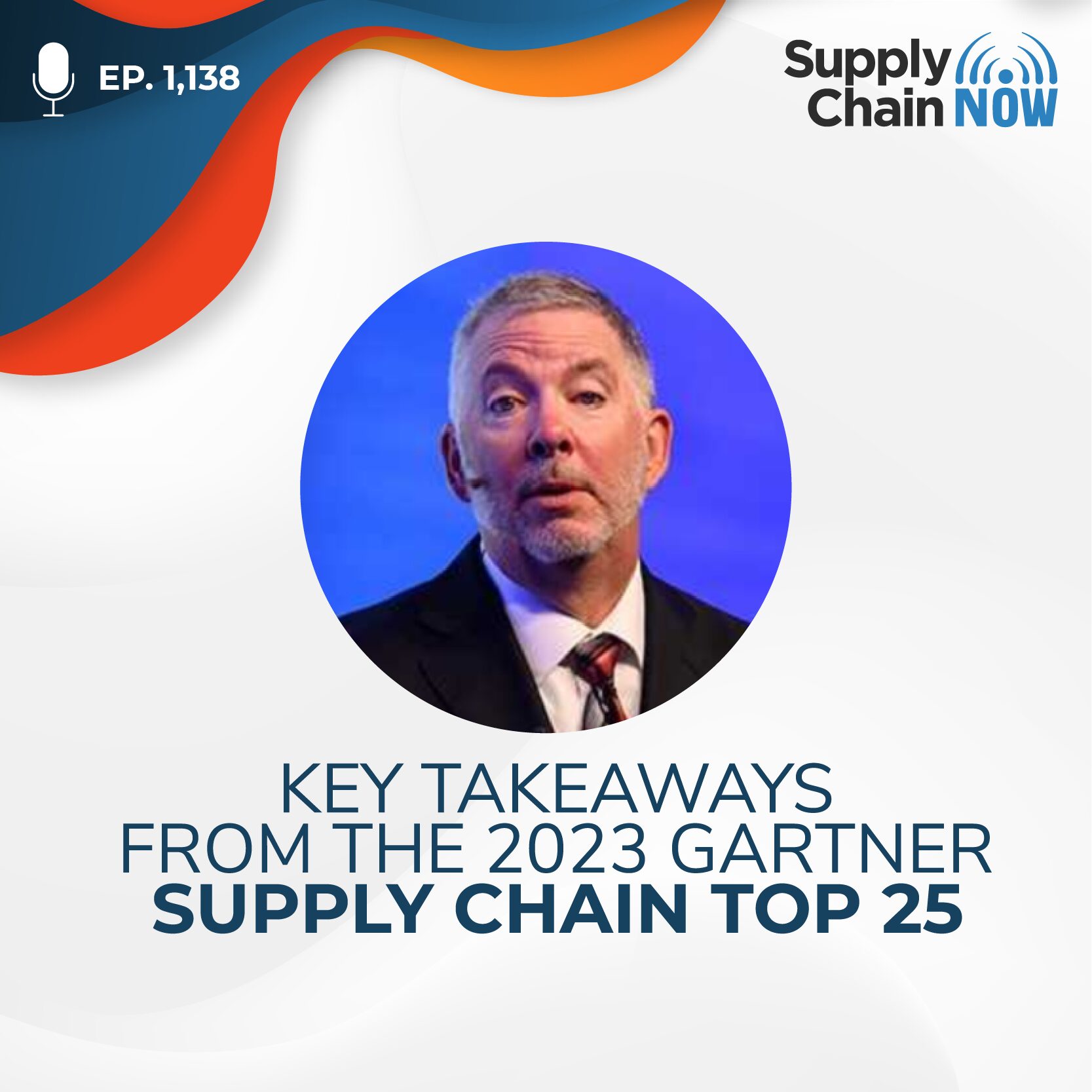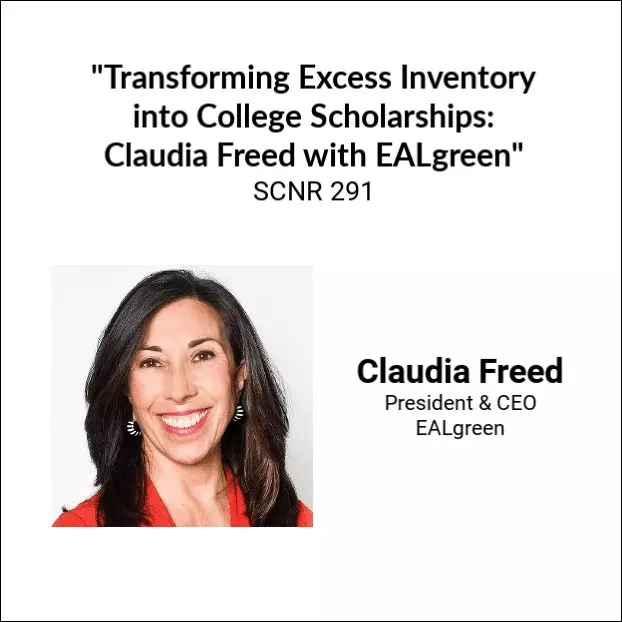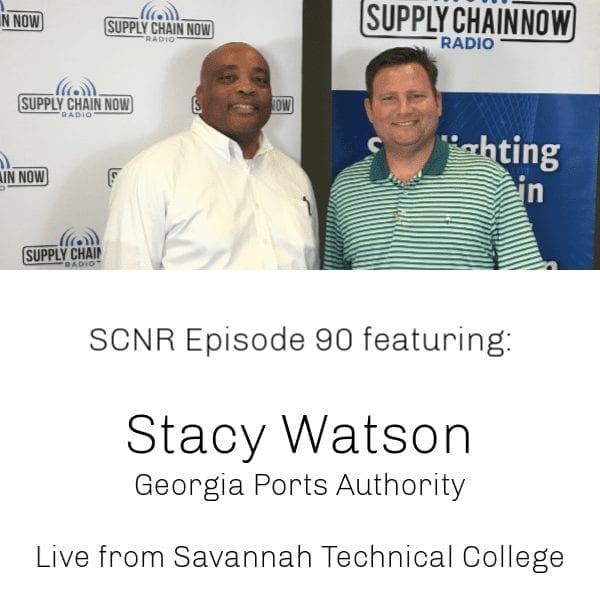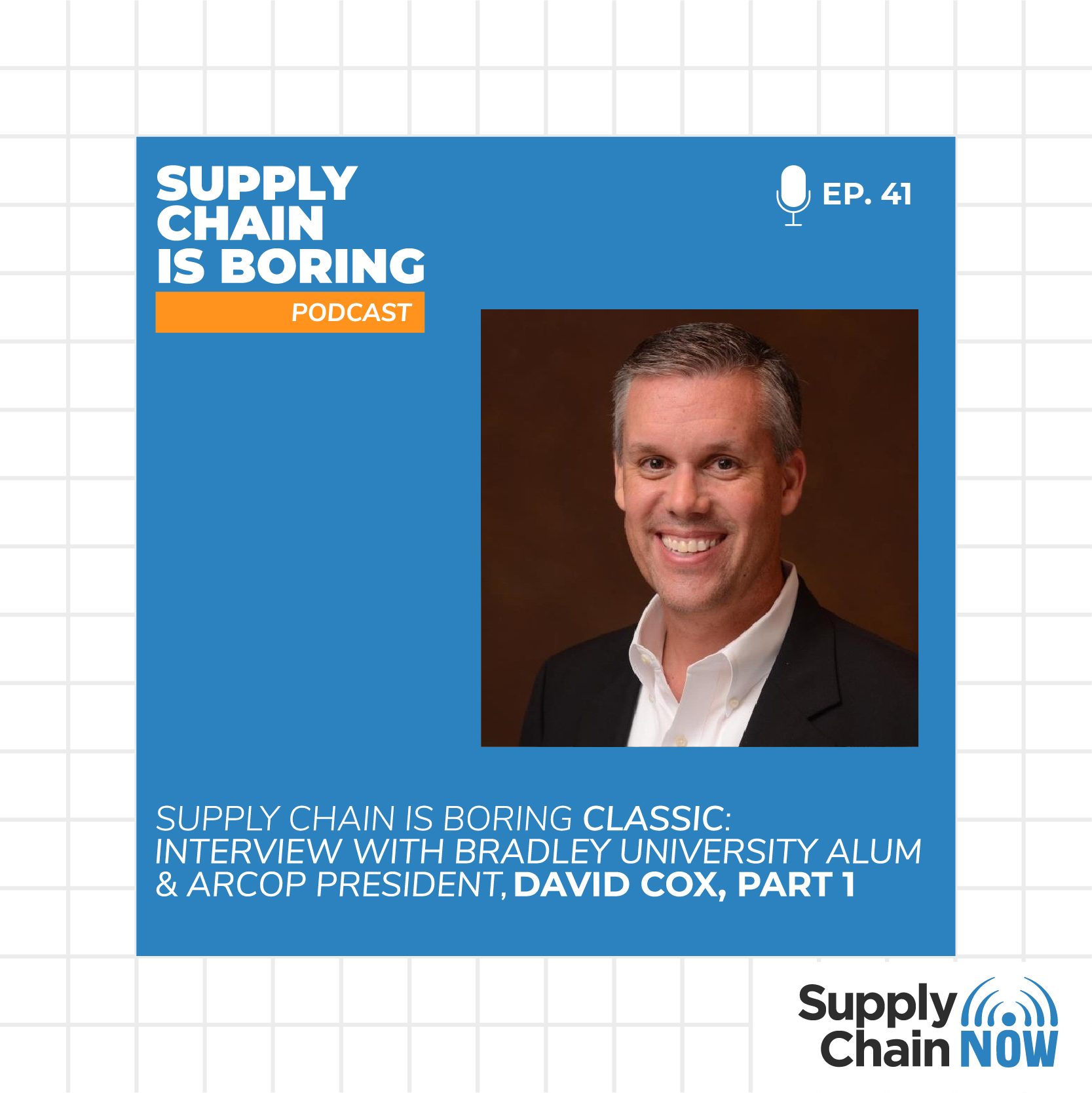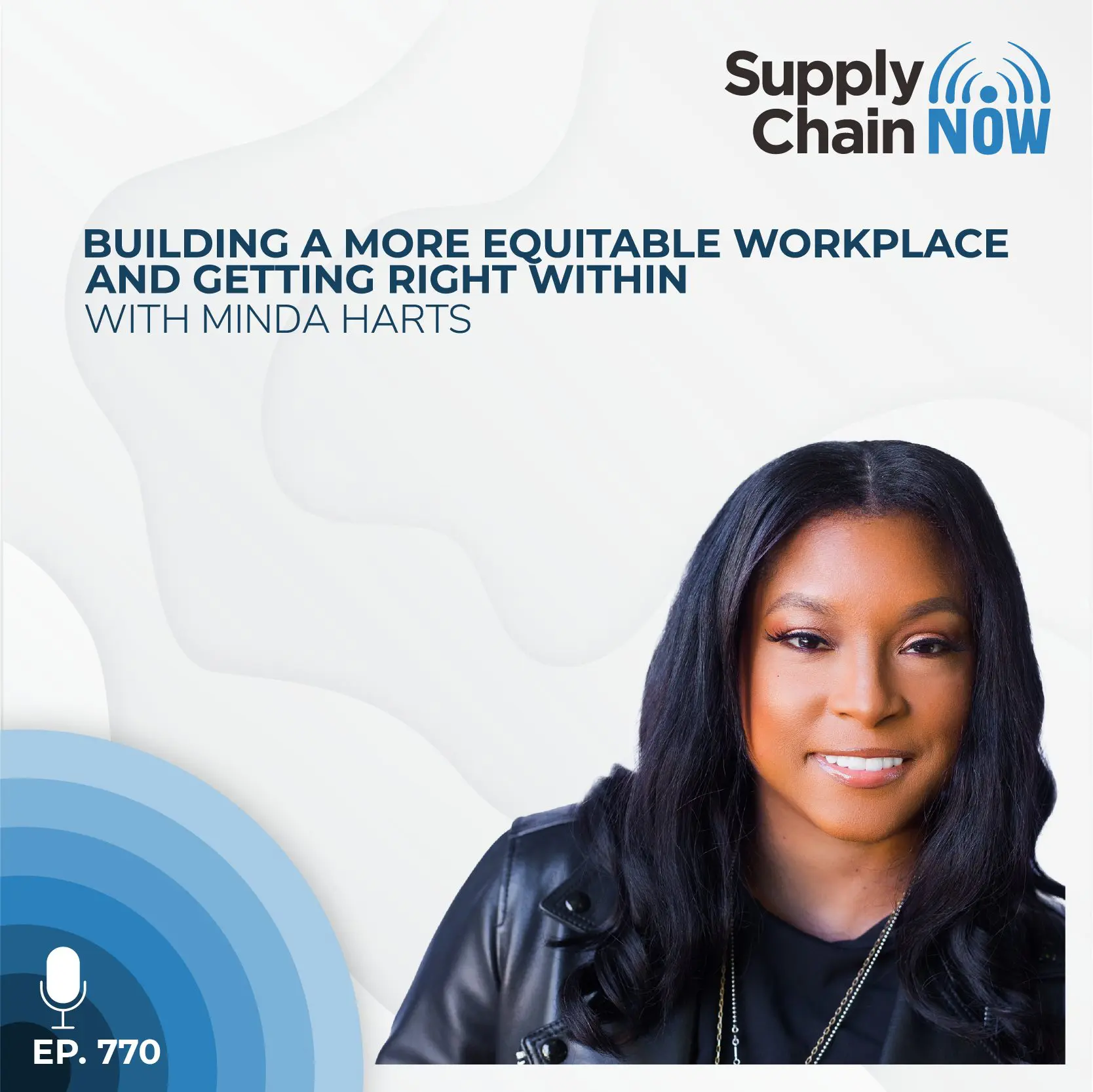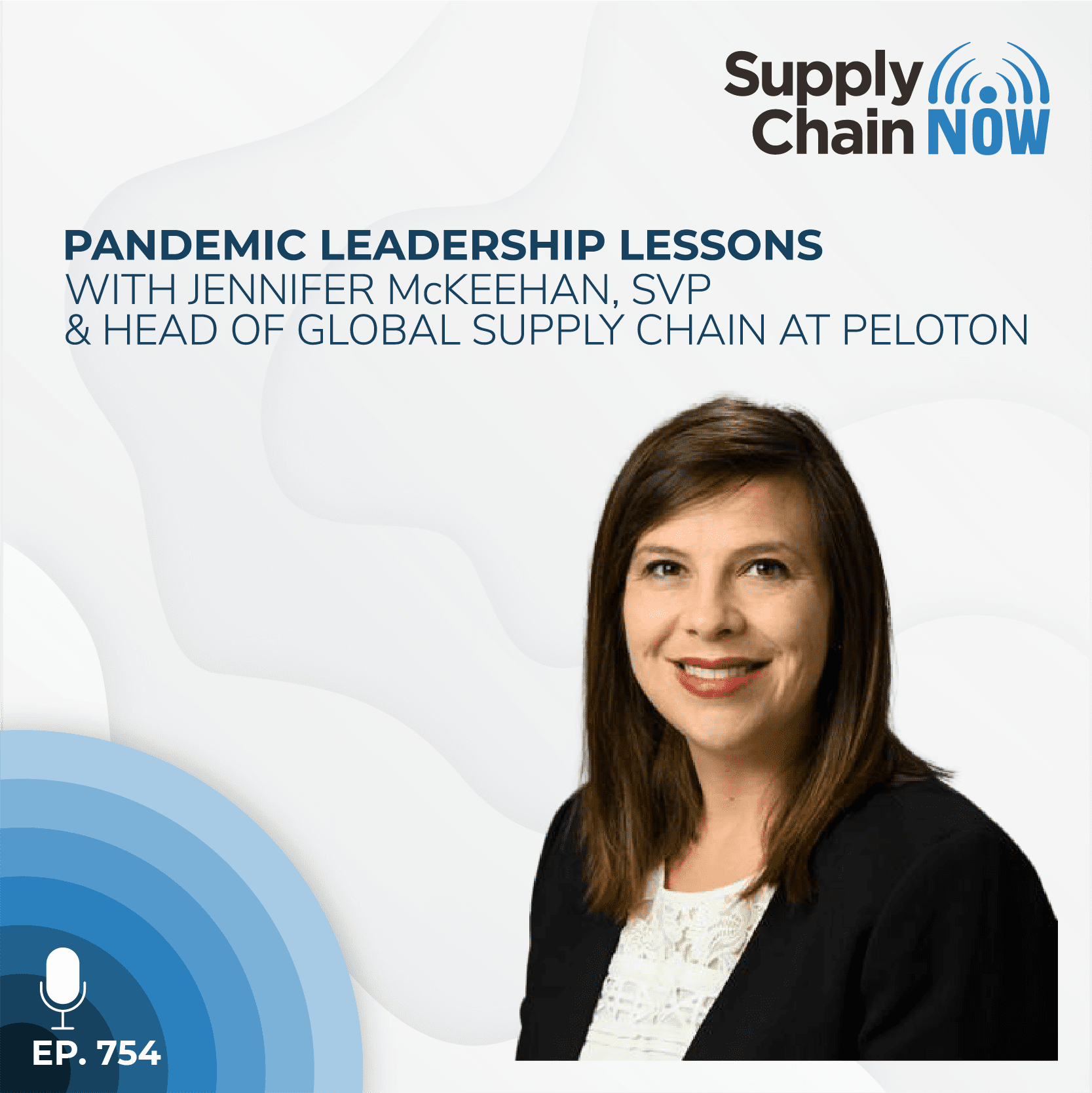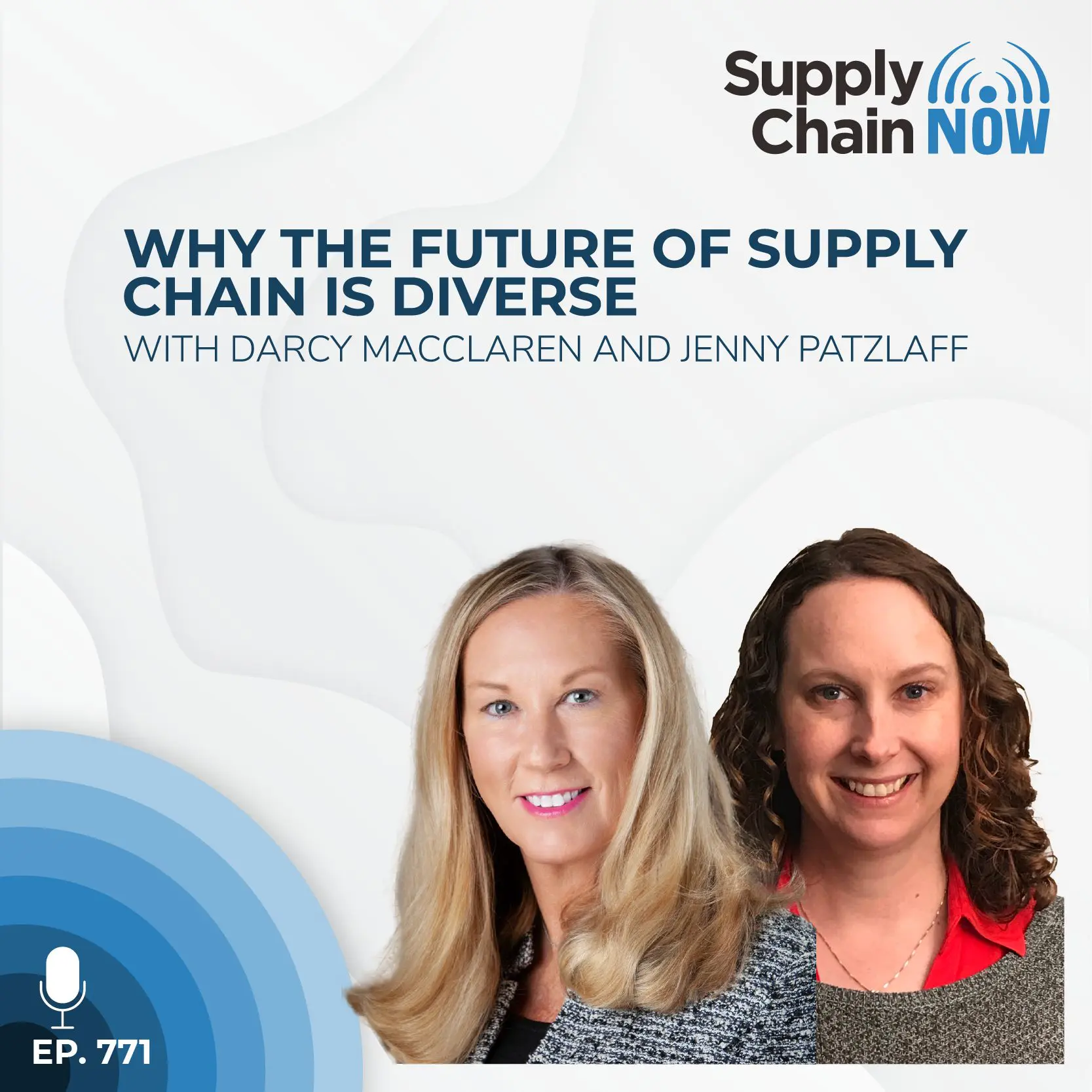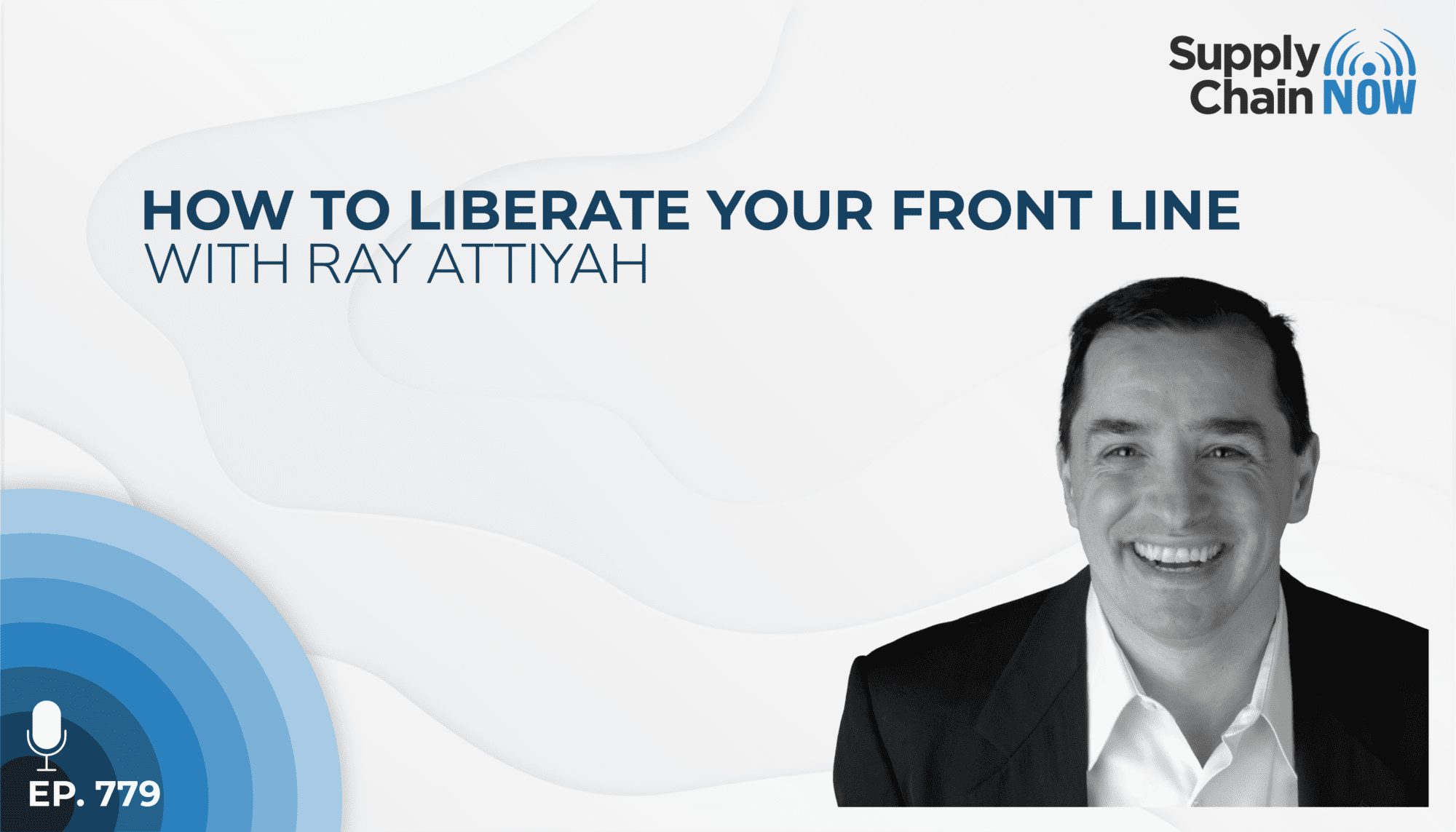
Ideas are available. Money is available. So it's the quality of the team that allows you to have confidence to go boldly.
-Ray Attiyah
Episode Summary
Why struggle to recruit employees when you can be a talent magnet? It takes a fearless approach – one that author Ray Attiyah has pretty much perfected. Having started, acquired or invested in 16+ businesses since 1996, he’s the author of the best-selling Run Improve Grow: Your Roadmap from Firefighting to Bold Business Growth. He’s also our latest guest, joining host (and former employee) Scott to talk about his new book, Fearless Front Line: The Key to Liberating Leaders to Improve & Grow Their Business. Tune in to find out how to empower the front line of your business for a renewed focus on innovation, tips for recruiting the right people, priceless advice for entrepreneurs, Ray’s top lessons learned from failure and more.
Episode Transcript
Intro/Outro (00:00:03):
Welcome to supply chain. Now the voice of global supply chain supply chain now focuses on the best in the business for our worldwide audience, the people, the technologies, the best practices, and today’s critical issues. The challenges and opportunities stay tuned to hear from those making global business happen right here on supply chain now.
Scott Luton (00:00:32):
Hey, good morning, everybody. Scott Luton here with you on supply chain now welcome to today’s episode. Very special episode today. I’m so very pleased to be presenting to you at dynamic business leader, very successful entrepreneur and a dear friend. So stay tuned for what promises to be an intriguing, inspirational and informational conversation here today. Hey, quick program in it for get started. This show is produced in partnership with our friends at Asheville arc. That’s the powerhouse team that built our new sparkling stunning website, supply chain ao.com. They are a leader in user experience design, right? Good old UX and development of websites, custom software applications, all within the supply chain industry and a lot more so you can check them out@azooark.com big thanks to say here in Azul arc team. Okay. With no further do I get a chance to introduce for the first time probably in, I don’t know, 10 or 12 years, maybe, maybe longer than that.
Scott Luton (00:01:28):
I get a chance to introduce our special guest. So he’s author of the smash business book, the fearless frontline, which I’ve got my copy. We’ll walk through that in a moment. Maybe he’s a founder. His first business was definitive partners based in Cincinnati, Ohio, but since then he’s he’s founded, started numerous other businesses. He’s a mentor to countless business leaders across the country and really cool here. He serves as co-chairman for the skills initiative for the European American chamber of commerce, which is helping to address the skills gap across industry. So please join me in welcoming my dear friend, the one only re uh, Tia Ray, how you doing?
Ray Attiyah (00:02:08):
I am doing great, Scott. Thanks for having me.
Scott Luton (00:02:11):
You bet. Well had to, had to trim that intro down. There was about five volumes that I could have added all the stuff you’ve been you’ve been up to in your career, but, uh, it’s great to have you here enjoy catching up in recent weeks and you always have new big news, right?
Ray Attiyah (00:02:27):
Sometimes I do. Uh, and now being a father of three teenage girls, I have new news every day.
Scott Luton (00:02:35):
Okay, awesome. Lots of market Intel at sounds so before we get into some of what we’re going to talk about our, our time together as I worked for one of your organizations and we were able to rub elbows on a regular basis and some other things, other leadership and entrepreneurial advisory will be offering up. Let’s get to know Ray at TIAA. Now I’ve had a chance of course, to do that. And, but I want to share some of your journey with our, so tell us, Ray, where did you grow up?
Ray Attiyah (00:03:02):
So I grew up in central New Jersey, Piscataway, New Jersey. And some of you are watching Rutgers, you’ll see Rutgers stadium they’re right there. And bill Scotto in New Jersey grew up second of eight kids. My father was a teacher, um, as a homemaker. And, uh, so I grew up there, went to school, there went to Rutgers for industrial engineering. And then I, uh, made a Trek and relocated to Cincinnati, Ohio to come and work with a large medical device company. So
Scott Luton (00:03:30):
I got to go back cause I forgotten. So you have had seven siblings growing up. How did you fight for your snacks and your dinner? I mean, tell us about what it was like growing up in a big household like that.
Ray Attiyah (00:03:43):
Well, it’s kind of a combination. Uh, so my dad was a teacher. So you got the instruction, you got to learn how to think. It was almost like Mr. Miyagi teaching you how to think. But then we have my mom who was very much kind of that industrial engineer system thinker, you know, how food was done, you know, laundry. And so it was a very efficient system. So I think I got a little bit of from both, but there was no, what, what do you guys want for dinner? It wasn’t, here’s what’s for dinner. Uh, and here’s when it served. And if you don’t get your part, you know, too bad. Now my mom, when she visited me, she used to bring her pots and pans, uh, here to Cincinnati. So one thing he didn’t worry about was running out of food because she made large fortunes because he ate the same thing for three days. So that was part of her inventory strategy. Right.
Scott Luton (00:04:32):
Part of her planning. All right. So you’re talking food. I gotta ask you one question before we move on to talking more things, uh, work and entrepreneurial-ism you name it? So what was a dish growing up that you wish you could still have once a week now? What’s what was, uh, an integral part of your culinary experiences growing up?
Ray Attiyah (00:04:52):
Yeah, for me it was greatly, so, uh, and basically it was a lot of work. So the role of the grape leaves takes a significant amount of energy and effort. Fortunately, my mom taught my wife how to make it, so now I roll them occasionally with my wife, but she does most of it. So it was probably grape leaves. And maybe part of that, sometimes it’s combined would be stuff like plants or squash. So it’s stuffed with a, so you’ll pick it up at any Mediterranean restaurant, but you know, probably a grape leaves was kind of a very special,
Scott Luton (00:05:27):
You’re making me hungry, really hungry. I love the, you know, hearing about you doing that with your family. Now. I think, I think cook and food, making food. I think those are really special things that families do and friends do when they get together. Right. Oh yeah.
Ray Attiyah (00:05:42):
And, uh, I’ve, I’ve learned now that I’m kind of exiting a number of businesses, uh, working on the grill a lot more.
Scott Luton (00:05:49):
Awesome. All right. We’re gonna have to bring you back for those exploits,
Ray Attiyah (00:05:53):
Not a professional I’m working on it so I can tell you, I love the, uh, the one saying you never appreciate a professional until you try an amateur. So I am the amateur on many of those cases, so I really appreciate the professionals there.
Scott Luton (00:06:06):
Love it. Alright, so I want to fast forward a little bit. So I mentioned, I think on our front end that we got to know each other because I worked for your, your first business, you found that definitive partners and really it was a, it was a very powerful couple of years spent learning from you and other folks on the team. And we’ll talk about some of that, but first for our listeners benefit, for some context, tell us about what Definity partners did in a nutshell.
Ray Attiyah (00:06:35):
So in a nutshell, we’re a training organization. So we would come into mostly manufacturers, uh, and applied to others. But the majority of them were manufacturers where we would come in and basically show and model behavior of how to both improve processes, but also lead people. So unlike most organizations that are consulting, they come in and give you advice. And it’s up to you to implement or the other extreme of education where you sit in a classroom and learn it, but then you’ve got to do it. Uh, what I saw was missing was somebody who would actually come out there and actually help your team actually succeed, but overcome all the barriers. So the barriers could be processed. It could be people, it could be leadership, it could be strategy. And it could be technology, which is one of the reasons why I ended up acquiring a technology business. So we were a training organization and typically working with companies that are going through some sort of massive growth or transformative change, their team knows how to maintain, but they struggle on trading something new, right? So we’re exceptional at training people, how to behave in a new way.
Scott Luton (00:07:42):
Wonderful. And, uh, it’s tough to do it justice in little bit of time. We’ve got here, but clearly your team, definitive partners work a lot in the manufacturing space. Well, really all kinds of sectors. And, but at the core of it, all Ray is the run improve grow system. And again, uh, it’s tough to do it justice in short amount of time, but explain that in a nutshell, what does that mean to people?
Ray Attiyah (00:08:09):
Excellent. So basically imagine if your frontline can run the business completely on their own without any management involved. So that would be the vision of what run improve grow is about really arming your frontline to have the capabilities, confidence systems, and empowerment for them to be able to run the business on their own. What that then does is liberates, uh, middle managers to work on system improvements, how to prepare for the future. And then you build a growth team that is looking for new growth opportunities, new products, new services, new markets. And what I typically see in organizations is you’ve got a lot of the management team in the run right now. So they’re running, running, running. So basically how do you eliminate them from being necessary in the run? And, you know, in a separate podcast, we can cover the seven sins of what causes that. But element of this is really empowering the front line for them to own the run of the business. So growing the business in existing markets and existing products is the run. And so building, you know, again, I’m an industrial engineer. How do you build the systems to make it, uh, make them successful, right?
Scott Luton (00:09:22):
And liberate the leaders really the whole organization in many ways. But to your point, so many business leaders do spend time stuck in the run, putting fires out, and we can also reward that behavior, which can stormy the growth and success organization too. So,
Ray Attiyah (00:09:41):
And you hit one of the, one of the seven sins, which is a flaw of reward system that rewards people for being firefighters. And when they’re in the run, what they’re not doing is they’re not focusing on being relevant businesses have to continuously adapt. So you’ve got one group who’s making sure, you know, take Amazon, we’ve got one group is making sure books get done. And then another group who’s working on getting pharmaceutical, uh, licenses so they can start selling drugs via mail. So, but if you’ve got the same group working on the day-to-day books, then their ability to stay relevant, slows down,
Scott Luton (00:10:18):
Right. They’re not finding new opportunities where they can compete and compete very effectively. Yeah.
Ray Attiyah (00:10:24):
Experiment. They have to experiment and try it. Some of them are going to work. Some of them are not
Scott Luton (00:10:29):
Great point and Amazon’s a big fan of experimentation. Okay. So before we touch on again, definitive partners, this book, the fearless frontline, which folks I think can see that they can also see my, all my dog ears there. This was, I think this was your, was this your first book you wrote? Okay.
Ray Attiyah (00:10:48):
Yeah. So it was published in 2013, my first book
Scott Luton (00:10:51):
And it sold out, I believe, I think you can only find it in secondary, you know, like Amazons and stuff. You used additions and the price tag is I’ve seen you tout the price tag, the values, these things are expensive now.
Ray Attiyah (00:11:05):
Oh yeah. So they got up there. I mean, I saw some of them that are close to a thousand dollars, so I was telling people don’t do that. So what I did is there’s a furious front line and here right here is the second edition called run proof growth. So it’s very similar book. There’s actually one enhancement in this one, but this is the first edition and this one’s almost done, but the fearless frontline was actually a top 30 business book of the year, probably out of all the businesses I started. It was the hardest professional project I’ve ever done. You know, just like for you putting out as podcasts, you got to put it out there and then like, but the feedback has been awesome. You know, it was written in a way so that everybody in the company can get a copy and for them to have a common language. Okay.
Scott Luton (00:11:47):
And lots of stories, lots of practical advice. That’s not theoretical proven advice and, and systems thinking that you heard Ray speak about, but Hey, y’all check that out. Don’t take my word for it. Yeah. I’ve had the opportunity of seeing and working with the brewery at person behind it. So of course I’m biased, but as, as Ray said, the market has spoken and it was very well received that in the, in the followup addition run, improve, grow, which of course is related to the system that ratio at a moment ago,
Ray Attiyah (00:12:16):
You know, what’s interesting. The, uh, you mentioned proven, so if I can go through each chapter, I can literally tell you the company where that idea came from really the book itself is really working with a couple of hundred companies, but taking the best out of this company, like one company had a great empowerment. One company had great technology. One company had great strategy and building. And so, you know, when you said brilliant mind behind it, it’s really many brilliant minds experimenting for 20 plus years and then saying, Hey, here’s what, when you put it all together, the best of the best would look like as one system, right?
Scott Luton (00:12:50):
It’s, it’s a, it’s like a positive Frankenstein. I’m not sure we got to rename that in a,
Ray Attiyah (00:12:56):
You can do just kind of a positive, you know, one of these phone with the, you know, camera with the pager, with the EMS.
Scott Luton (00:13:06):
So you’re saying it’s the, uh, the app phone of how to succeed business books. I like that rate. All right. So this could be a 12 hour long podcast in a heartbeat
Ray Attiyah (00:13:19):
And not getting in the same room together. This
Scott Luton (00:13:21):
Is true. I think our last catch-up call was about two hours, but we, I, I enjoy, uh, what you share and your stories and what you’ve been up to, but, you know, Definity partners, again, your first business that you founded. And, you know, when we worked together was in the mid two thousands and man, what an incredible team you assembled, in fact, just pre-show we were talking about how, just how beyond, how talented the team you’d assembled was, but how entrepreneurial they were. And so specifically I’d love for you to maybe speak, you know, it’s the war for talent air right now, right? Every organization is dealing with it, but there are very few true talent magnets that just have waiting lists of, of associates. Right? So two things in particular, of course, I worked for ed Robinson, one of your market leaders, which was a brilliant, brilliant guy, get stuff done, great leader action-oriented could walk into any operation and within a little amount of time could, could offer up a plan for taking it to another level.
Scott Luton (00:14:24):
I mean, it really just a very quick study. And of course, Kevin Linehan, who was on our Georgia team as well, uh, also an incredible change agent and leader as well, learned a ton from the whole organization and you, but also, you know, I worked with ed and Kevin every day. And so it it’s amazing what, uh, how much fun we had in a couple of years, but a getting back to talent and the war for, you know, competing for top. What would you, how did Definity approach that? How, how did, how were y’all able to assemble the team that you had?
Ray Attiyah (00:14:57):
Well, great question. And ed and Kevin are amazing and, you know, we were talking to pretty call. I mean, how many people now are either, you know, entrepreneurs that were, you know, kinda alumni from divinity or presidents, running companies look at ed. Uh, I mean, even John DX, Dino, I mean just the quality of the group in the town. So for me, you know, I was looking for a couple of things, you know, one is, I was looking for somebody who’s a teacher. What I said before is we’re training. So I’m looking for somebody who wants to see their clients succeed. So I’m looking for somebody who has a natural tendency to look for. So one of the questions I used to ask people is where did you first work? And who do you stay in touch with? What I was looking for is what kind of relationships do they build with people?
Ray Attiyah (00:15:44):
You know, cause I made mistakes. I used, I hired some people who had good lean backgrounds and then realized, wait a second, that I can teach that there’s more than that piece of it in the interviews. I used to challenge them and give them critical feedback because I went to see how vulnerable they would, they could be. You know, so, you know, I would, I would question them, I would challenge because that’s, you know, you’ve been on in a union, you were doing the business development activities. You get a lot of people saying, well, I don’t really believe what you guys do or I think I can do it better. So you have to be able to understand that. And I’m really looking for somebody who is able to jump in to a situation with limited information. So if you remember, one of our interviewing techniques is we’d have a person actually spend anywhere from half a day to a week.
Ray Attiyah (00:16:31):
Kevin Lenahan, I think spent a week at one of our clients during his interview, but others would spend, you know, half a day or a day and we’d have them come to the client and we would put them into an area without telling them in advance and say, Hey, we’ll come back in a couple hours. And we were trying to assess whether how comfortable they were in working in a very ambiguous situation. But also we would come back and discuss with them and debrief, you know, first did they make any changes, but also to what did they learn? And if they jumped to telling me about the equipment or the materials that taught me a lot about their temperament and their bias, if they tell me that Sally has been here for 22 years and she’s got three kids and she’s been frustrated that nobody listened to this idea.
Ray Attiyah (00:17:15):
So I implemented it like, all right. So it was a data point that we look for. So what I also look for is I did not want anybody who ever consulted before. So I was looking for people who came out of industry, but they were moving up in the ranks and the further up in the ranks, they achieved the further away from the work, right? So I was offering them a hybrid, which was you get to have executive discussions, but you also get to be part of the work and you don’t have to deal with all the I’m not going to curse, but you know, the stuff that goes on, uh, in, uh, politics. And so I was looking for people who work for big companies, you know, that had, you know, typically, you know, engineering, uh, degree got into operation, but also it was a frontline supervisor because I really believe that that frontline supervisor leads 80% of the workforce. And if you’ve never been in that role before, it’s really hard for you to be effective on leading that person. So, you know, I was looking for, you know, their ability to problem solve quickly their empathy, to care about others and their ability to be vulnerable and build a system with others and not make it about their ego.
Scott Luton (00:18:31):
So what I heard there, it taken my Definity lens off for a second. And, and, and kinda thinking about some universal learnings from what you just shared. I think number one, the DNA, not falling into a certain pigeonhole trap when identifying what you’re looking for in a candidate, rather than going to the skills and the tools and the degrees, you know, really looking at the DNA of their character, frankly. Uh, secondly, I think what’s really important that probably a lot of folks listening right now can relate to is customizing the interview process. Uh, I don’t know how many times you’ve heard about it, but I’ve certainly heard about it plenty of times where folks hate how a lot of companies interview and how oftentimes it’s mailed in and it doesn’t change. So really putting a lot of thought into the interview process. And then thirdly, I think maybe the root cause of it all is how you design the role. I think that’s also that we’ve seen time and time again, how in whatever the last job description they had, that’s what they put back out there without really engineering the role, which sounds like so critical in getting talented Definity. Right.
Ray Attiyah (00:19:43):
Great point, especially in the rural piece, because one of the things that I used to ask people in the interview is your title’s going to be a project manager. If that’s your title for the next 15 years, how do you feel about that? So making sure that there’s no surprises later on, okay. Because I wasn’t looking for people who wanted to move up in terms of, because when they walked in, they had the same power as a president, but are they comfortable with that title? You know, are they comfortable with, you know, do they need to go and tell everybody that they’re a vice-president or something? Um, because I needed somebody who cared more about the work itself. So that role definition, the behavior modeling or the behavior interviews is critical. And to your point, I’m actually coaching a number of people who are looking for jobs.
Ray Attiyah (00:20:29):
Many of them are just right out of college, but it’s amazing how horrible that interview journey is. Companies look at that process and say, this is we’re losing some really, really, really good people, especially the passive candidates, but it’s also knowing what you’re promising. So I think that’s the piece from a talent brand. You mentioned talent magnet, you know, you remember the chart we had from the nineties or early two thousands when we talked about our CFL system, but it said we want to become a talent magnet. And so I wrote about that in chapter nine. So
Scott Luton (00:21:02):
It’s interesting client for life,
Ray Attiyah (00:21:04):
For life. Yes. And the a talent magnet was we want to be a place where the best one to come because they can deliver. So our promise to people is you get to make this kind of change. You get to grow. And if you’re truly loved teaching, you’re going to have a lot of students who are going to learn with you. So that is our talent brand that we’re telling people it’s not for everybody, right? If somebody, you know, wants their own ego or they want to, you know, that’s not. So it’s being very clear with here’s who we are and being comfortable with it. Therefore we’re looking for people, you know, like a rich Carey who loved him.
Scott Luton (00:21:43):
Oh, rich man. He was one of the smartest guys you’ve ever met, but one of the nicest guys you’ve ever met, we have to catch back up a rich.
Ray Attiyah (00:21:53):
Absolutely. You know, he would be at an and again, he comes from a strong, strong supply chain, sales inventory, operations planning, but he’s so humble. I mean, look at Dave mills, look at Dan D’Agostino look at John Harvey. You know, they all are, can be the smartest Pearson in many rooms, but they don’t, they don’t need to be that way because they’re delivering the results. So that’s the part, I think the humility and then showing dignity to folks who are in the front line, that you’re making them those smart ones, not yourself. Like when we do the case studies, we had them present, not us about their success.
Scott Luton (00:22:31):
That is so important. And whether you’re talking to front lines of the manufacturing plants or frontlines at your local quick food establishment, or you name it, we gotta be, we gotta, we gotta levelness folks a lot more. It may, it is fingernails on chalkboard. When I see folks chewing out their servers that might make, you know, 17 bucks, I’m gonna shift right with tips. Like I know, I know I used to make that lunch. So I love that. I love the dignity there, the humility, we could spend a lot more time around the definitive culture, but, um, special group of people that, that did some really big things across industry.
Ray Attiyah (00:23:06):
The person that I bring it all together that you need to get on this zeal for this Tara is the glue that kept that culture going. So if you really want to learn about our culture, all I ever do is interview her. She would be amazing because she’s talking to so many companies, that’s a quality advocate customer advocate. But when she was a teacher talking about frontline, she was a teacher, right. We hired teachers the part of our team because that’s what I wanted us to be.
Scott Luton (00:23:37):
That was, well, maybe your father’s influenced a little bit maybe,
Ray Attiyah (00:23:41):
But I think that back to the front line, I think the teachers, you know, have a huge amount. And again, uh, we’ll cover this later, but there’s a difference between teaching theory and knowledge versus showing behaviors and modeling behaviors,
Scott Luton (00:23:57):
Right? The Anton consultant play. I love that you described it well. All right. So one final thing and, and listeners, this is a, this is a bit of a, you know, if you look back at our thousand or so episodes across all the different shows, uh, this was going to stand out. This is very unique because of what, you know, Ray and I’s common background. So bear with us, I promise this conversation will be chocked full of great best practices and insights. Let’s talk about the member coming down to Atlanta and right. You know, it’s always w when we bring folks from out of town that maybe haven’t driven the highways and byways around Atlanta, it can be a bit crazy and a little bit intimidating.
Ray Attiyah (00:24:42):
I missed the flight, uh, coming from Macon, do Atlanta.
Scott Luton (00:24:47):
So you and I were, we had several meetings. I think you’re with us for two or three days at several meetings lined up. And of course it was different parts of town. So I loved your drive, your driving tips as I’m merging into traffic, right. That a couple of those experiences just stick with me. I think, I think your head was, was, uh, on a swivel more than mine was. And I could just about see that the thing, your nails in the arm risks of the chair, but it was, it was a, we had a great time working together and working for you. One final thing. I didn’t want to switch over to getting you to speak to leadership. You always, you know, if you said one that you sh, if you said at one time, you said it a thousand times, whenever on the front end of those, those, those days together, Hey, what are your desired outcomes today? And then you just, let me, let me Babylon. So why is that so important? Because I imagine that you still ask that today. Why is it so important?
Ray Attiyah (00:25:45):
Well, what we don’t want to do is we don’t want to major in the minors. Okay. Well, we want to really do, is focus on what are those big rocks that when we look back at the end of the day, we have accomplished, and it’s also important for us to be aligned. You know, one of the areas that causes conflict is that we have a different set of outcomes. You know? So for example, if we were to go meet with somebody, you know, is the outcome to have another meeting, or is the outcome that at the end of that meeting, yes, we have another meeting, but that leader also is excited, is wanting to talk to another client. Who’s gone through this process, and that has shared and willing to share information. So that level of precision, uh, is so important. It’s no different than, you know, coach coaching, my girls soccer.
Ray Attiyah (00:26:34):
Okay. What’s the outcome for this game? The outcome from this game is not the win the game. The outcome from this game is each of you learns how to drop the ball and pass if we win the game, but you don’t learn that that’s not a good, you know, early in the season, I need them. So having those scaffoldings of outcomes as you go through helps you, you know, stay focused, but also then allows you to put a plan together. If we don’t have the same outcome, you know, what is a good day, right. You know, that’s, you know, in, in lean and others is standard, unless we have a standard, we cannot identify the problems nor can we analyze how the day went. Right. So I think that is just, you know, good practices you do in literally everything, you know,
Scott Luton (00:27:20):
Right. And with that alignment, team’s going to do big things. And when they are really aligned of what we’re trying to do, that’s, that’s when you can, you can win the world series. Okay. So I want to switch over, um, and we’re, we’ve been taught, you know, we’ve touched on leadership throughout the conversation thus far, but if you had to pick one and, and, you know, when I think of the core values at, at Definity, one that stuck with me, that we talk about all the time, what were, or related note is a strong bias for action. Right now, we get so much lip service leadership across industry, across our government, unfortunately, across, across all it’s I think it’s, there’s a human it’s part of being human, perhaps, but you know, that bias for action is how we get stuff done. But you, if you had, if you had one leadership piece of advice, you’d like to offer our listeners, what would that be?
Ray Attiyah (00:28:11):
Crave experiences, not more initiatives. So when you couldn’t experience, especially if you’re trying to lead, because to me leading means you’re taking them to a new place. Okay. You’re leading them through the unknown. And, you know, we give people, initiatives, work on technology, work on this. So what I like to do is smash them into an experience. Okay? So that one experience allows us to win together. And you mentioned the world series, you know, you know, one, one person told me years ago, a team cannot play together if they’ve never won together. Okay. So when they win together, what happens is you create confidence and you create a bond that says, okay, you know what, when I go, for example, this podcast, okay. I tend to over-prepare for these type of presentations, but you know what, because I know it’s Scott and Scott and I have one together before, and Scott is exceptional, high quality, high standards.
Ray Attiyah (00:29:13):
I don’t have to worry. I don’t have to have that anxiety of a new podcast person who doesn’t even know how to pronounce my last name. So then I ended up doing more things and wasting my energy, but because we’ve won together, then I trust and have confidence. And so experiences is basically, you know, what leaders design to create higher standards and more developed people. What happens today, the opposite of experiences and its initiatives go to a training class, go and learn this new technology, go and set up a measurement for, you know, improving quality. Yes, you have to do those tactics, but create an experience that allows them to go together with an outcome that they could only achieve. If they did those initiatives,
Scott Luton (00:30:07):
I love it. And you know, everything, all the rage is own different experiences, right? CX customer experience. We’ve heard that we’ve, we’ve also seen where, you know, supply chain plays a big role in that customer experience. These days when delivery is a hierarchy of needs, it seems like these days. Right. But nevertheless, I love that create an experience. So let’s,
Ray Attiyah (00:30:30):
And if you go back to your talent question, you have to really look at your talent, experience, everything from, you know, reading and indeed or Glassdoor review to applying for the job. But when they come in and meet with you, you know, one of the things we used to do as part of the experience is we’d have them go and spend time at a client as part of the interview. And we had actually had the client interview them and then the client was engaged. So it was kind of, you know, bringing people together. But when they went home and talked to their spouse about working and interviewing and leaving a big company and coming to work for this, you know, company that they can explain what they do, but they’re not a consulting firm, but they’re different. They’re like, oh yeah, this is the clients. And the clients love them. Right. So that was, so I think, you know, the employee experience now is becoming huge. That’s right.
Scott Luton (00:31:21):
That’s right. E E X. Um, all right, so we’ll switch over. So you are, you know, that the term
Ray Attiyah (00:31:29):
Serial entrepreneur yes.
Scott Luton (00:31:30):
That, that, that phrase is thrown, thrown around all over the place these days, however, you re are truly a serial entrepreneur. Definitive was just your first business. You’ve had multiple startups and, and, um, uh, other companies you’ve created since then. So based on all of that, and, and that you’ve had multitude of successful exits, too, you had the whole Shabak right.
Ray Attiyah (00:31:55):
Spectacular bankruptcy,
Scott Luton (00:31:57):
Right. Which is critical to your success. I imagine any failure, right. I, and if you’re not failing it, as it’s often said, you’re not getting out of your comfort zone, but you’re not, you’re not, you’re not going after the big ideas perhaps, but all that aside, let’s talk. If you had a captive audience of say a thousand folks, whether they’re young folks coming through college, whether they’ve been in industry for 30 years and want to do something new, but if you had a captive audience for a thousand folks that wanted to be founders, want to be entrepreneurs, what would be one or two pieces of advice you’d give them
Ray Attiyah (00:32:33):
So good question. It’s interesting because one of the things that when people ask me about that, and I’ve told more people not to do it than to do it. Okay. So one of the advice to people who are going to do it is don’t ride the roller coaster. Okay. So when you’re working for a company, this is what your ride looks like. Okay. Hopefully it’s awkward, but it’s like, when you’re an entrepreneur, it looks like this. Okay. So the,
Scott Luton (00:33:04):
For our listeners really quick for our listeners, as Ray was using his hand, he was showing a much more dynamic experience, the hot, higher highs and lower lows as an entrepreneur. Is that, is that accurate?
Ray Attiyah (00:33:16):
Yes. So for the typical worker, you’re basically climbing up a relatively, you know, hill, but it’s going up for the entrepreneur. You’re on a roller coaster. So you’re going up and down, up and down. And the reason for that is the highs are higher and the lows are lower. So my advice to folks is don’t get too high when things are great and don’t get too low and things are not. And what happens is as a founder, you’re so emotionally attached. I mean, you know this, you know, you’re doing this, you are smelling, okay. It’s not somebody else’s child, it’s yours. Okay. And you know, in the middle of the night, when that kid is crying, you’ve got to get up and take care of it. Okay. And I remember, you know, first business, when I was 26 marketing, I was doing the invoices. I was doing the work I was interviewing. I was writing the newsletter. So, you know, expect to put in. So the good news for an entrepreneur is you get to make up any 80 hours. You want to work. Okay. You have total flexibility. Okay. Pick any of those 80. Okay. Early on. It’s going to be that. Okay. I think the other bit of advice is you can never have a good deal with a bad person. You can never have a bad deal with a good person.
Scott Luton (00:34:30):
Yeah. You shared that the other day on our phone call and that it might sound simple, but there’s so much truth to that. Ray. So share, share a little more. What, how did you learn that? I guess
Ray Attiyah (00:34:44):
The epic bankruptcy that I had, uh, 20 years ago. Okay. So I invested in a company similar to what I did with the fearless factory with upside. And what I learned was the company, the product was great. It was making medical mobile vehicles. It was going into locations where people didn’t have access to mammography. So I cared about the product and there was a smaller company that needed some cash, but also some expertise. And I ended up catching a falling knife. So I caught it and, and bled. But, uh, what I realized was as soon as I got involved as a partner, the other owner basically started doing some pretty bad things. I, I really don’t want to get into too many details of it, but what I realized his character was not of high integrity. And he would do whatever he did to protect himself.
Ray Attiyah (00:35:35):
So that company eventually went and sadly, uh, the bank, I had misspelled the word mobile. And because of that, I ended up getting sued for half a million dollars because I paid the bank back for that alone. That was supposed to be secured. But there’s a, there’s a totally silver line that comes out of this, had an option for that bankruptcy. My other partner, Kevin, in 2009, when his company was going, bankrupt would have never called me. So he called me, he said, Hey, you’ve got experience of bankruptcy, our ramp, company’s going bankrupt. I think it is. We need your help. All right. So had I not had that epic failure? What was that? You know, seven, eight years earlier upside innovations would have never occurred. And with that, I would say, Kevin is probably one of those good people. You can never have. Go ahead.
Scott Luton (00:36:27):
I think it’s important for folks to know that upside innovations, since that phone call, however many years ago, has just grown and gone off and done some big things. Right?
Ray Attiyah (00:36:39):
Absolutely. So that company, so in 2009, during the epic, uh, great recession, uh, they were making, uh, ramps for wheelchairs, for construction industry. So basically construction froze money froze. So
Scott Luton (00:36:56):
Which precipitated, Kevin’s given you a call because getting through those tough times, right?
Ray Attiyah (00:37:02):
So working on a company that made them and we can go into a lot of detail, but he and I actually tried to buy the company. They ended up selling to somebody else. He and I started a separate company helping pull buying power of metals together for midsize manufacturers. And then he started getting calls from his old customers saying, Hey, the company used to work for sold it to this other firm. And they suck. Do you know anybody else too? So he said, how about we start a ramp company? And I said, so this is why it’s so important for an entrepreneur. The idea is going to change over time. Money is available. What you have to really look at is the quality of routine. Okay. Now that said, the number one predictor of success of an entrepreneur is timing. You have to hit the timing, the mark, you know, look at zoom, we’re on zoom here. You know, you have to be at the right place at the right time. You could have a great idea and they can be 10 years earlier. It’s too early. You can be too late. So timing is probably one of the most critical ones, but if you’ve got a great team that can quickly, you know, adjust, adapt, but again, ideas are available. Money is available. So it’s the quality of the team that allows you to have confidence to go boldly.
Scott Luton (00:38:24):
Okay. So, uh, where you started, this was around riding that rollercoaster. And I think what I took from you’re sharing here is be prepared, you know, on that big day as entrepreneur and those in, in any point in time or first month or in the 10th year, when you have that incredible day grain of salt, you need to take it with a grain of salt, right? And then when you have that really bad day where you lose two contracts and get kicked in the shins on something else or whatever, whatever it is, bad days are part of any job, any journey worth having. You’ve got to be able to have perspective there and not jump off a cliff. Right?
Ray Attiyah (00:39:07):
Correct. And I mean, I use the app, you know, contingency plans, like, okay, let’s assume that we lost, you know, a couple of clients let’s assume that we had an issue here. So part of being a good entrepreneur is, you know, preparing for that. For example, if I’m traveling to Atlanta, I gotta prepare for the Tropic. Don’t get frustrated when Scott’s trying to merge, you know, and you know, but because I didn’t know the area, I’m probably more frantic than you are, cause you know, the area. Okay. So I think, uh,
Scott Luton (00:39:39):
If you’ve ever been to spaghetti junction in Atlanta, uh, you, you know how that’s a infamous intersection of interstates and then some, and that, that’s where I got, I got re uh, coming on to 85 north right there, instigated junction. But, but, but you’re saying you got to keep that level mind. Right. Keep that lid. And cause also I think re your team, going back to the team, you were just talking about a moment ago, you know, they are drawing their confidence and their stability and their serenity and their, uh, sense of security from you. And so it’s even more important. It’s not just important for you. It’s important for the whole organization, right? Yeah.
Ray Attiyah (00:40:19):
And again, being transparent with the risks, you know, you’re not trying to put on a happy face just to say, okay, everything is good. And all of a sudden one day, cause thinking they want you, they want to know that you see those risks. Okay. And again, they’re all going to be troubled days. You know, I remember, you know, can I pull this up here? So, you know, this is our culture book for upside, okay. This is 10 plus years in the making. But I remember, you know, meeting with Kevin, you know, um, in two years after the company started and these exhausted, okay, he is, you know, billing, he is welding himself. He shipping the product. And you know, I remember what that was like when I was, you know, 26, 27, 28, fortunately I didn’t have a family so I can, you know, commit to that.
Ray Attiyah (00:41:05):
So that didn’t surprise me. But if all of a sudden I’m like shocked by that. It’s like, okay, you’re going to have those days. So you always have to have kind of a good, you know, network of support, right. That’s probably an area where I didn’t have when I started. So I just worked more hours and I could, but if I had a family, it would be much, much, much more difficult. So the other thing, I guess, I’m going to add one more thing that I tell people, especially if you have a family before you launch jump off, you got to make sure that your partner is committed with you because they’re going to ride the rollercoaster with you and they have to be committed with you. If they’re not, you’re going to have an extra layer of anxiety, worry, stress that is not needed.
Ray Attiyah (00:41:50):
So that’s really important because you and I, Scott can handle the ambiguity, the uncertainty, and we can kind of have the confidence, but if we’re causing somebody else a higher level of instability and I always remind them, they say, well, you know, it’s risky to start your own company. I said, but you know what? I work for Johnson and Johnson. And in 2009, they laid off 10,000 people. Wow. I think I have a lot more stability and security than working for a big company, you know, but it’s a trade off. Okay. So it’s not, one is not risky. And the other one is, it’s a, trade-off, it’s different. And you know me with poker, I, you have to understand the risks. It’s not that there’s no risk, but there is risk. You just have to understand it. And, uh, you know, just like inventory,
Scott Luton (00:42:38):
There’s always risk. And if you don’t think there’s risk, check your blind spot cause it’s there and speak yet. That’s a great segue. So I’m gonna, I’m going to circle back to poker towards the end of our conversation, but kind of as we’re coming into the home stretch, speaking of risk, you know, you look at 2021, you look at 2020, uh, let’s go back. You look at 20 19, 20, 20, 20, 21. And what probably is going to look like 20, 22. Cause a lot of these challenges are going to persist through next year, right? There’s no quick fixes for so much of what we’re experiencing, especially as a global supply chain. So w what I’d like to ask you based on all of your experiences, the various, uh, ventures, um, even, you know, even what you learned through other crazy times, you know, when you look at, when you surveyed the market and you looked at organizations and leaders that are not just surviving, but they’re thriving in, in 2021, these types of conditions, what do you look? What do you see them doing that may be different than the other, other organizations
Ray Attiyah (00:43:39):
They’re committing to their people? So they’re putting people first over even customers. No. So right now what’s holding back company growth. In most cases, people not opportunities. You know, I mean, we are interacting every day now with restaurants or service providers and they’ve got signs, you know, uh, everybody’s slow be patient or something. And I saw a nicer, a good one the other day says, you know, everybody’s slow on hiring. Please be patient. If you’re not patient, please accept an application. But the reality is, is when I was writing my book and chapter nine, and I talked about being a talent magnet, and this was during the great recession. And I remember people telling me, Ray, you’re crazy. Nobody needs people. They need sales, really? Yes. And back then, that’s what they needed for the short term. Right. And I said, just watch. And I said, I was predicting 2015.
Ray Attiyah (00:44:41):
I said, so I was writing this in 2009. So I said, by 2015, it’s going to switch. And what’s happening is take supply chain right now. Suppliers have the power. You know, if you’re, if you’re making ships, if you’re making, you know, metal, you know, if you’re making anything, you have the power to dictate the price and the terms, would you, is that what you’re seeing? If you have ship, if you have a ship to bring shipping containers, they’ve gone from what, 2000 to 20,000, right. Where we’re seeing a shift now is we’re seeing a shift when it comes to people. The employees now are in the driver’s seat. Right. Okay. And it’s not work from home. It’s really, you know, what kind of leader do I have? What kind of job growth, what kind of opportunities do I have? And, you know, companies no longer care about, okay, you only have to last somebody six months.
Ray Attiyah (00:45:37):
They want people. So the best leaders are using this to separate themselves with the other folks who said those words, but didn’t have the culture to support it. So they’re doubling down and they are making their employees. Number one, you know? So last year, Don, COVID, that’s what we did at upside. I mean, we were making that like a priority checking in with how people are feeling, how how’s their families at home feeling about them working and so forth. So we took that and, you know, we were very, very, very fortunate, but we’re also did. And we had safety protocols and we had a safety, not just before COVID, you know, our safety. We went, I mean, I remember how many, 1,069 days in a aluminum shop, you know, with the welders without a lost time. So we, we always made our employees, number one. So what they’re doing now is they’re committing to that they’re building on their strengths because they also know now, you know, you’re going to see some major inflation issues going on. Okay. What are the social securities report? A 5.9% increase in a Cola?
Scott Luton (00:46:47):
Well, I’m not sure about that. Right. But what I’m reading now is that the Thanksgiving dinner that folks are either enjoying now or soon to be enjoying, will be the most should be, is projected to be the most expensive one on record.
Ray Attiyah (00:47:00):
Yes. For money. Yes. Right, right. Yes. So I think that, um, yeah, so, and one of the ones that’s going to loon for many years, probably for the next decade is energy costs. Okay. So, and we’re seeing it now, uh, occurring, you know, in Asia, we’re seeing it big time in Europe. So, you know, you’re going to see inflation, uh, you’re going to see many other issues, but when it comes to people, most companies, people are, the limits are to growth, not market opportunities.
Scott Luton (00:47:34):
Um, so invest in a team, invest in the team, provide opportunities for your people, take care of your people
Ray Attiyah (00:47:41):
And put them in the right role. So you, it’s interesting. You mentioned role definition. Excellent. Okay. Because this is sometimes what causes a toxic organization is you don’t create the right employee experience, not just the hiring, but when they’re on board and you put people in, you put them, you pit them against each other, right. You create an environment where it’s easier and, and you’re incentivized to blame somebody else or to demean somebody else. So this is an opportunity to step back and say, let’s take a reset and assume that we have a long way to go, right? The bad leaders are doing is they’re doing an employee survey and they’re like, Hey, employees are happy. Well, you know why they’re happy because they’re not coming to the office. They’re happy because they don’t have to see you guys. So let’s not confuse happiness with engagement.
Ray Attiyah (00:48:36):
Right. Okay. You know, I can be happy and have a meal that filled me up, but it doesn’t mean that I’m a loyal person. Who’s going to send people your way. So, but I think that the best leaders are thriving. It is interesting because in 2019, Tara and I actually put on at the end of the year, I said, I think 2020 is going to be a crazy year. Okay. So in 2019, now I had no concept of COVID. I’m not going to predict that. But I believe that with all the things that were happening, global supply chain, trade wars, politics, the election, Europe Brexit, and like 2020 is going to be a really turbulent year. So what I said is how do we thrive in a turbulent environment? So this is also the time for us to create a grow team of those talented people on our team who can disrupt our current business
Scott Luton (00:49:30):
And not just focus on getting today’s work, done, looking for innovation opportunities to experiment, experimental opportunities, market opportunities,
Ray Attiyah (00:49:41):
People like you, again, your, your strengths. Again, I remember many of our conversations when you were with us, you had a lot of disruptive ideas. Okay. And despite the culture we had, we also had people who were like, you know what, Scott, we don’t really don’t need this. We’re doing fine.
Scott Luton (00:49:57):
Okay.
Ray Attiyah (00:50:00):
So, so the people like you need a place, cause you’re the proactive improver. Okay. And you’re breaking, what’s not broken, but if you don’t give people like you an environment, then they’re going to have a podcast like you somewhere else. Right. Okay. So why not create a growth team right. Then go organization, nurture them and then protect them from the existing business. Because Machiavelli had a good quote, 500 years ago, not a great guy, but a good cook. And he says, those who are going to drive transformational change are going to have lukewarm supporters because their supporters don’t know what they’re going to benefit from the change. But those who are gonna lose and transformative change will fight to the death to maintain status quo. So when you’re trying to disrupt and create transformative change or be an entrepreneur, right, you’re going to be, you’re going to feel alone because you’re gonna have a lot of people who are in power, who are gonna want to maintain that power. So you have to be a revolutionary,
Scott Luton (00:51:11):
Okay. Prisoners. Well,
Ray Attiyah (00:51:14):
You have to then be okay, but knowing that your principles, and this is why that experience, you’ve got to create an experience that gets people sparked up. So imagine, for example, the first batter in the world series hitting a home run, right? How does that fire up? You know, the fan base, just a Mack in scoring every single inning of first rate. I mean, just hypothetically, you know, how did that fire up? The Atlanta fan base
Scott Luton (00:51:45):
Is energizing Jorge. So layer, so layer, power, as they say, first, as we heard a thousand times on the telecast first player. And I think a world series history, I think yes, to hit a home run in the first, at bat, a third pitch, the game. Yes. And to your point, you know, to Braves won that first game. And, and clearly when you, when you start winning, it’s addictive, it’s energizing. It’s confidence-building and
Ray Attiyah (00:52:13):
It gives you hope. It gives you hope. And I think as a leader in entrepreneurial venture, you got to get a spark. And one of the things I always tell people is make your first client or first customer your story. Okay. So that, because it gives you hope that you tell a story, but if it takes too long, that’s why we did those sparks. You know, we had a hundred days of an experience because if it takes six months or a year, people start giving up on it. If you’re starting to get results in the first week or two, like, whoa, this is different. Yes. So swimming is basically you’re winning their hearts and their minds. Okay. But if it’s the typical, let’s keep it safe. Let’s not rub any and so forth. Well, guess what? You’re not going to get much traction,
Scott Luton (00:52:58):
Right? No. Buy-in you can get more skeptics.
Ray Attiyah (00:53:02):
Oh yeah. It becomes just like everything else. They become cynical. It’s like, oh yeah. That’s just like the other software package you put in place. So that’s the other supply chain initiative. We did it. Right.
Scott Luton (00:53:10):
So look for it. Look for those critical, quick wins. Even if they’re not big wins there they’re momentum builders.
Ray Attiyah (00:53:19):
So I want to add to that what the mistake that’s made on those quick wins is they only focus on the low-hanging fruit. Okay. So what I say is create a spark that also addresses the high hanging fruit, because what happens is if we keep going after the low hanging fruit over and over and over again, and everybody’s like, yes, it’s going to be the same thing as the other one. We’re not addressing, you know, the bullying on the, in the organization, that one supplier who doesn’t reliable, but we’re not addressing the fact that our scheduling department doesn’t do this, or the fact that we don’t invest in the equipment. So if you don’t address those high hanging fruit that are hard to solve, then you’re telling people is we’re just going to do more of the same thing, right. A little bit, you know, do a parade of analysis, find out where there’s money, but we’re not going to really be any different. So I think that’s the piece that, you know, excited me and excited. Some of the folks that work with us is we wanted to pick that high hanging fruit quickly. So it’s not a compromise between, you know, low-hanging anion speed. It was both. And that’s just like this phone here. So yes. You know, it’s floating here. It doesn’t, it’s an not, or
Scott Luton (00:54:32):
You mentioned Pereda one of our favorite historical characters around here. Bill Frito parades. All right. So listen, we’ll have to, we’re at a time here. You’ll have to Google. If you’re new to the parade of principle and bill Frito Pareto, Google it a fascinating story there. Okay. So Ray, I want to, as we start to close down and right before I ask you how folks can connect with Ray [inaudible], let’s talk poker for a second. So you and I both are fans of playing poker. I think our favorite game. Well, my favorite game was Texas Hold’em right. Which was spurred on by the, you know, ESPN.
Ray Attiyah (00:55:12):
Great. Chris moneymaker winning the, uh, 2003.
Scott Luton (00:55:16):
It was a poker, right. Really fun, really fun game. Especially you get your buddies together and play nickel dime quarter a hold. It can be really fun game. Is that still your favorite game when it comes to poker?
Ray Attiyah (00:55:27):
So my favorite game is pot limit Omaha.
Scott Luton (00:55:29):
That’s right. That’s right. Yeah. And you’ve won that. Haven’t you won a bracelet to the world series of poker playing
Ray Attiyah (00:55:37):
And not one bracelet. No, I don’t play enough at the world series of poker, but I have cached at the world series main event. I have cash and other, a world series and I have one tournament and you can look me up, uh, Ray at T a poker, uh, Henson mob, I think, uh, over a quarter of a million close to 300,000 or so. Wow. It doesn’t capture everything. Um, but that limit Omaha is a much more difficult game and it’s lot less about bluffing. It’s more about math and making good decisions and parliament, as opposed to no limit is you could only bet the size of the pot, right? So it’s a much more, um, you know, it’s a different game, but the part that I love about it is Texas Hold’em players like yourself, we’ll say, well, it’s still poker and they’ll come and try to play with the same tools, but realize the rules are all different. So we would love for you to come join us on our next potluck.
Scott Luton (00:56:36):
Um, I’ll bring all my quarters and dimes, right. Just for you. Um, all right. So one final question is calculated bets, and I think we’ve talked about poker numerous times and one of the universal, uh, transfers that that’s irrelevant to the business world is that calculated risks, calculated bets. You know, what have you, in a nutshell, speak to why that’s so important, whether you’re a poker player or not.
Ray Attiyah (00:57:01):
So in life, we’re making decisions with imperfect information and in poker, if you keep folding every hand until you are perfect, you’re going to blind yourself out and lose money. So if you don’t make any bets at all, then you’re going to lose. Now the key there in poker is it’s not about the cards you have. It’s about making good decisions. So I try to convince my wife that I’m not gamble well when I’m playing poker, I’m playing against other players that are in the same game. And who amongst us makes a better decision, unlike roulette or blackjack, where I’m playing against the house, or, you know, craps where I’m rolling dice. That’s true. There is a little bit of skill and a blackjack, but the other ones are luck. Whereas poker is just like starting a business. Hey, should I do play this game?
Ray Attiyah (00:57:53):
Okay. So should Scott play pot limit Omaha? And if he does, should he bring, bring $10,000 with them or she moving $10 with them? So when I started this company with upside, I made bets and I was giving Kevin A. Little bit of money here. Here’s some money, go do some market research. Here’s some more money, go build a prototype. Here’s some more money, go and get a facility. So I can make bets without having to go all in there’s times where I fold. Okay, I’ve started, you know, 20 some odd companies. Some of them are folded. Wow, okay. Because I’m like, you know what? I tested it. And this hand is junk. If I got pocket Kings and the flop comes ACE, you know, seven, five, and there’s three other players in there. The chances of one of them not having a nicest person, I get to fold the mistake people make, and they do this.
Ray Attiyah (00:58:43):
And when it comes to people, they, they don’t fold them. Okay. So you have to know. So what, when my biggest wins in poker have come from is knowing how to fold properly, know how to say no. Right. So one of the diseases I used to have is I would say yes to everything and work my butt into it. Then I realized, you know, what? Back to Pareto, if I much more calculated, you know, like right now I’m looking for what my next bet is. Right. I’m not ready to do that. You know, just so you know, upside back, uh, six months ago, you know, let me take six months or before I even started investigating and I’m going to take another year or so. So with poker and with business, you’re making bets, right? We made bets, for example, a building inventory, because we were in the, uh, sometimes, you know, event, business, hurricanes, or tornadoes, they would need temporary buildings.
Ray Attiyah (00:59:42):
They would need ramps. So we were in the business of being prepared for that. Okay. So I was comfortable making that bet because I always knew that I could sell those to other people. We designed it to make it modular. Now I’m not going to build a custom one. That’s not a bet I’m going to make. So I think if you look at it as bets, that when you hire somebody, you’re making a bet, you know, Definity went to Atlanta, we made a bet. Okay. You know, I acquired a technology company. I made a bet. One of the best bets I made was, uh, acquiring Mo the e-commerce business, because one third of our business for this came from that. So back to great people, but that was a bet. And so the question is, should I make it, how big of a bet do I want to make? And is this the right time to make that bet,
Scott Luton (01:00:33):
Love that. Okay. Universal advice, as much as I hate to do it, Ray, we’re going to have to leave it there. Um, there’s so much more that you bring to the table that you speak on, that you consult on, that you advise on and we’ll have to get to chapter two soon. So how can folks re, even though you’re, you’re taking some time unplugging a bit and, and well-deserved there, but how can folks connect with you if they want to bring in, have you speak to them or you name it?
Ray Attiyah (01:01:02):
I think the way that connect with me is probably LinkedIn. You know, I’ve been posting a lot on LinkedIn, uh, lately. Uh, you can track my volunteer work that I’m doing, which is rescuing a food. That’s going to go bad and getting it to people in need it. But LinkedIn would probably be the best way to do so. Uh, I’m setting up my website, ray@t.com or run, improve, grow.com. I think there’s going to be places on there to, uh, connect with my speaking team. But, um,
Scott Luton (01:01:30):
LinkedIn,
Ray Attiyah (01:01:32):
LinkedIn is the best way to kind of follow me, track with me. I also have a Twitter account, but I don’t update that that often, but LinkedIn is the best way to connect. And then obviously the Ray Tia or run improve, grow, probably run, improve, grow.com is probably the best one.
Scott Luton (01:01:46):
Wonderful. And we’ll include that critical information. So folks, listeners, you’re one click away, just go to the episode page and we’ll get you connected with Ray, but Ray at TIAA, the powerhouse that is so cool to have you back and reconnect a bit, share some stuff that of course was not new to me, but sharing a lot of stuff that was new to me, but I was always the same old Ray at. And I mean that very, as a compliment, right? As a big compliment,
Ray Attiyah (01:02:14):
Scott, you are amazing invited me. Thank you. But also just seeing entrepreneur ventures over the last many years, you know, selling your other business, uh, see you start that up and again, using that experience. So the next one, and for me again, all my other experiences have, you know, become upside. So I think that’s just phenomenal Scott, to seeing you and your team grow, um, enjoy your time with them and again, and make this a very magical experience for your team. So thank you for having me.
Scott Luton (01:02:44):
You bet. And we’ll have you back. Uh, we’ve been talking with Ray a TIAA, the one and only make sure you connect with him on LinkedIn and elsewhere. Uh, thanks so much for joining us, Ray and Nate to our listeners. Hope you enjoyed this conversation. This unique conversation, as much as I have is a blast to reconnect with Ray and hear all the things that’s transpired, transpired since the last time we were together and then some, and really is the, the next chapter is unfolding. So hopefully you enjoyed a lot of his expertise and observations. He shared, Hey folks, check us out supply chain. Now, wherever you get your podcasts from subscribe. So you don’t miss conversations like this one. And when all that said, Hey, most importantly, do good gift forward. Be the changes need to be like Ray TIAA and the war will be a lot better place. And we’ll see you next time, right back here at supply chain now. Thanks everybody.
Intro/Outro (01:03:32):
Thanks for being a part of our supply chain. Now, community check out all of our programming@supplychainnow.com and make sure you subscribe to supply chain. Now anywhere you listen to podcasts and follow us on Facebook, LinkedIn, Twitter, and Instagram. See you next time on supply chain. Now.
Featured Guests
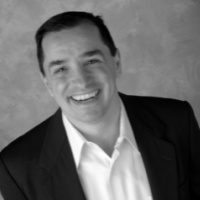
Ray Attiyah is an entrepreneur, innovator, teacher author, and speaker. At just 26, he founded his first business, Definity Partners, a hands-on, business-training firm that integrates process redesign and leadership-behavior modeling. Since then, Ray has started, acquired, or invested in many companies, including starting a manufacturing company, Upside Innovations, which — despite being launched during the recession — has experienced double-digit growth every year since 2009. Upside began as an experiment and proof-of-concept of the Run Improve Grow system, and Ray is immensely proud of the bold leadership and culture fueling that growth. At each point in his career, Ray has focused on the transformation of people. He believes deeply that a leader’s primary responsibility is to create an inspiring culture where everyone — from the front-line workers to the CEO — can grow into their full potential. Ray has helped hundreds of organizations, from small start-ups to Fortune 50 companies, with a vision of engineering the perfect growth, improvement, and talent system. His tested roadmap for bold business and personal growth is outlined in his book, “Run Improve Grow.” Ray received his Bachelor of Science in Industrial Engineering from Rutgers University and an MBA from Xavier University. In addition to serial entrepreneurship, he has been an Industrial Engineer, Director of Operations, Chief Innovation Officer, and can occasionally be seen on ESPN competing in the World Series of Poker. When Ray isn’t busy inspiring fearless leaders, he can be found in Cincinnati, Ohio, where he lives with his wife, three daughters, and a remarkably well-behaved Golden Retriever named Chloe. Connect with Ray on LinkedIn.
